The How and Why of OpenAPI Rob Allen Web Summer Camp, July 2024
Slide 1

Slide 2

APIs Power the Internet Rob Allen ~ @akrabat
Slide 3

APIs Power the Internet API Descriptions Power APIs Rob Allen ~ @akrabat
Slide 4

The OpenAPI Specification (OAS) defines a standard, programming language-agnostic interface description for HTTP APIs, which allows both humans and computers to discover and understand the capabilities of a service https://spec.openapis.org/oas/latest.html Rob Allen ~ @akrabat
Slide 5

It’s about documentation Rob Allen ~ @akrabat
Slide 6
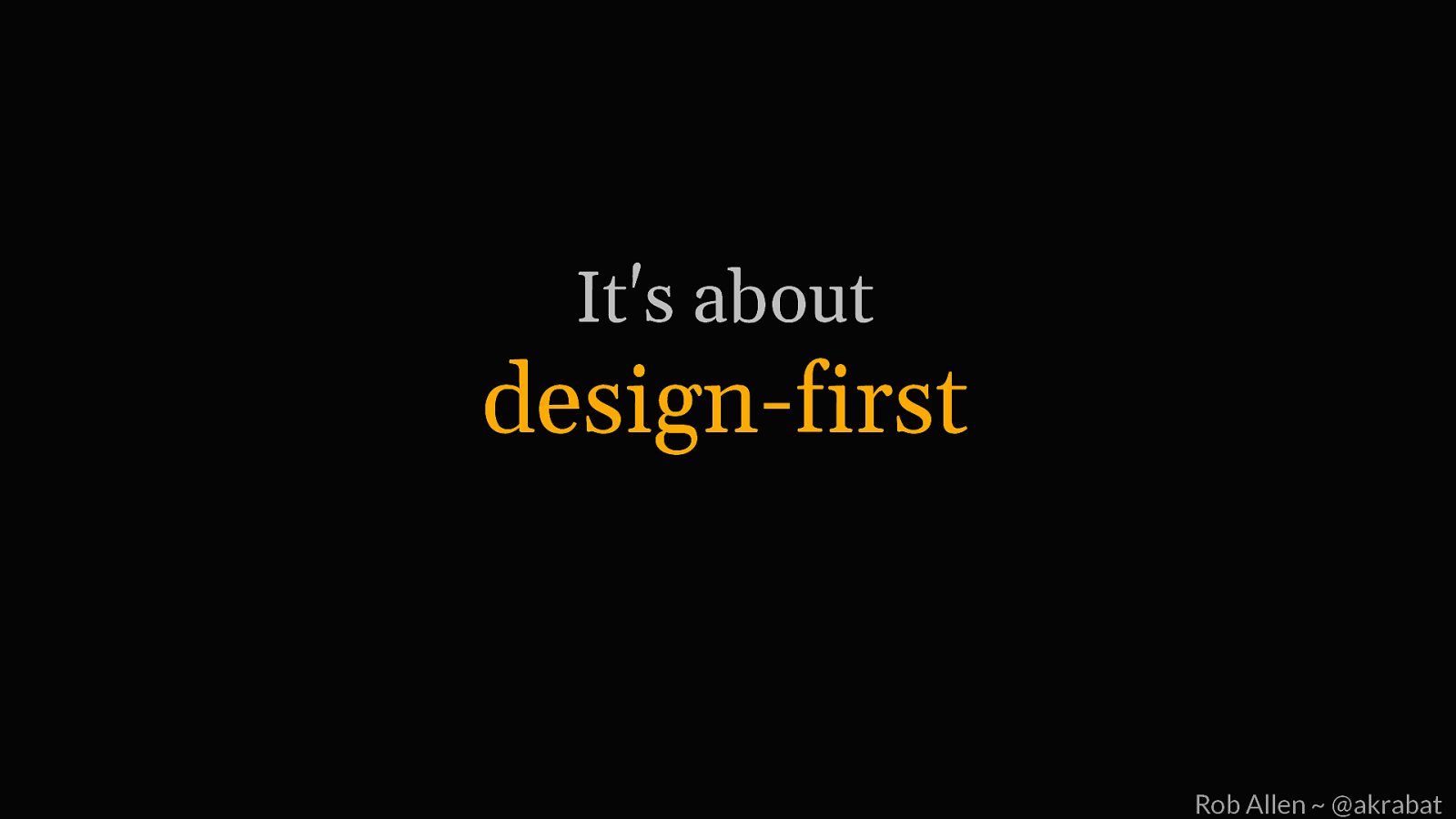
It’s about design-first Rob Allen ~ @akrabat
Slide 7
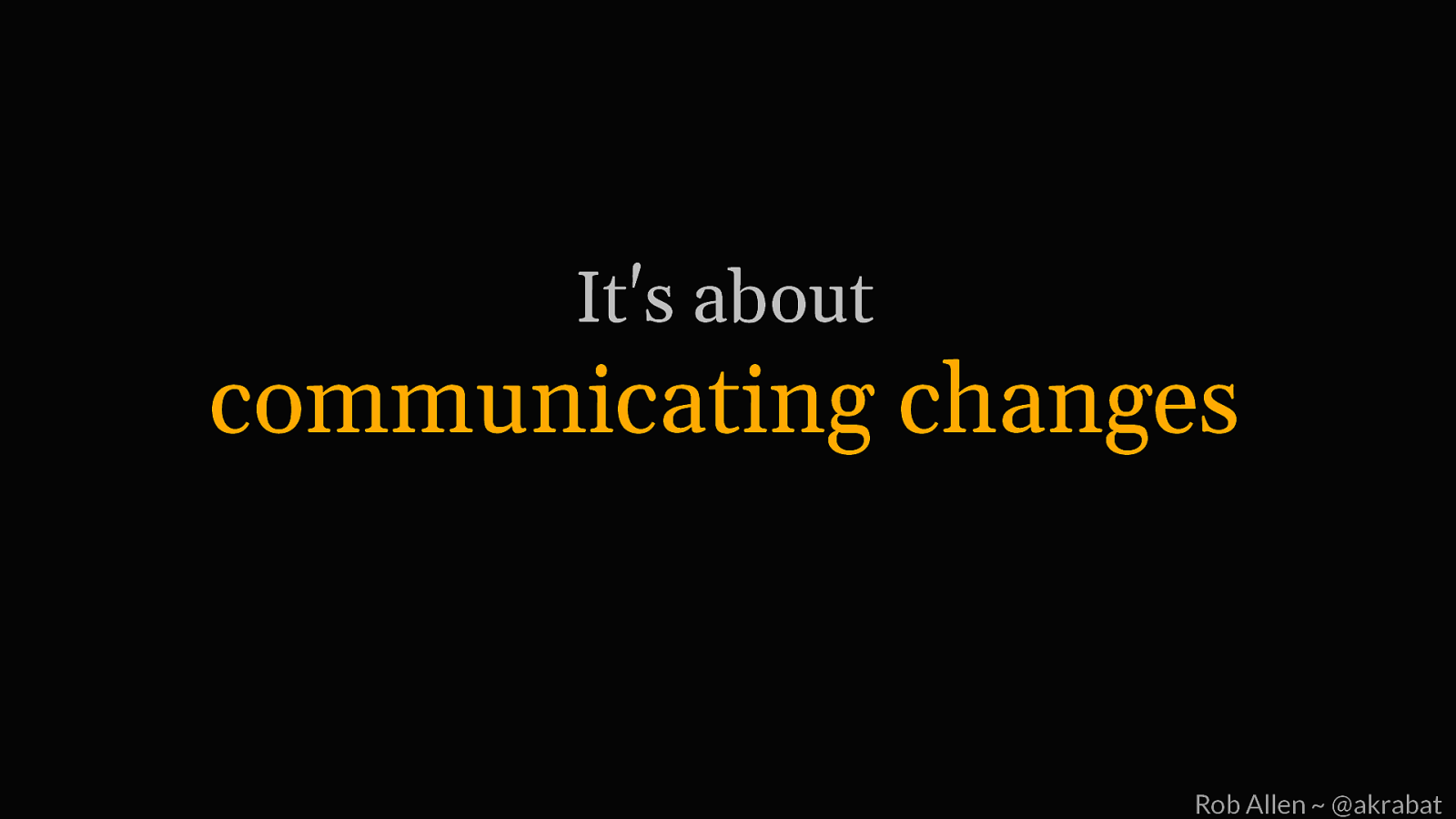
It’s about communicating changes Rob Allen ~ @akrabat
Slide 8
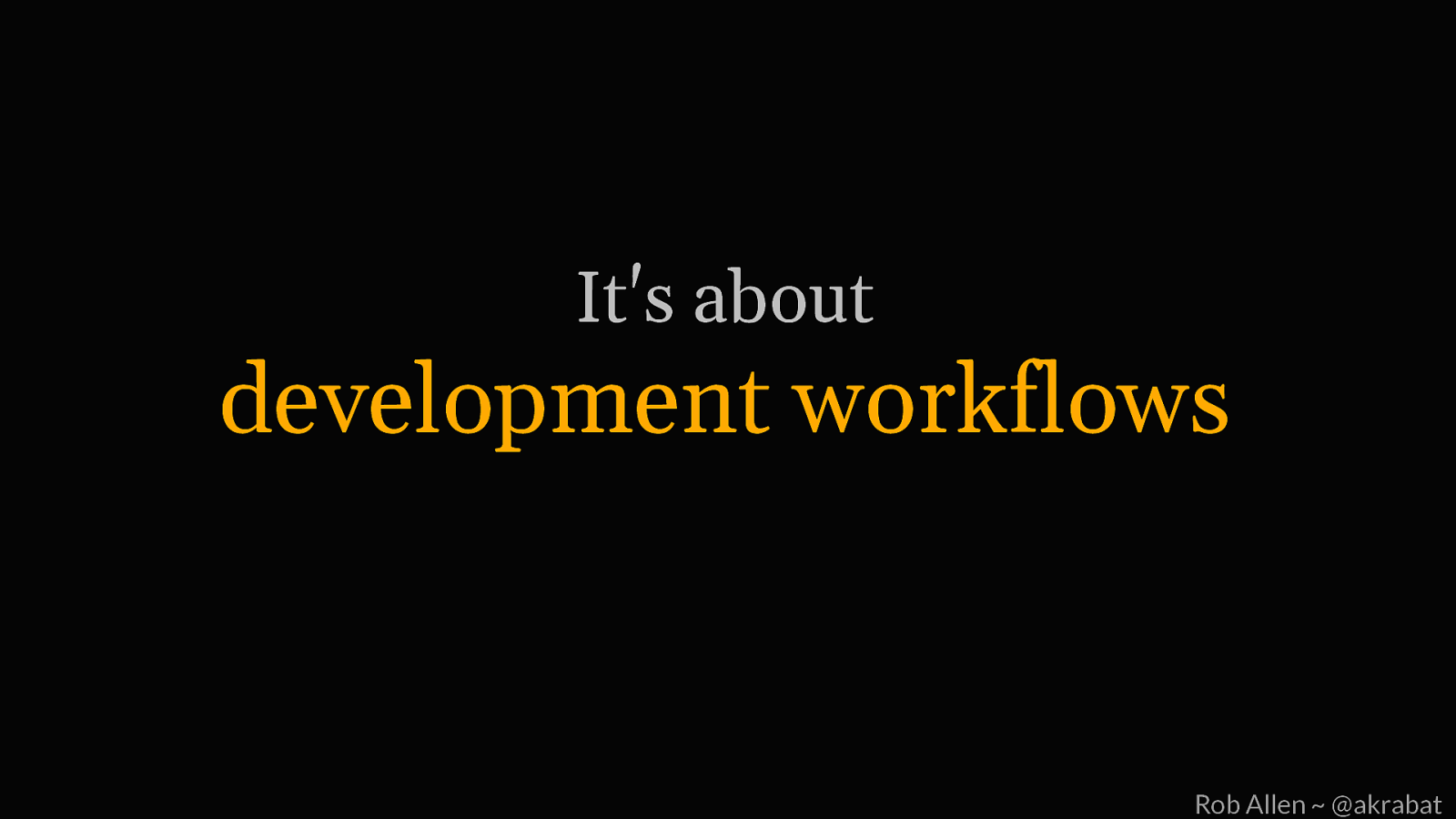
It’s about development workflows Rob Allen ~ @akrabat
Slide 9
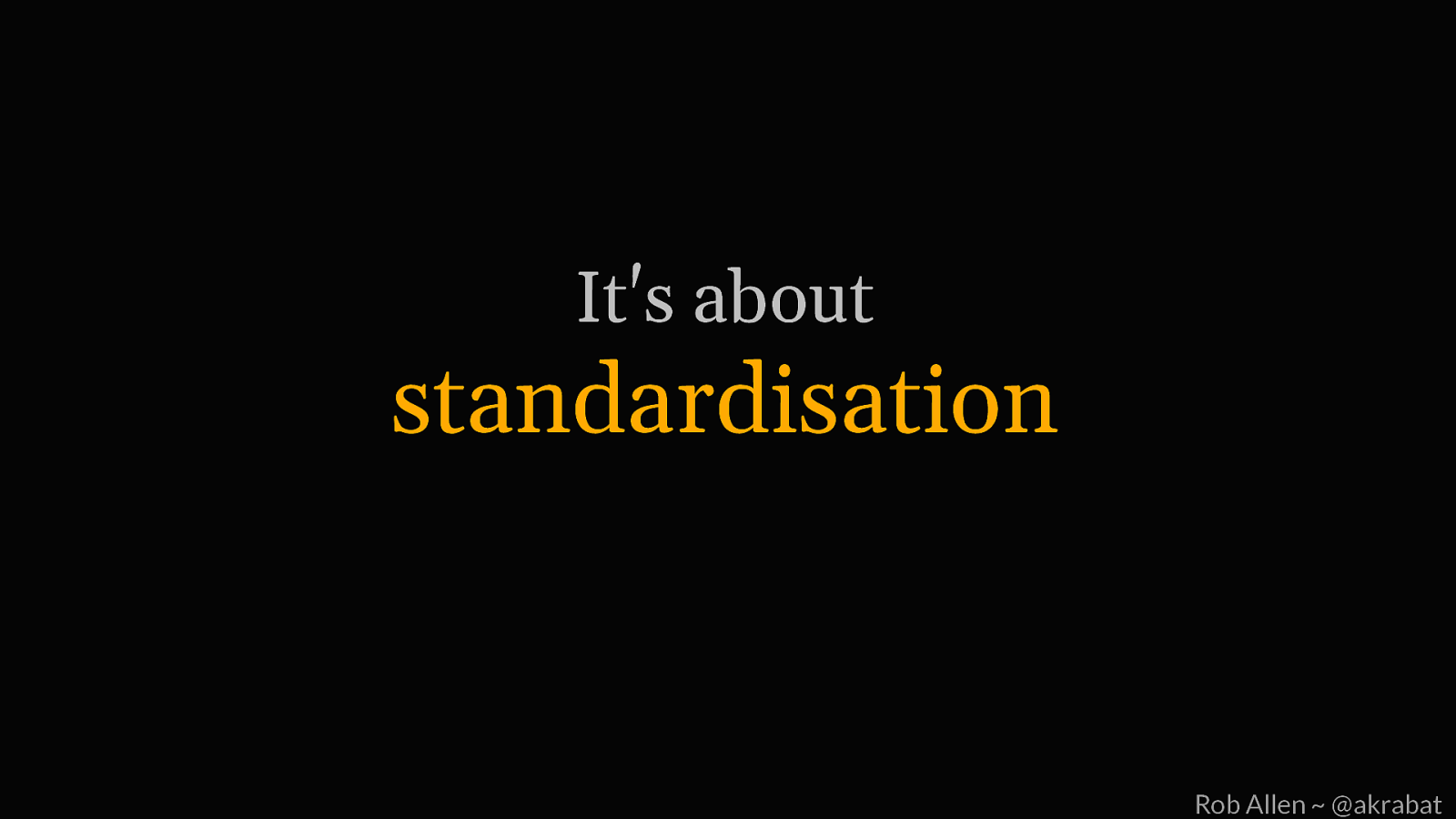
It’s about standardisation Rob Allen ~ @akrabat
Slide 10
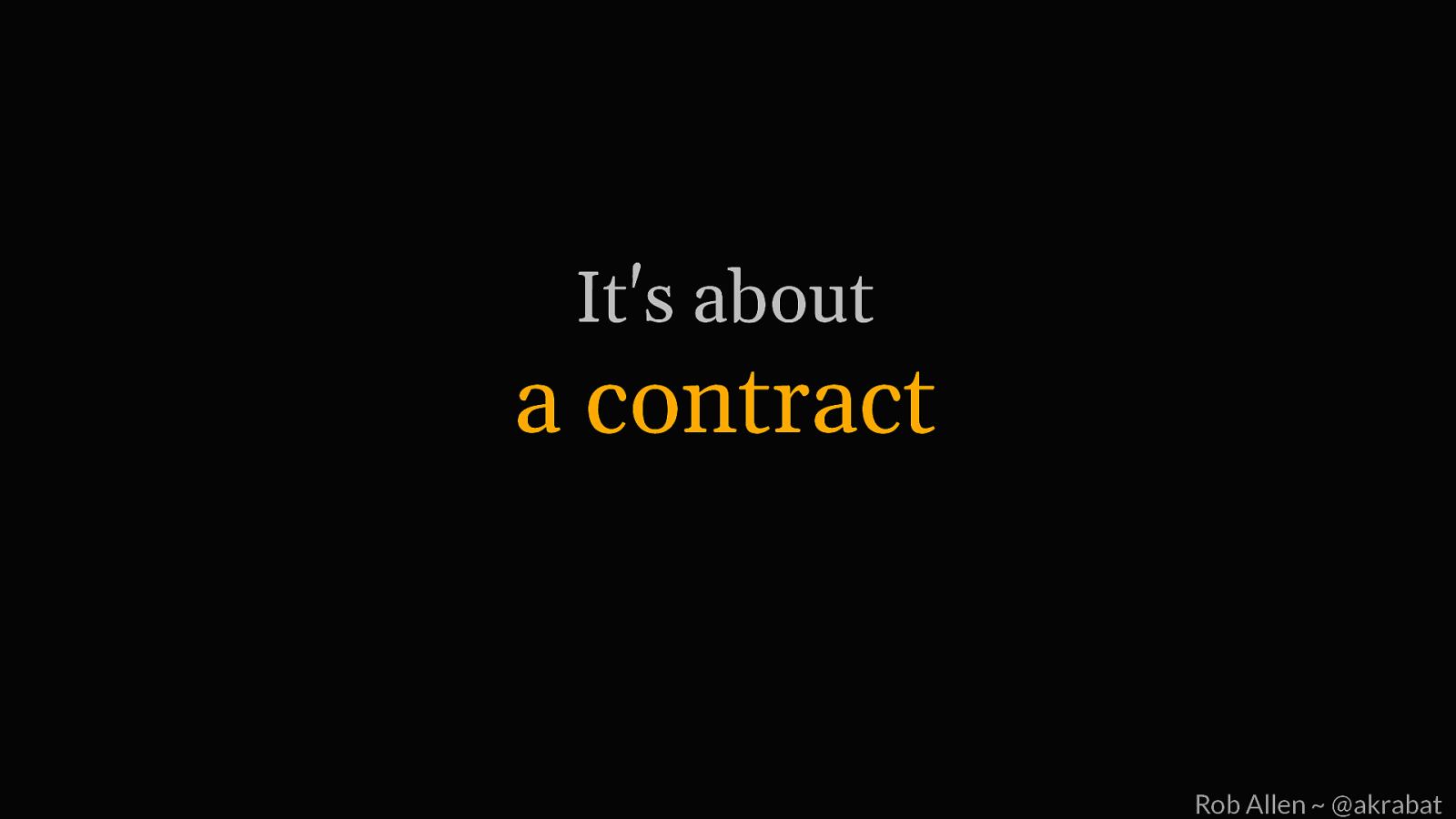
It’s about a contract Rob Allen ~ @akrabat
Slide 11

“Using a consistent API description will help increase adoption of APIs across government by reducing time spent in understanding different APIs. gov.uk Rob Allen ~ @akrabat
Slide 12

Anatomy of the specification Rob Allen ~ @akrabat
Slide 13
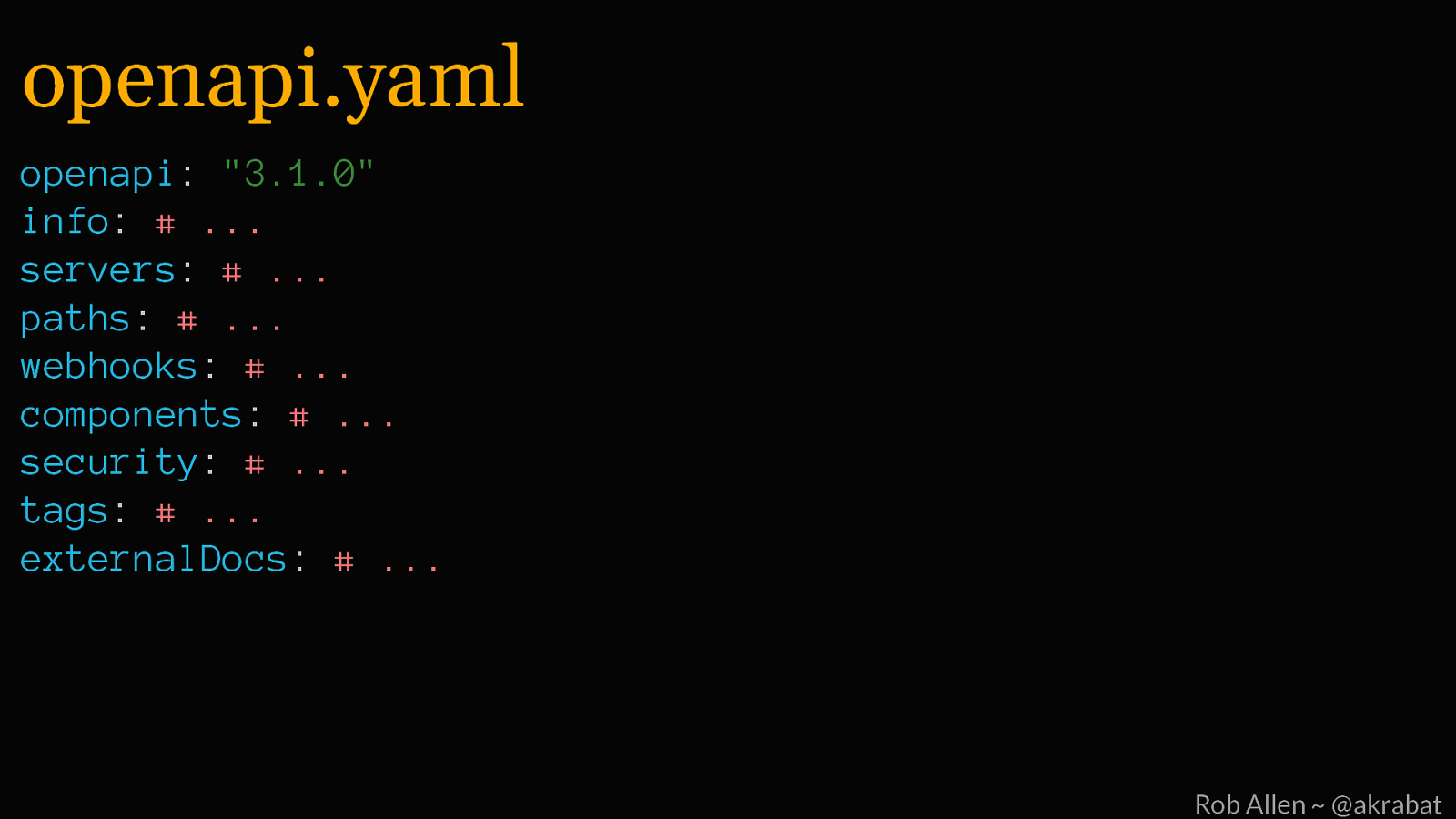
openapi.yaml openapi: “3.1.0” info: # … servers: # … paths: # … webhooks: # … components: # … security: # … tags: # … externalDocs: # … Rob Allen ~ @akrabat
Slide 14
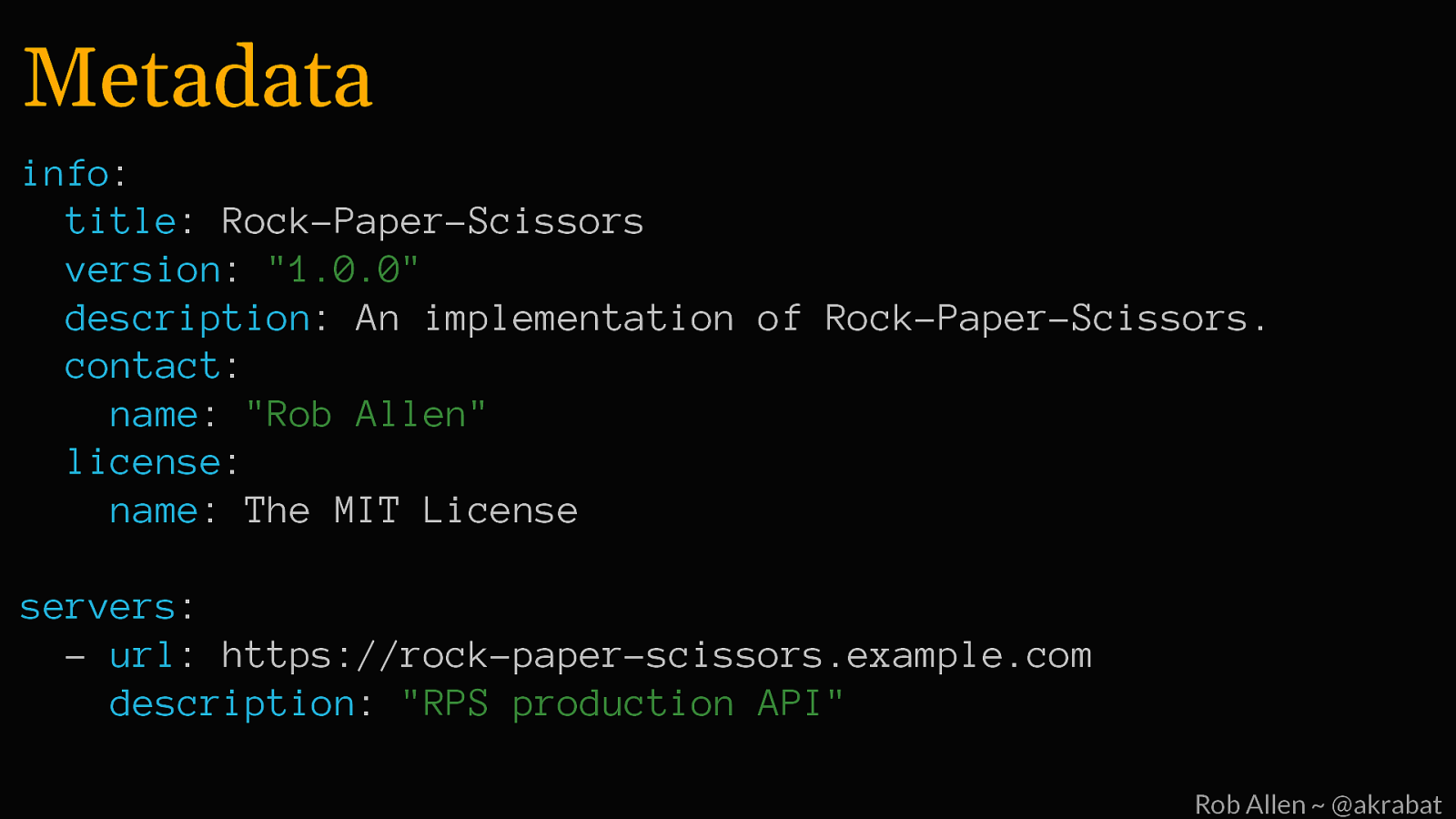
Metadata info: title: Rock-Paper-Scissors version: “1.0.0” description: An implementation of Rock-Paper-Scissors. contact: name: “Rob Allen” license: name: The MIT License servers: - url: https://rock-paper-scissors.example.com description: “RPS production API” Rob Allen ~ @akrabat
Slide 15

Endpoints paths: ‘/games’: get: # … post: # … ‘/games/{game_id}/moves’: post: # … ‘/games/{game_id}/judgement’: get: # … Rob Allen ~ @akrabat
Slide 16
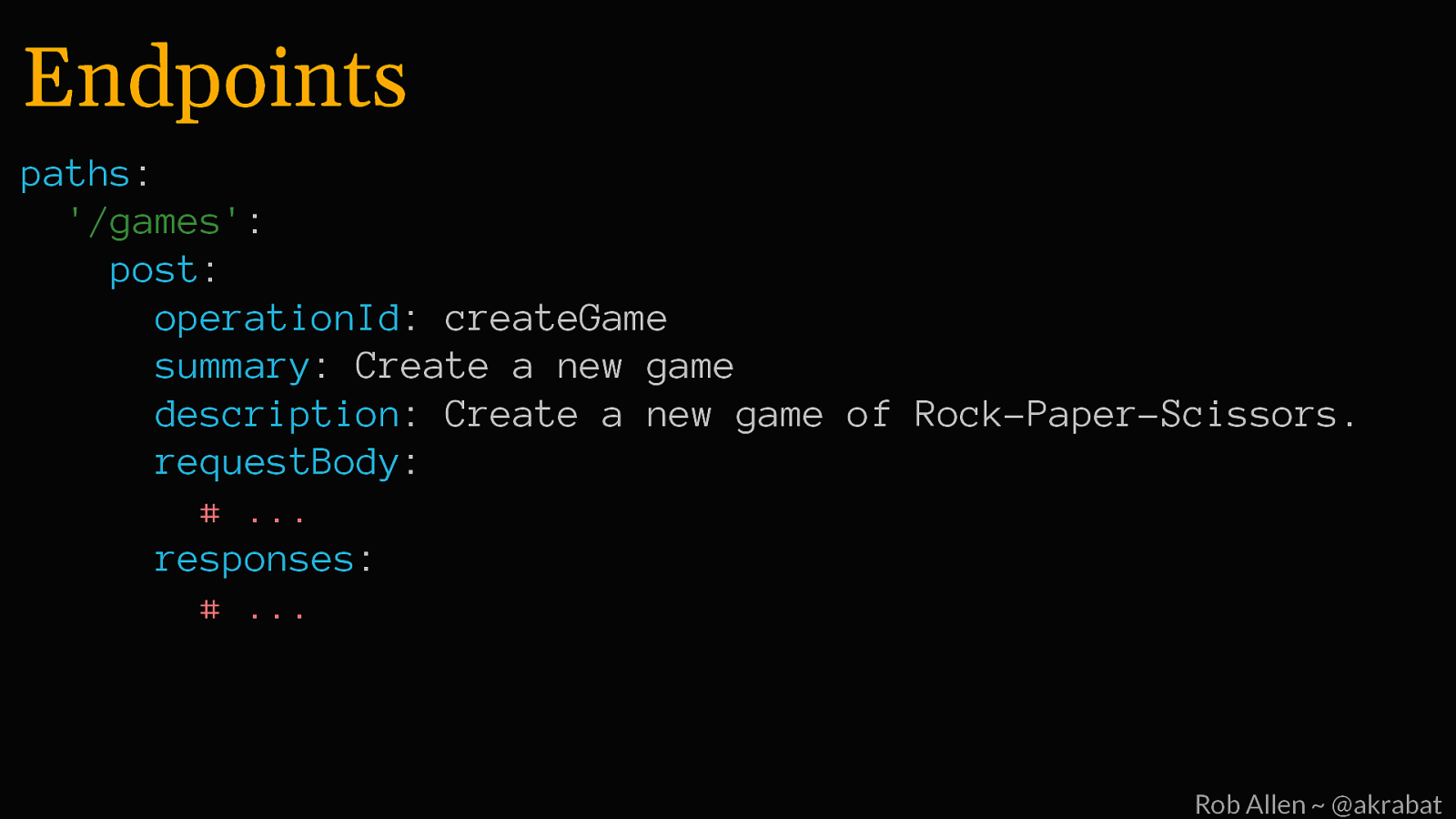
Endpoints paths: ‘/games’: post: operationId: createGame summary: Create a new game description: Create a new game of Rock-Paper-Scissors. requestBody: # … responses: # … Rob Allen ~ @akrabat
Slide 17
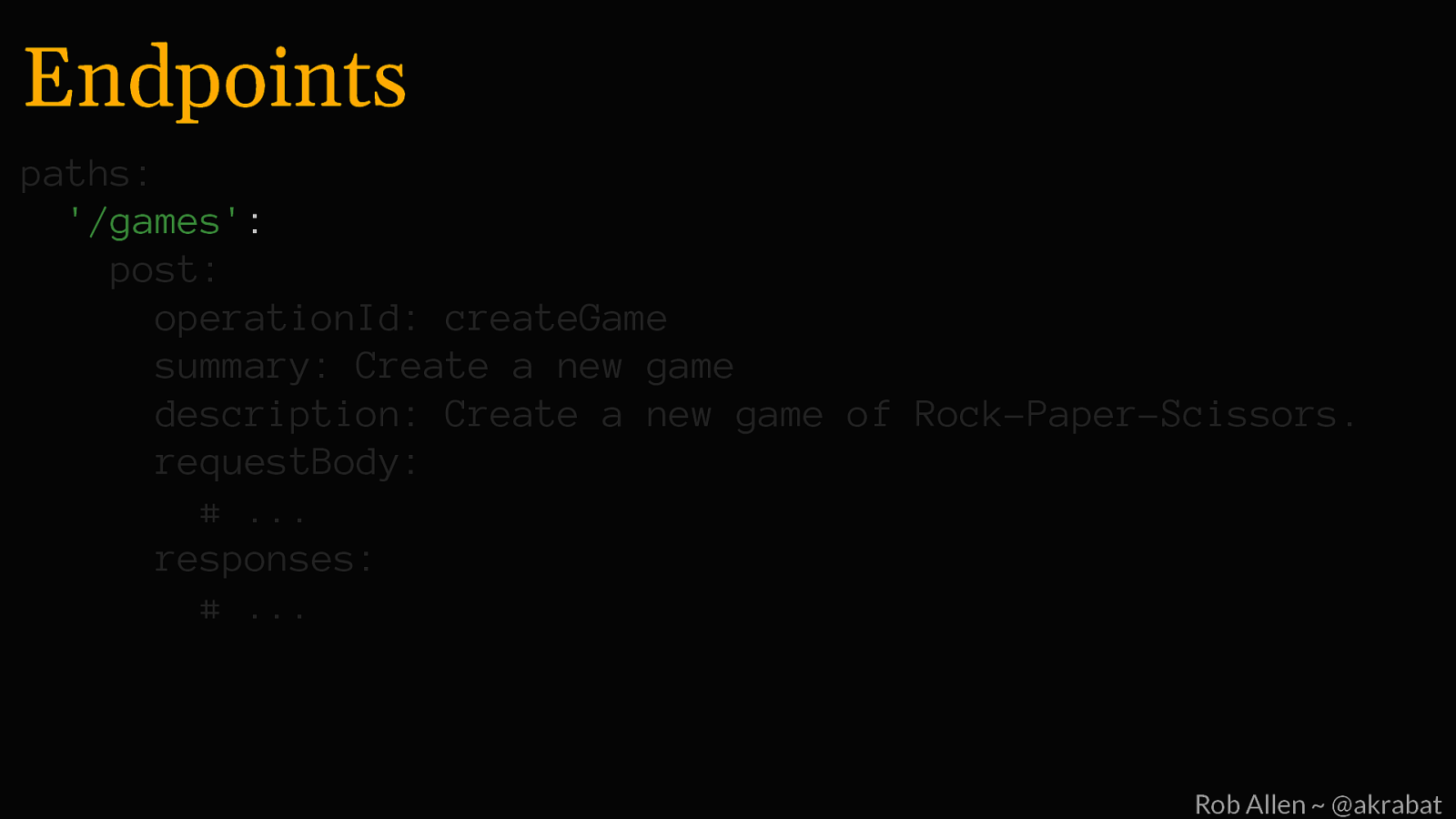
Endpoints paths: ‘/games’: post: operationId: createGame summary: Create a new game description: Create a new game of Rock-Paper-Scissors. requestBody: # … responses: # … Rob Allen ~ @akrabat
Slide 18
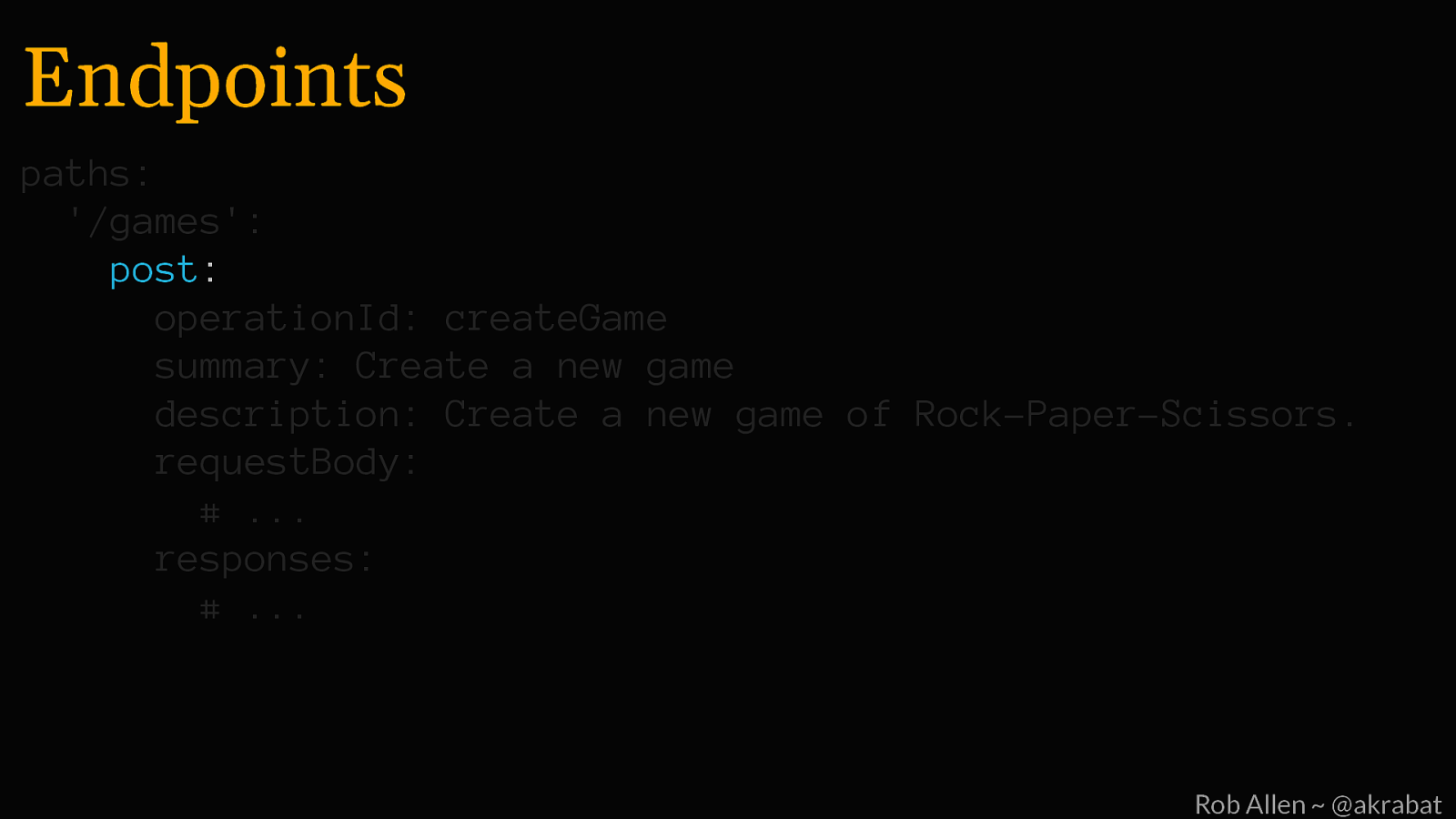
Endpoints paths: ‘/games’: post: operationId: createGame summary: Create a new game description: Create a new game of Rock-Paper-Scissors. requestBody: # … responses: # … Rob Allen ~ @akrabat
Slide 19
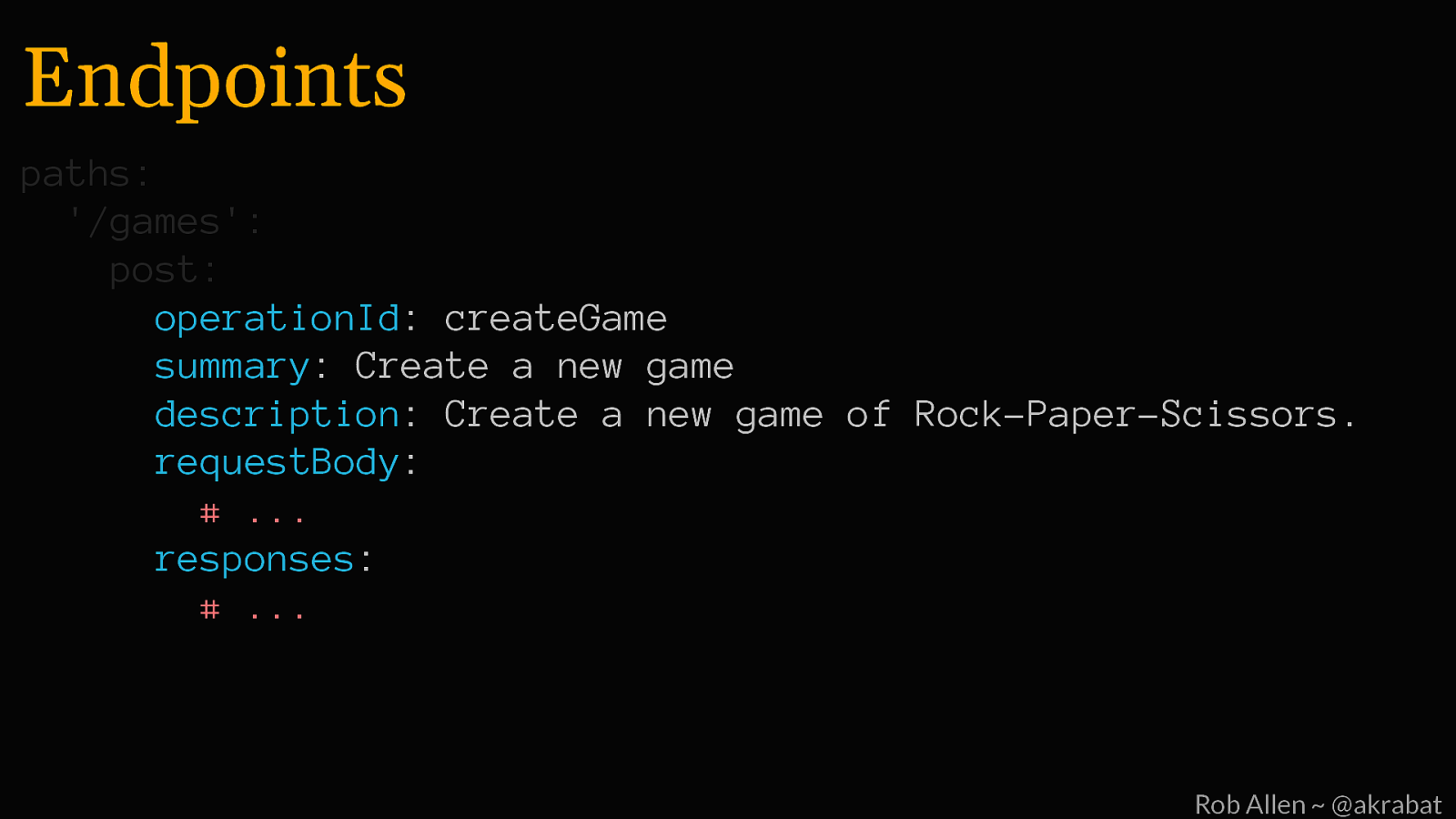
Endpoints paths: ‘/games’: post: operationId: createGame summary: Create a new game description: Create a new game of Rock-Paper-Scissors. requestBody: # … responses: # … Rob Allen ~ @akrabat
Slide 20
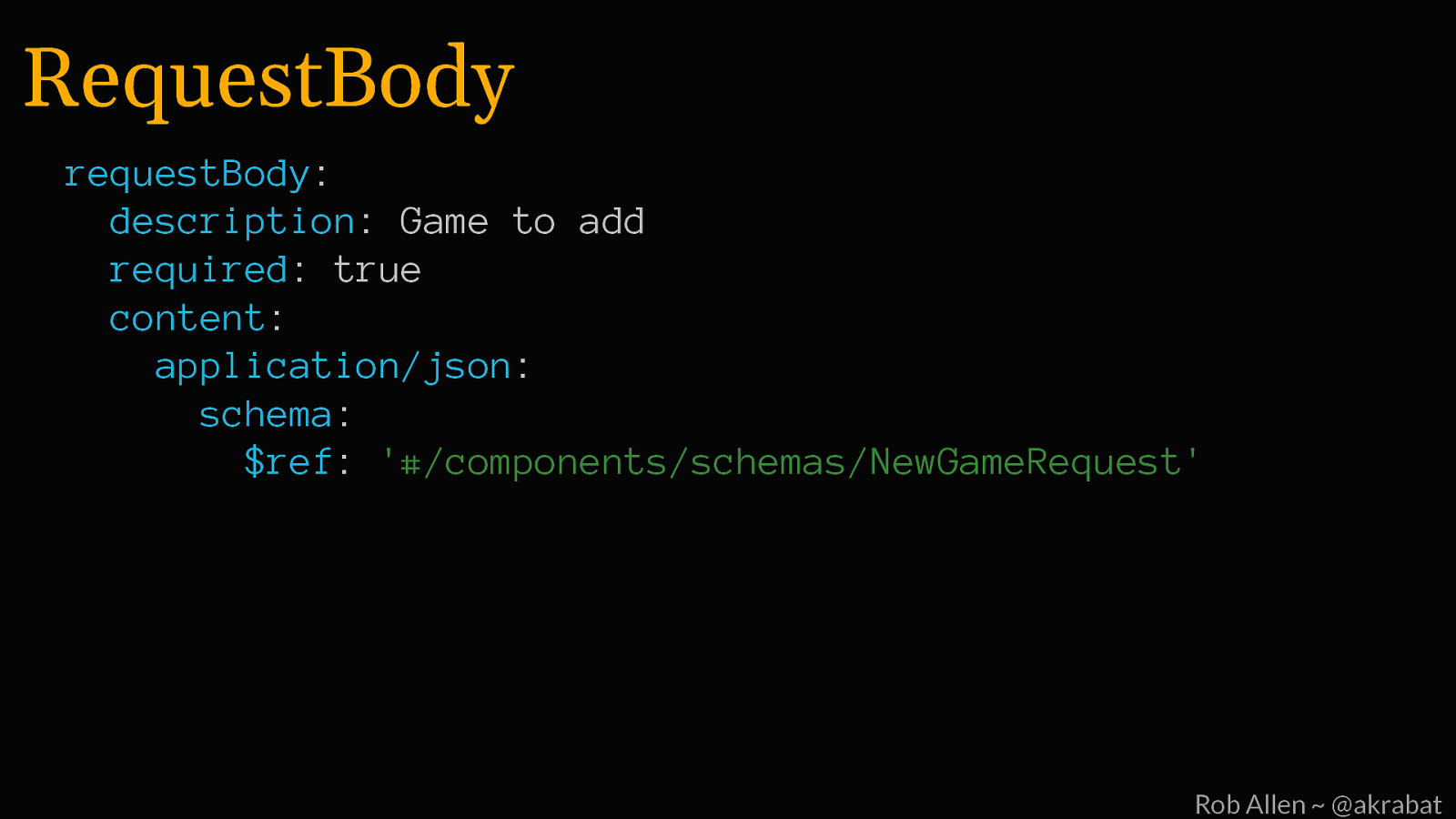
RequestBody requestBody: description: Game to add required: true content: application/json: schema: $ref: ‘#/components/schemas/NewGameRequest’ Rob Allen ~ @akrabat
Slide 21
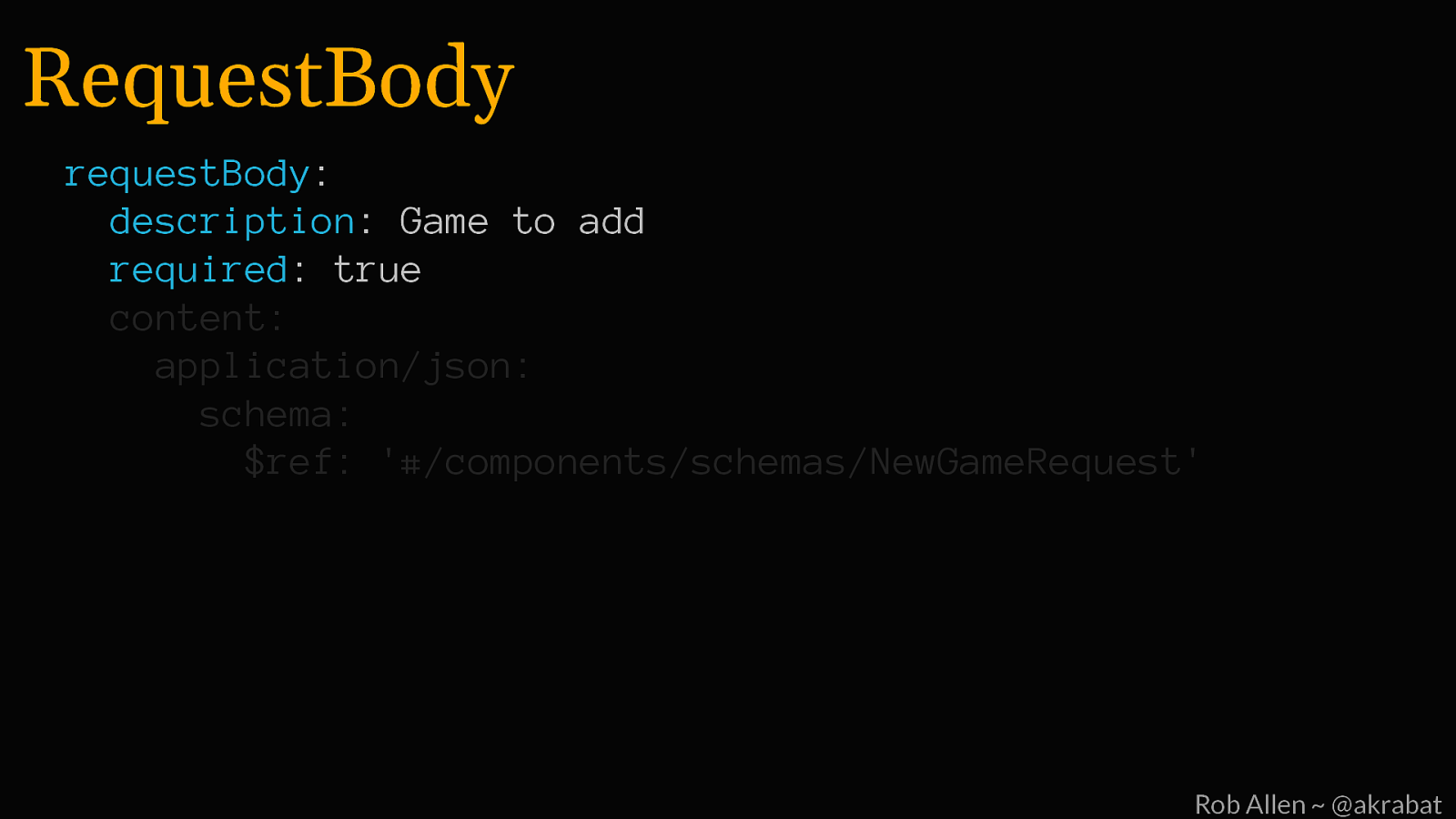
RequestBody requestBody: description: Game to add required: true content: application/json: schema: $ref: ‘#/components/schemas/NewGameRequest’ Rob Allen ~ @akrabat
Slide 22
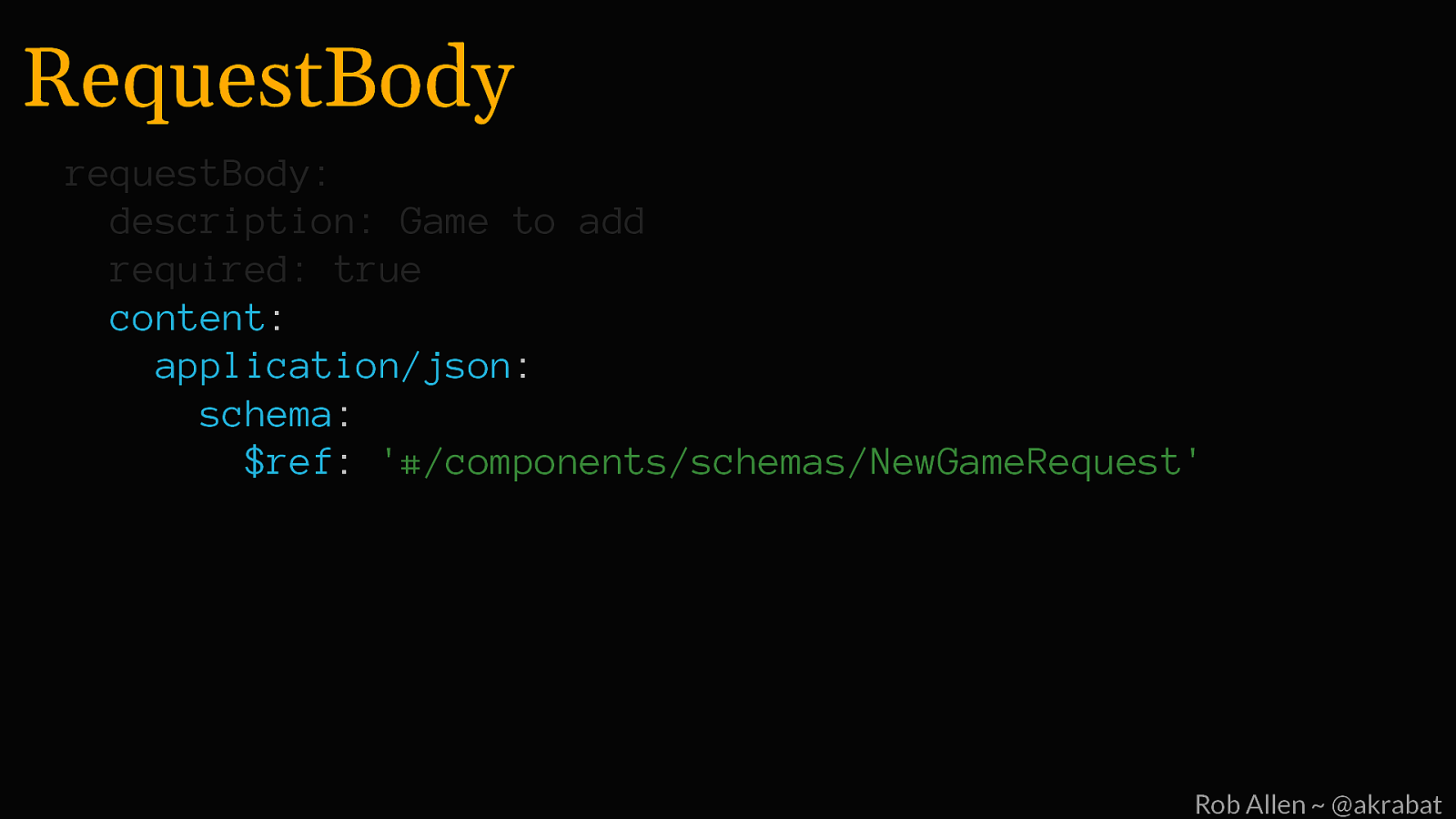
RequestBody requestBody: description: Game to add required: true content: application/json: schema: $ref: ‘#/components/schemas/NewGameRequest’ Rob Allen ~ @akrabat
Slide 23
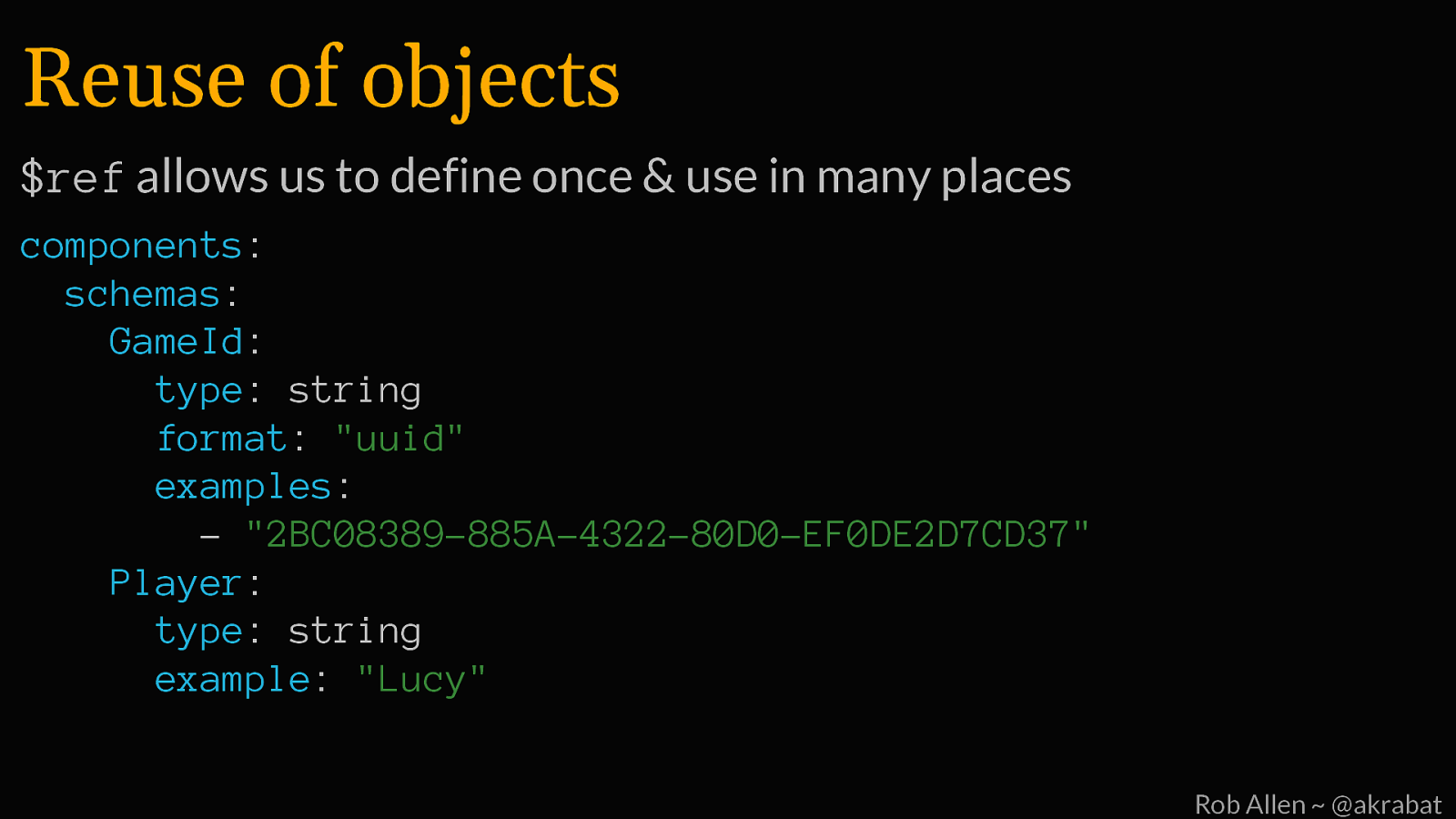
Reuse of objects $ref allows us to define once & use in many places components: schemas: GameId: type: string format: “uuid” examples: - “2BC08389-885A-4322-80D0-EF0DE2D7CD37” Player: type: string example: “Lucy” Rob Allen ~ @akrabat
Slide 24
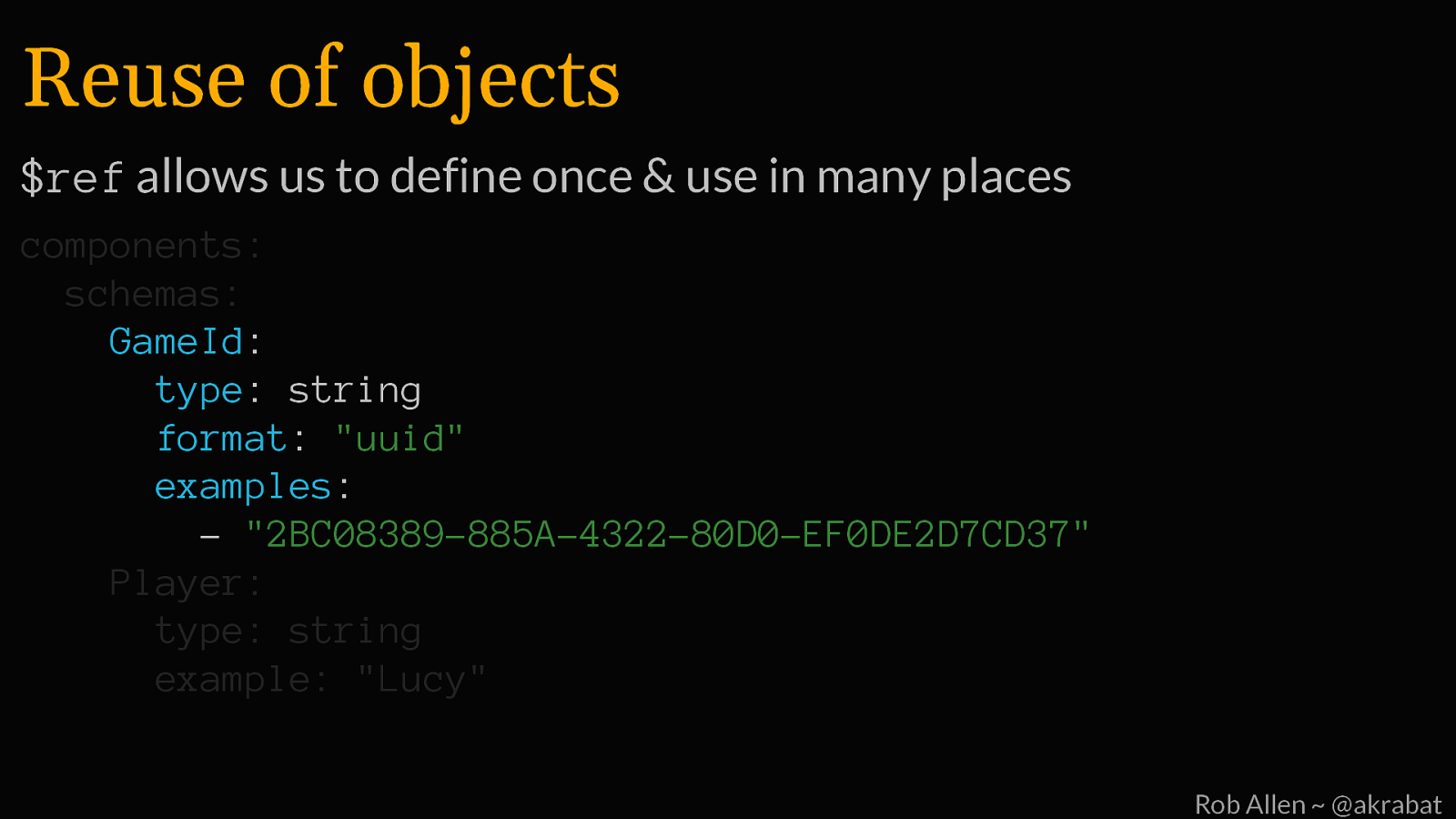
Reuse of objects $ref allows us to define once & use in many places components: schemas: GameId: type: string format: “uuid” examples: - “2BC08389-885A-4322-80D0-EF0DE2D7CD37” Player: type: string example: “Lucy” Rob Allen ~ @akrabat
Slide 25
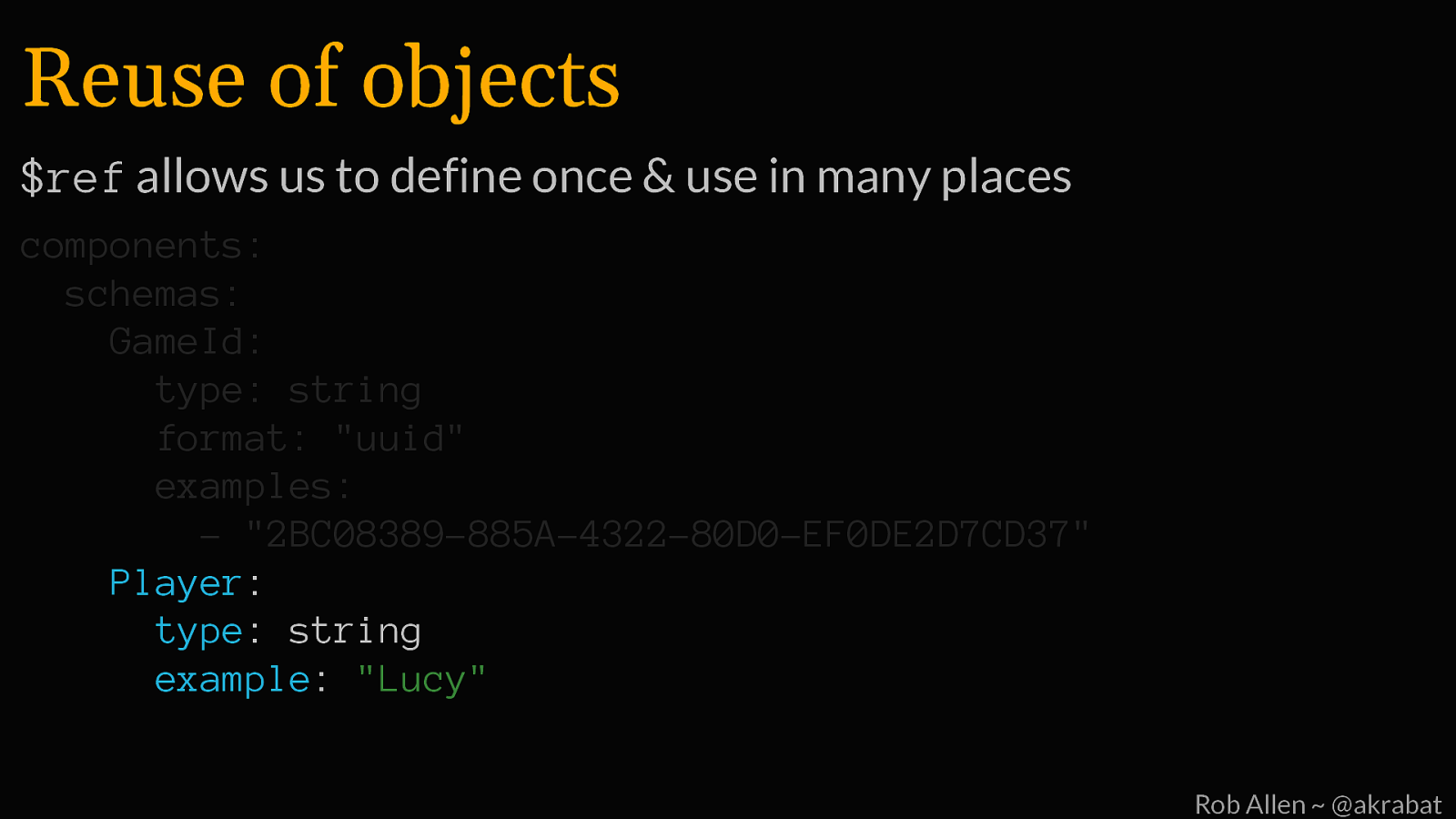
Reuse of objects $ref allows us to define once & use in many places components: schemas: GameId: type: string format: “uuid” examples: - “2BC08389-885A-4322-80D0-EF0DE2D7CD37” Player: type: string example: “Lucy” Rob Allen ~ @akrabat
Slide 26
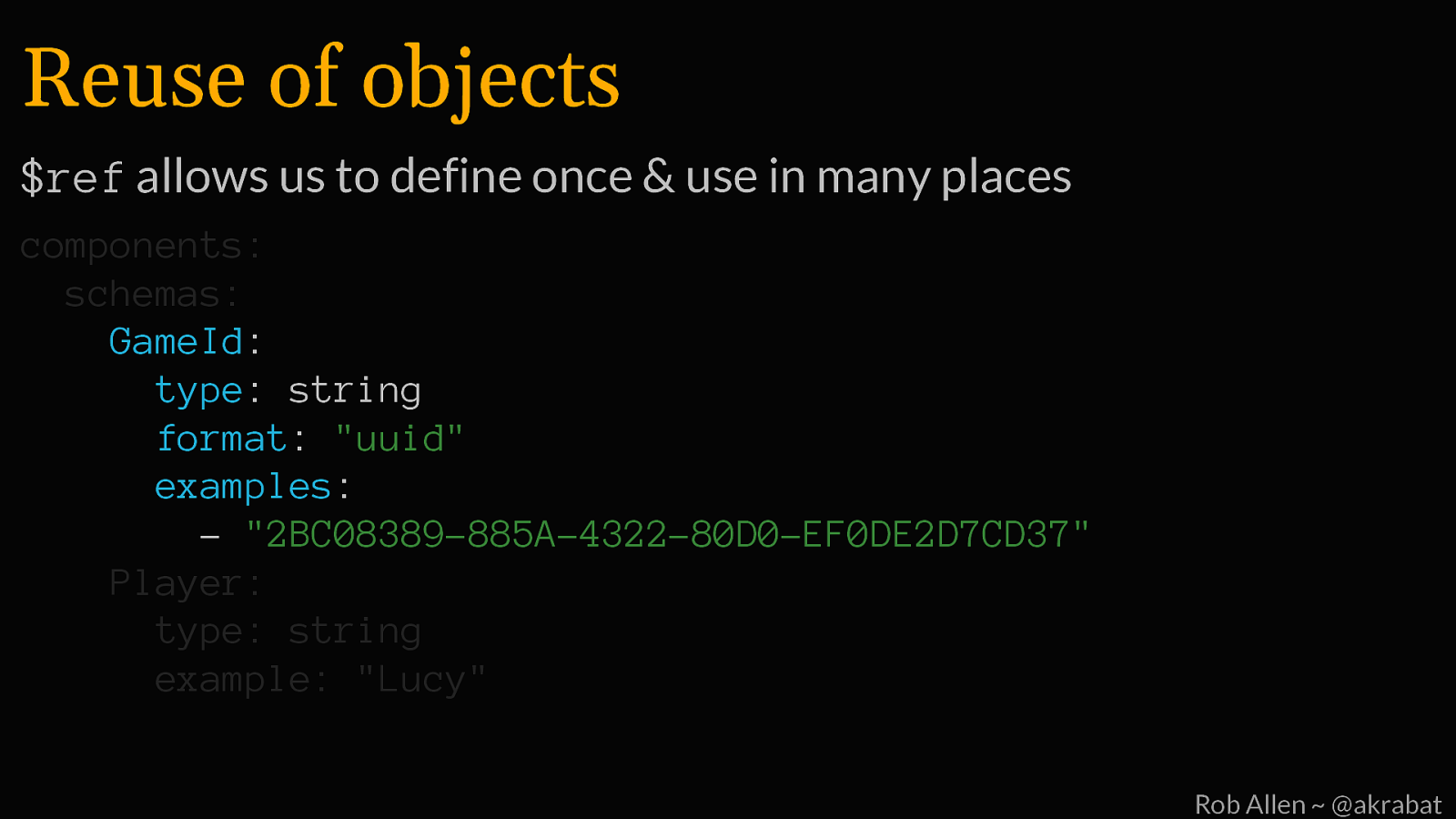
Reuse of objects $ref allows us to define once & use in many places components: schemas: GameId: type: string format: “uuid” examples: - “2BC08389-885A-4322-80D0-EF0DE2D7CD37” Player: type: string example: “Lucy” Rob Allen ~ @akrabat
Slide 27
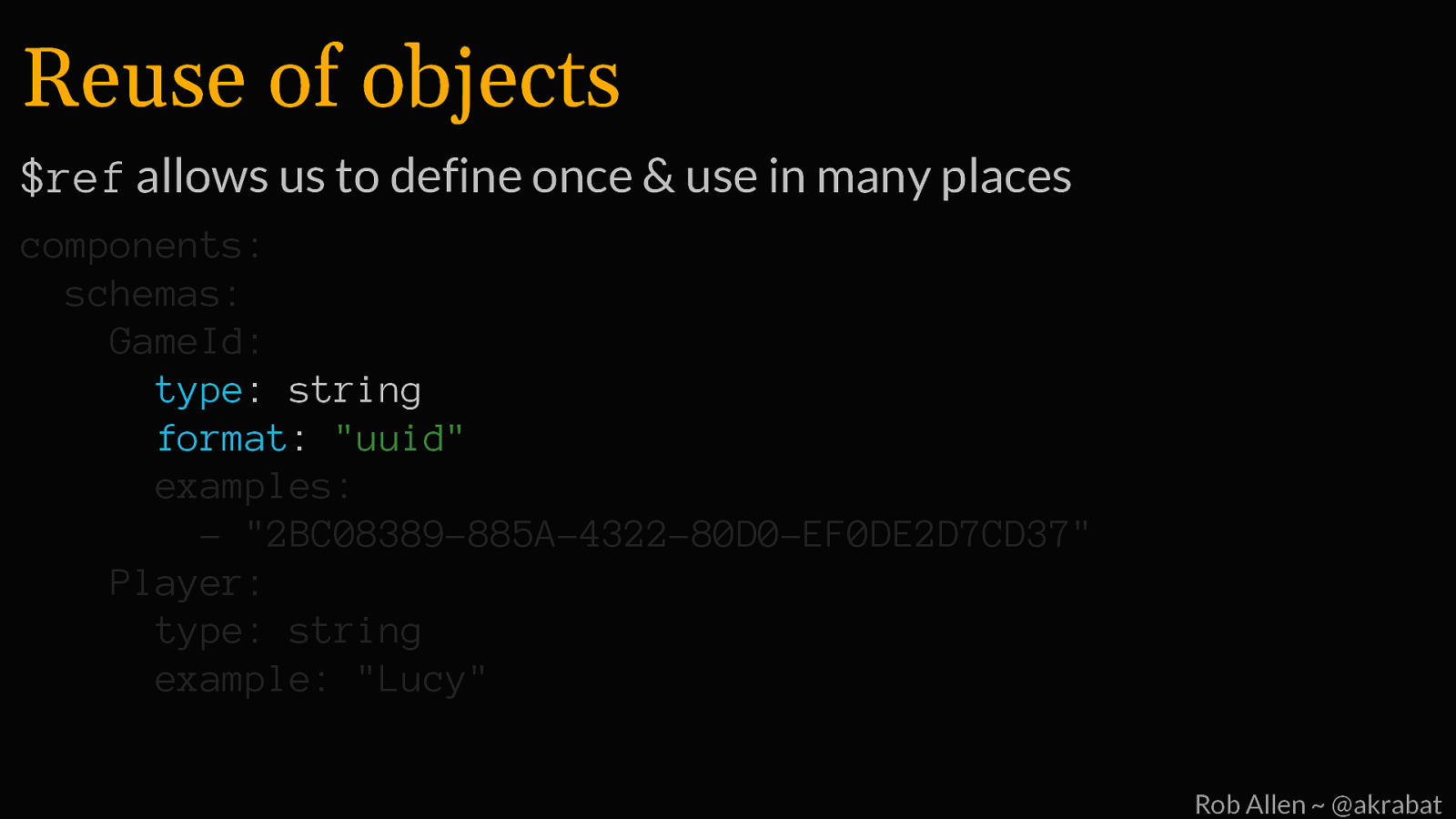
Reuse of objects $ref allows us to define once & use in many places components: schemas: GameId: type: string format: “uuid” examples: - “2BC08389-885A-4322-80D0-EF0DE2D7CD37” Player: type: string example: “Lucy” Rob Allen ~ @akrabat
Slide 28
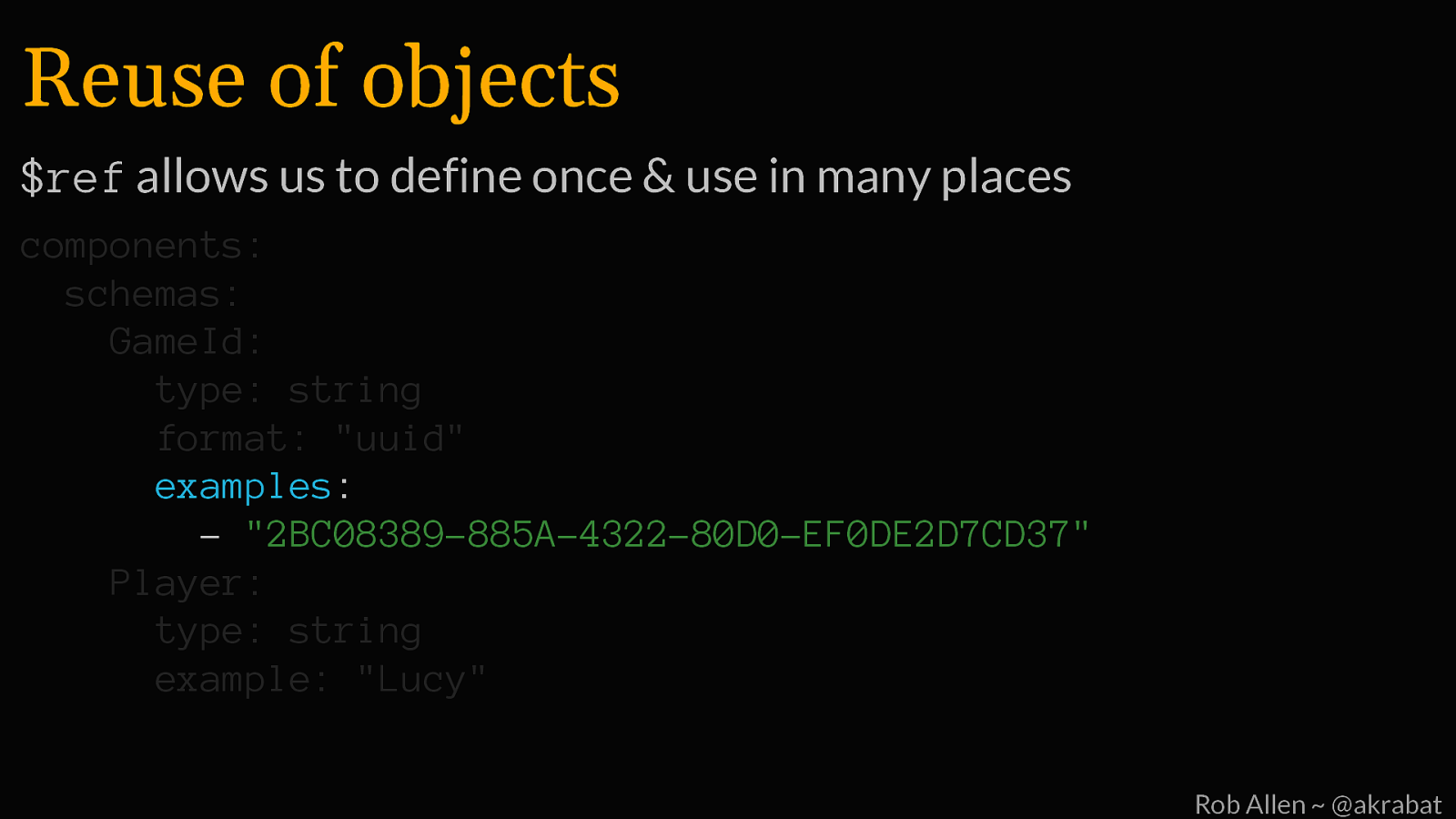
Reuse of objects $ref allows us to define once & use in many places components: schemas: GameId: type: string format: “uuid” examples: - “2BC08389-885A-4322-80D0-EF0DE2D7CD37” Player: type: string example: “Lucy” Rob Allen ~ @akrabat
Slide 29
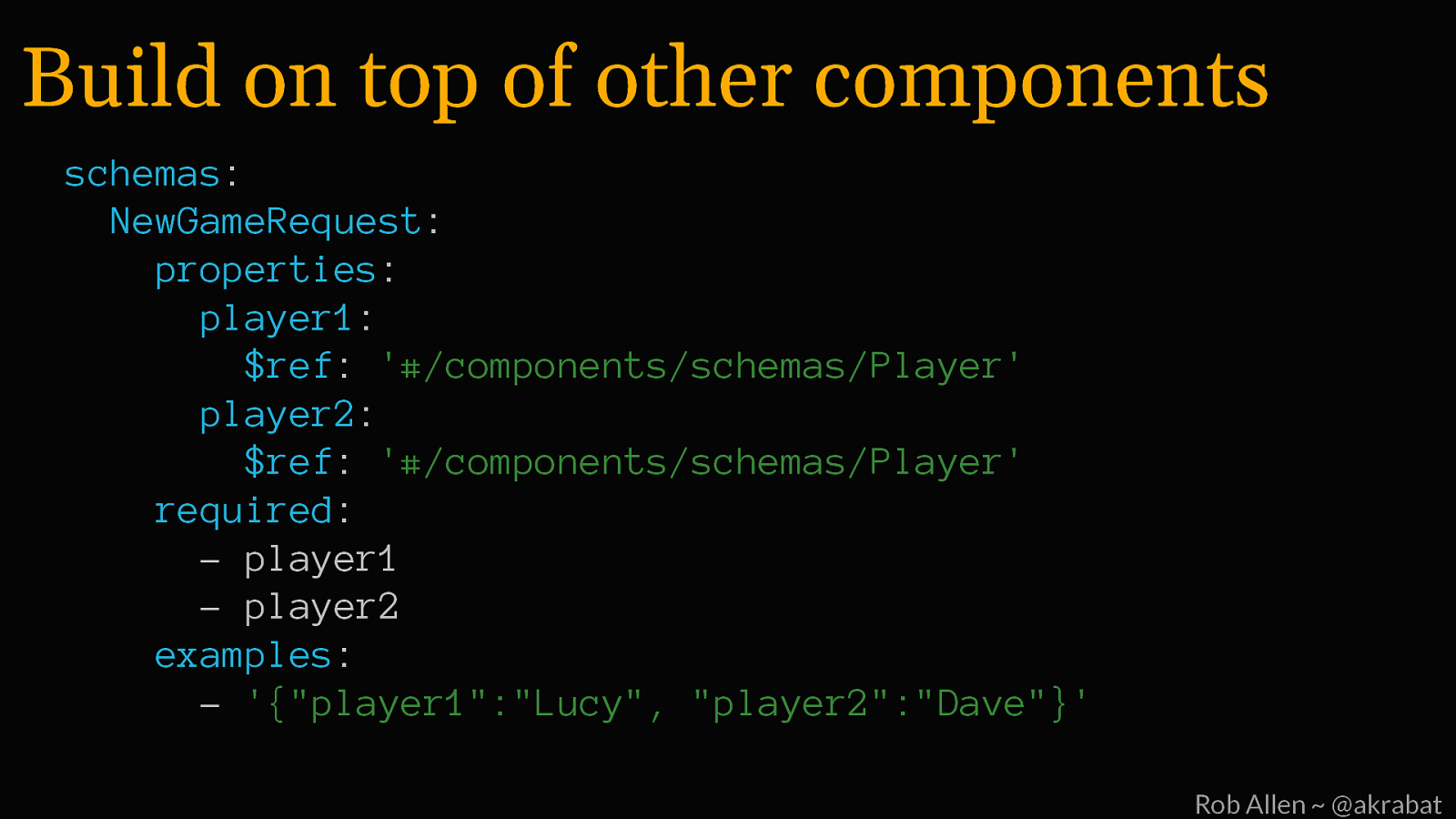
Build on top of other components schemas: NewGameRequest: properties: player1: $ref: ‘#/components/schemas/Player’ player2: $ref: ‘#/components/schemas/Player’ required: - player1 - player2 examples: - ‘{“player1”:”Lucy”, “player2”:”Dave”}’ Rob Allen ~ @akrabat
Slide 30
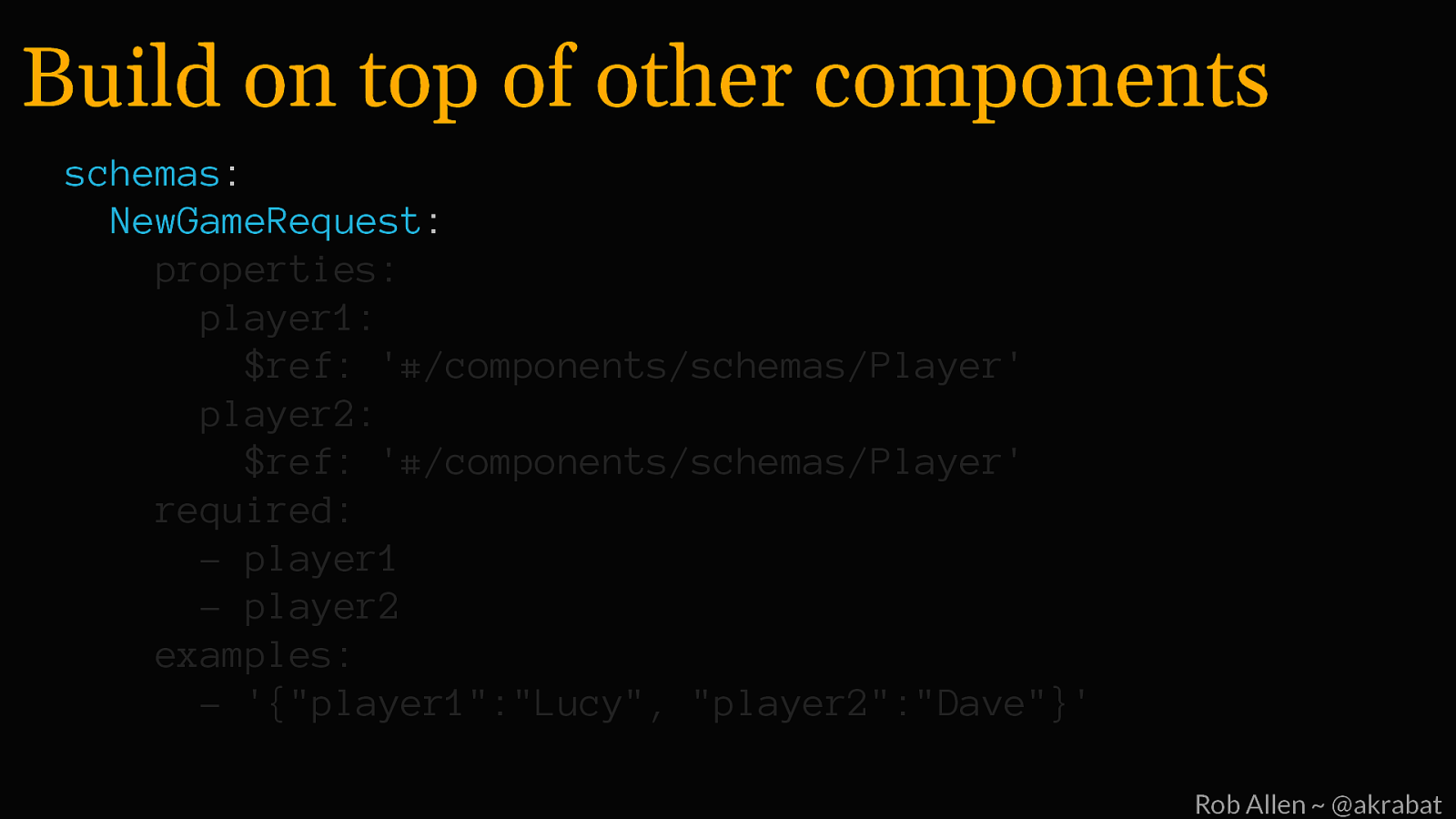
Build on top of other components schemas: NewGameRequest: properties: player1: $ref: ‘#/components/schemas/Player’ player2: $ref: ‘#/components/schemas/Player’ required: - player1 - player2 examples: - ‘{“player1”:”Lucy”, “player2”:”Dave”}’ Rob Allen ~ @akrabat
Slide 31
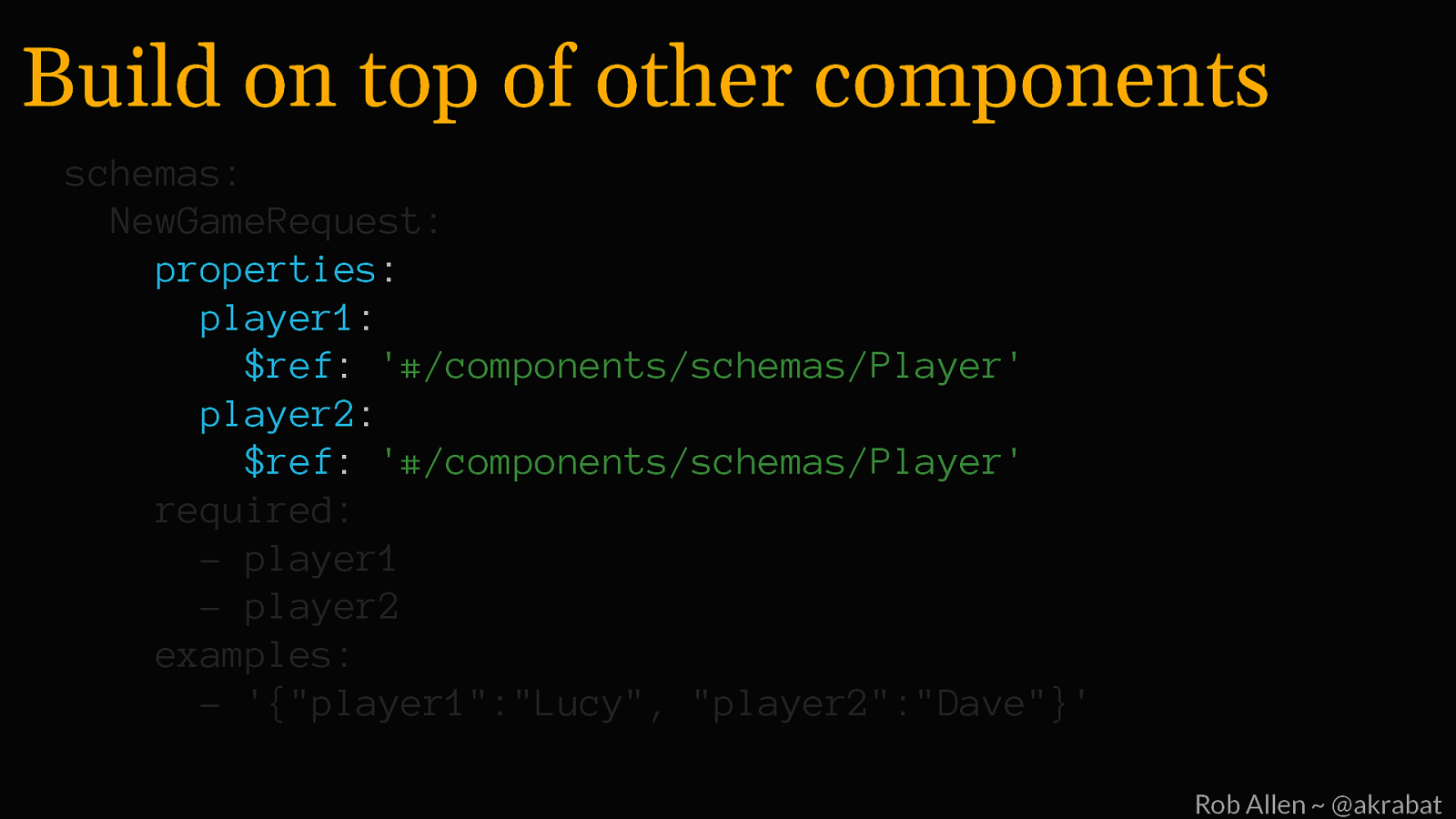
Build on top of other components schemas: NewGameRequest: properties: player1: $ref: ‘#/components/schemas/Player’ player2: $ref: ‘#/components/schemas/Player’ required: - player1 - player2 examples: - ‘{“player1”:”Lucy”, “player2”:”Dave”}’ Rob Allen ~ @akrabat
Slide 32
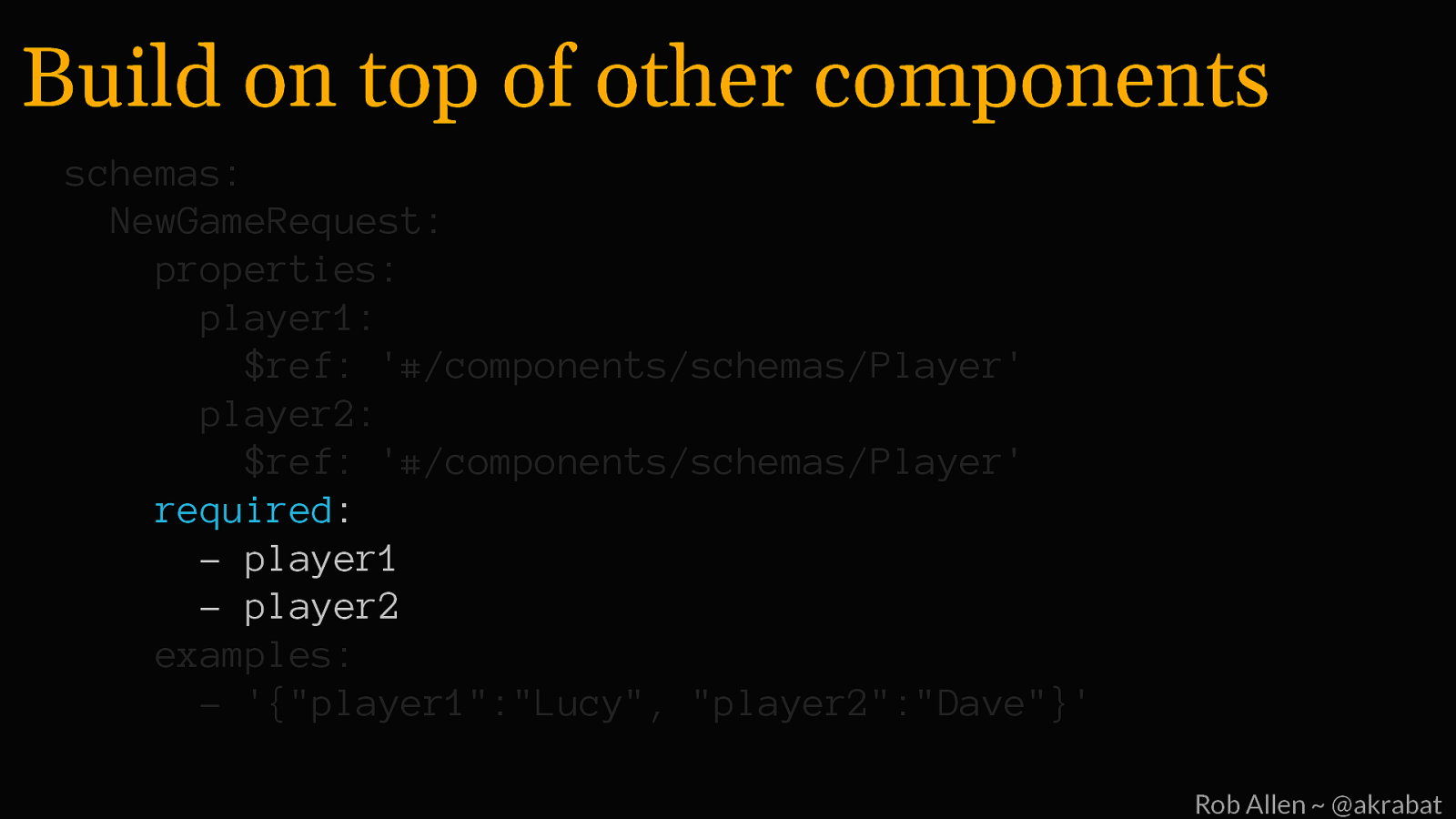
Build on top of other components schemas: NewGameRequest: properties: player1: $ref: ‘#/components/schemas/Player’ player2: $ref: ‘#/components/schemas/Player’ required: - player1 - player2 examples: - ‘{“player1”:”Lucy”, “player2”:”Dave”}’ Rob Allen ~ @akrabat
Slide 33
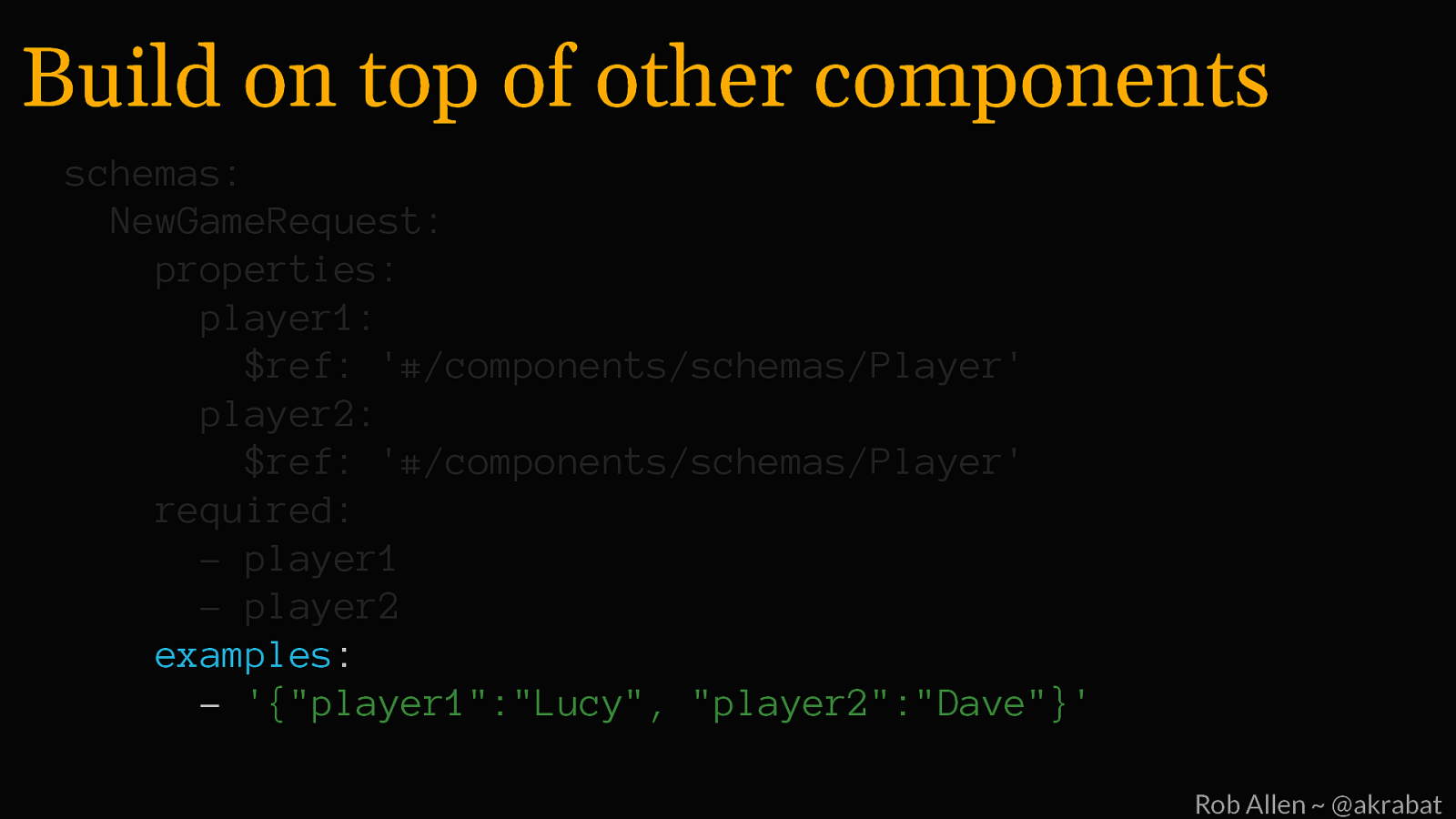
Build on top of other components schemas: NewGameRequest: properties: player1: $ref: ‘#/components/schemas/Player’ player2: $ref: ‘#/components/schemas/Player’ required: - player1 - player2 examples: - ‘{“player1”:”Lucy”, “player2”:”Dave”}’ Rob Allen ~ @akrabat
Slide 34
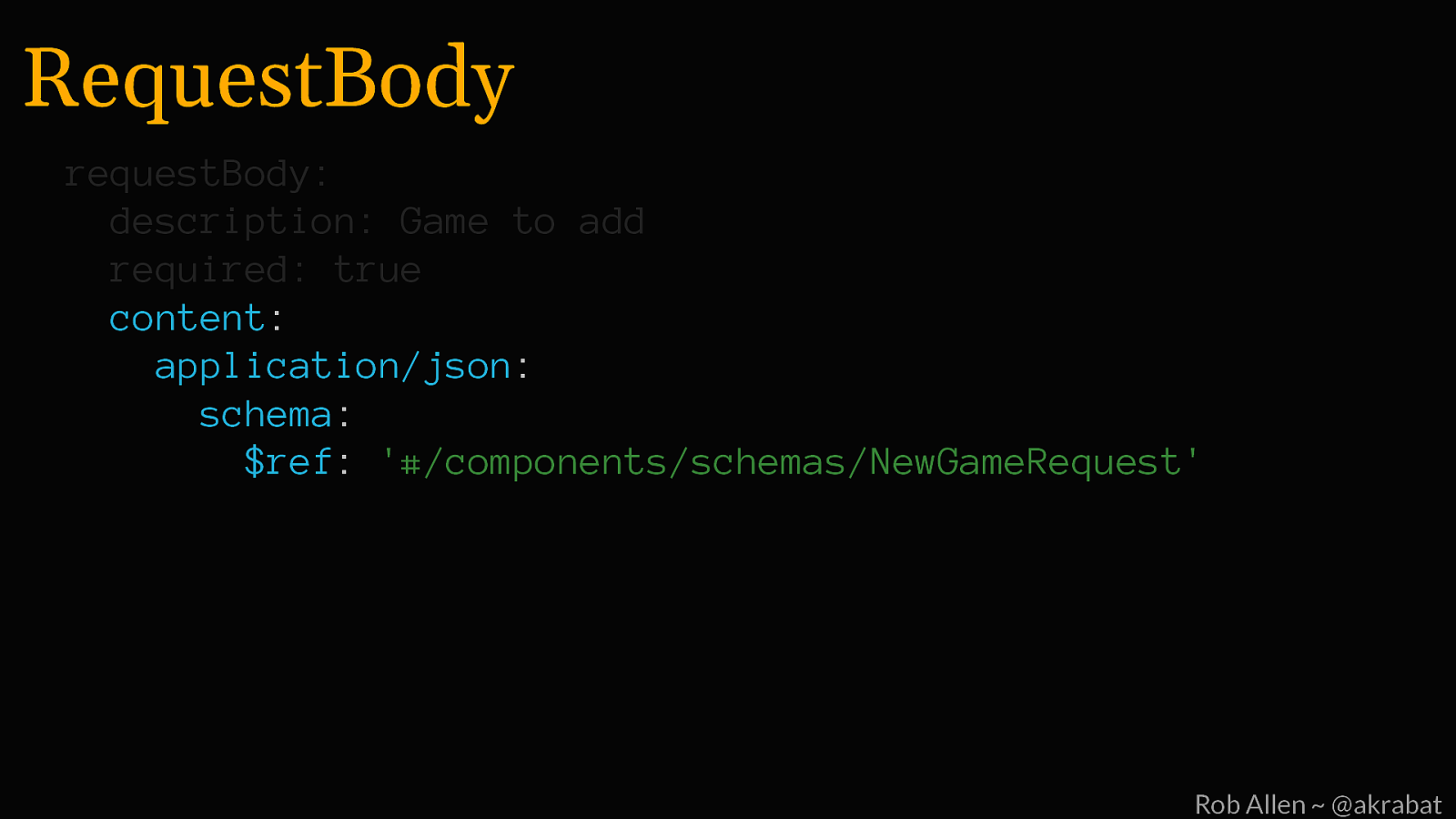
RequestBody requestBody: description: Game to add required: true content: application/json: schema: $ref: ‘#/components/schemas/NewGameRequest’ Rob Allen ~ @akrabat
Slide 35
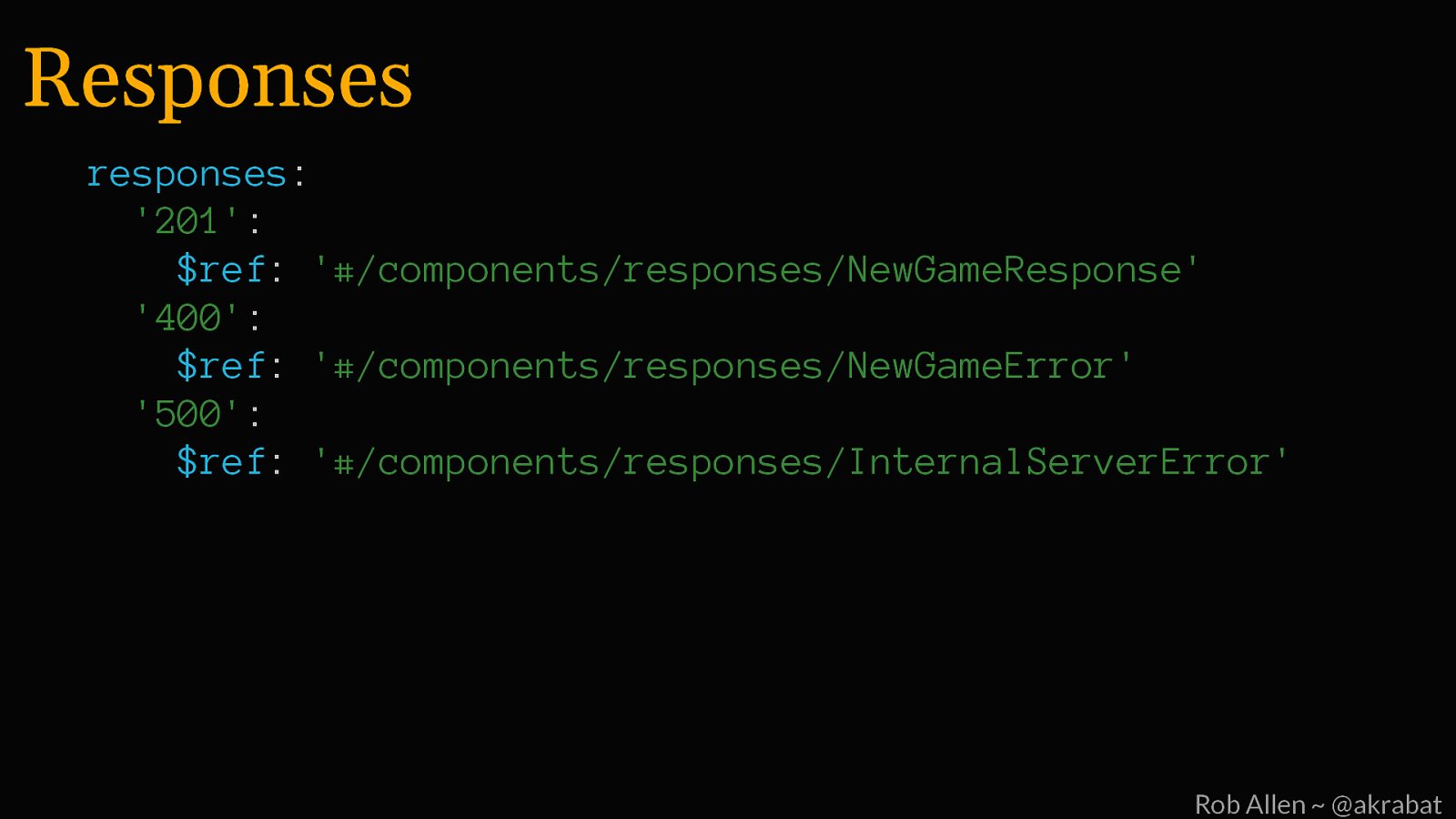
Responses responses: ‘201’: $ref: ‘#/components/responses/NewGameResponse’ ‘400’: $ref: ‘#/components/responses/NewGameError’ ‘500’: $ref: ‘#/components/responses/InternalServerError’ Rob Allen ~ @akrabat
Slide 36
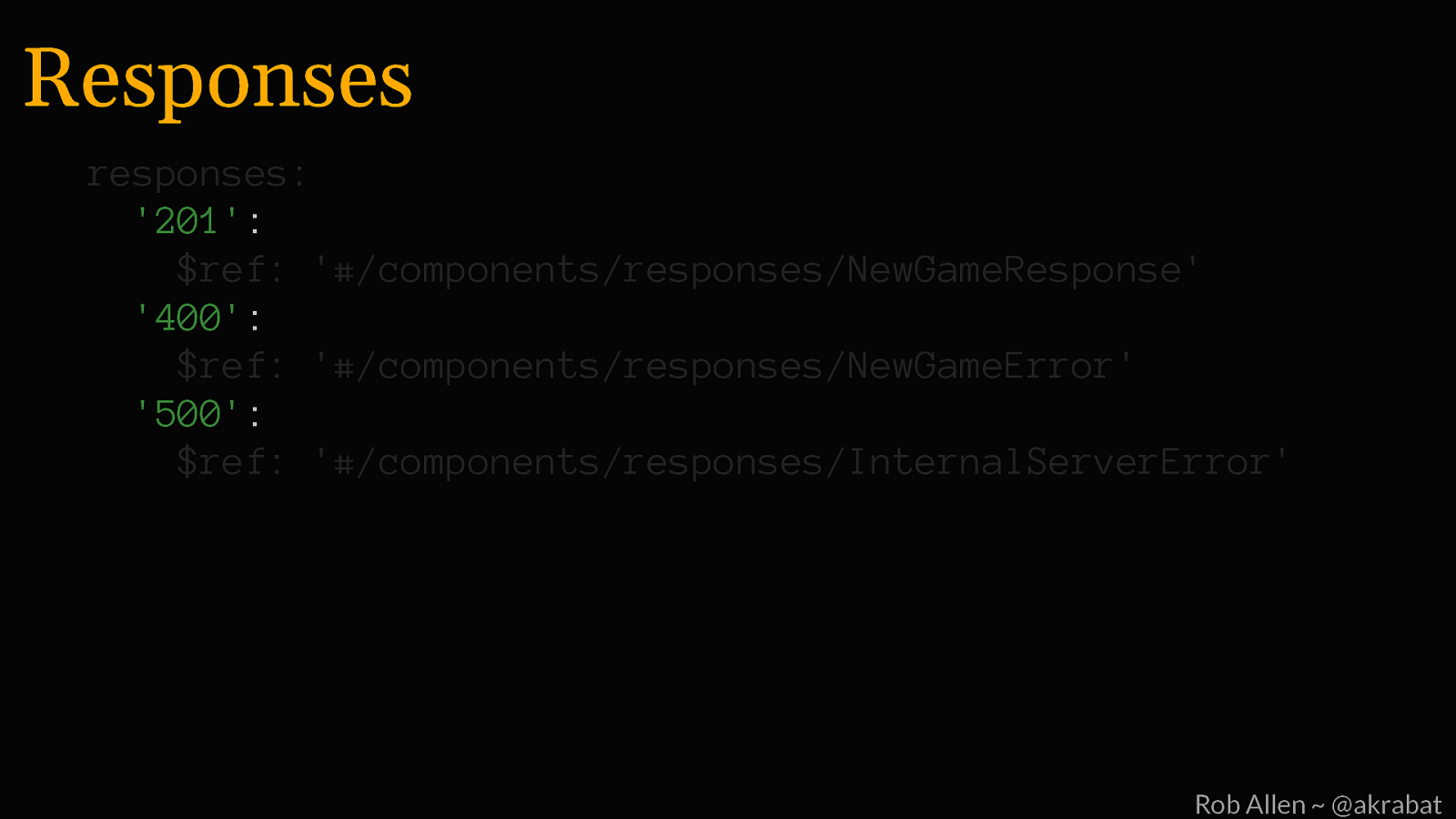
Responses responses: ‘201’: $ref: ‘#/components/responses/NewGameResponse’ ‘400’: $ref: ‘#/components/responses/NewGameError’ ‘500’: $ref: ‘#/components/responses/InternalServerError’ Rob Allen ~ @akrabat
Slide 37
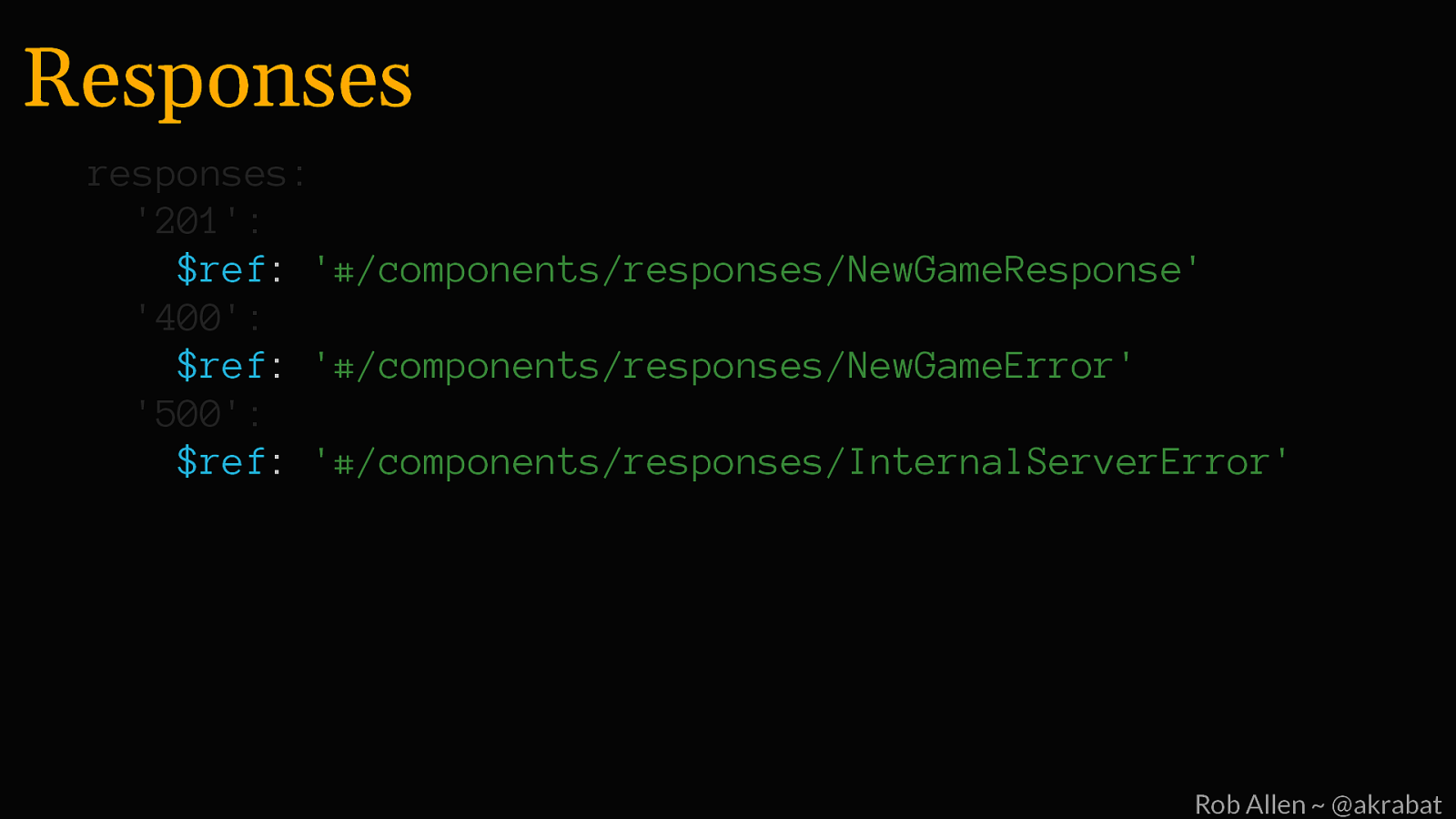
Responses responses: ‘201’: $ref: ‘#/components/responses/NewGameResponse’ ‘400’: $ref: ‘#/components/responses/NewGameError’ ‘500’: $ref: ‘#/components/responses/InternalServerError’ Rob Allen ~ @akrabat
Slide 38

Writing your spec Rob Allen ~ @akrabat
Slide 39
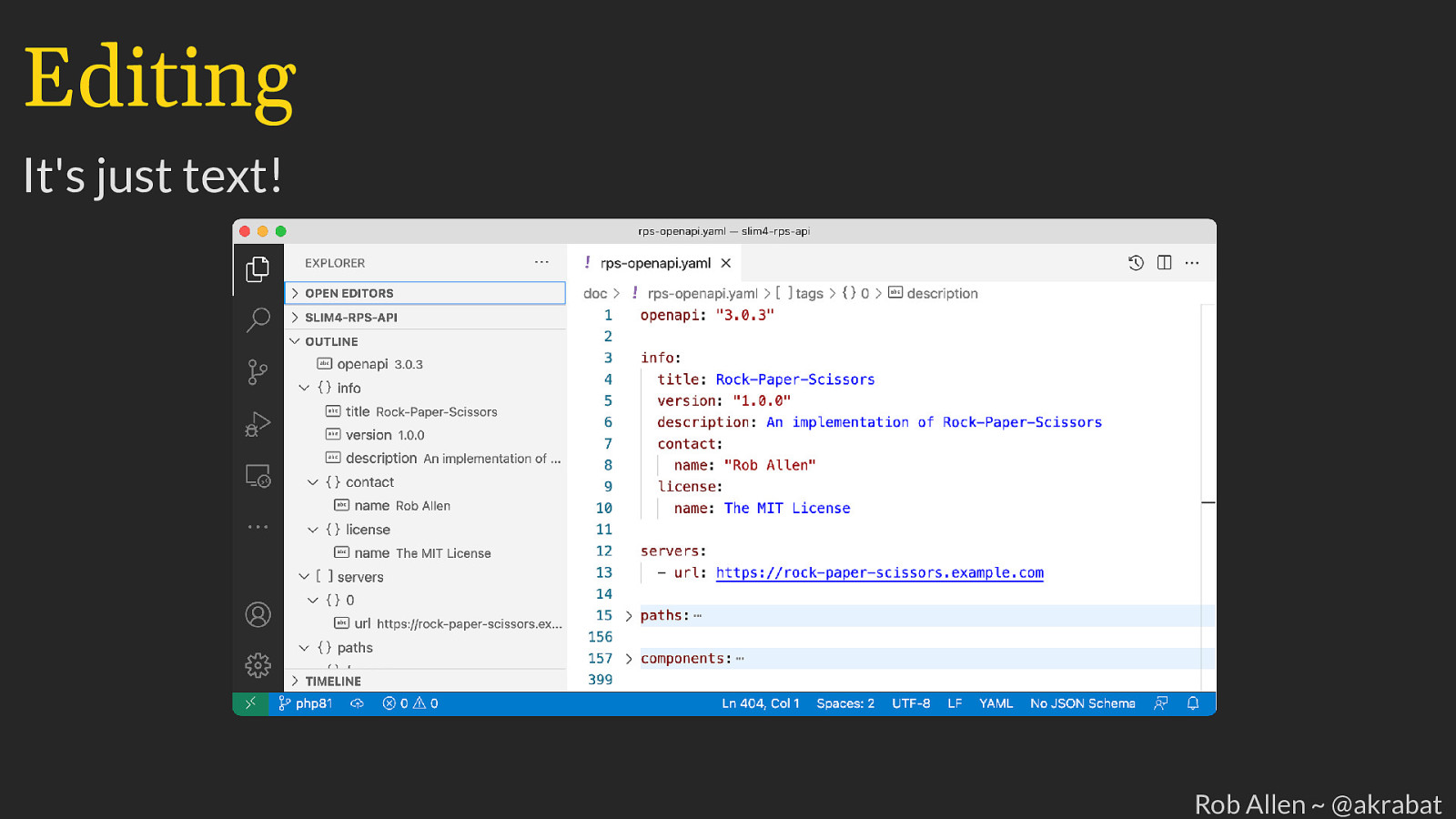
Editing It’s just text! Rob Allen ~ @akrabat
Slide 40
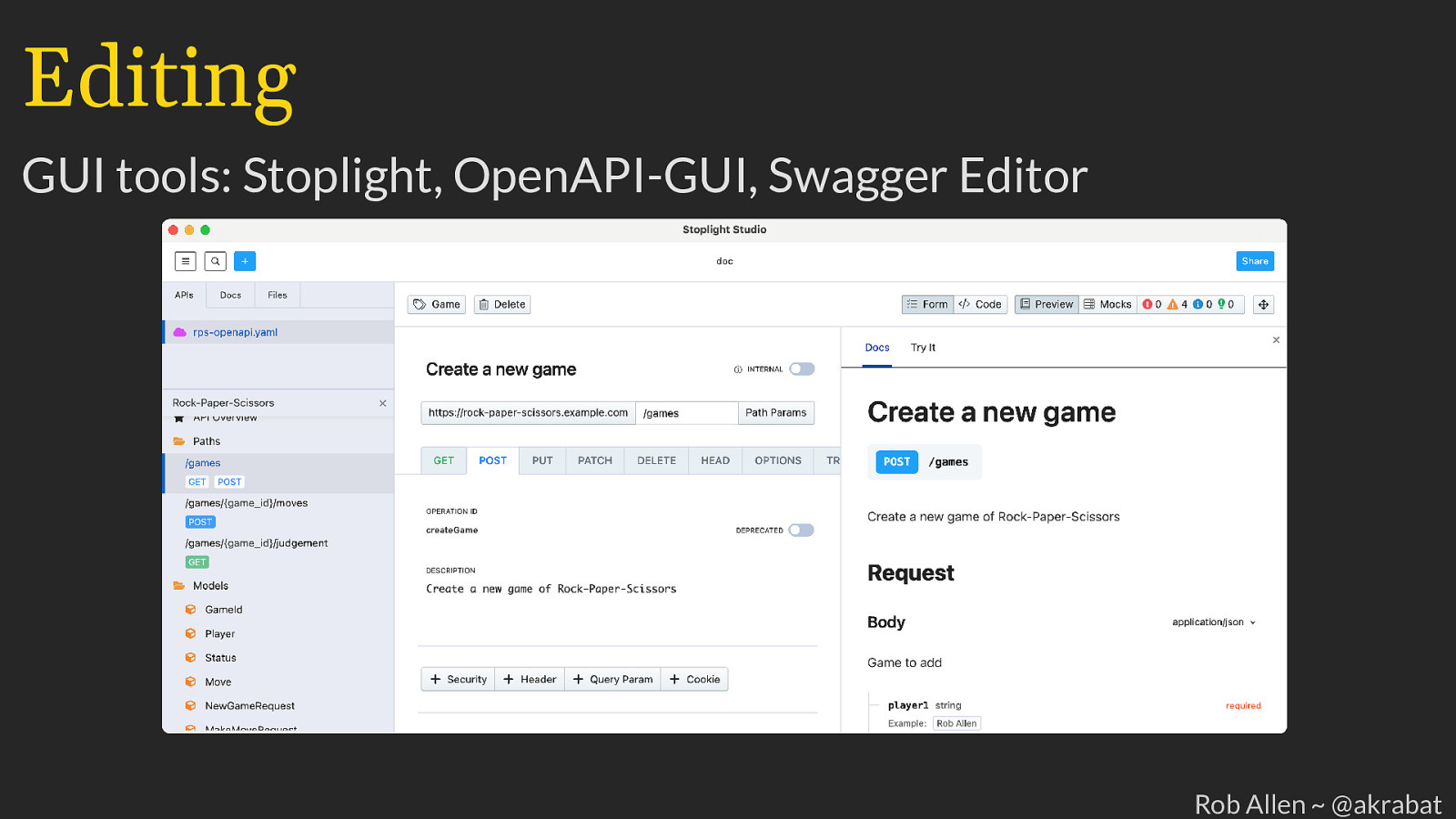
Editing GUI tools: Stoplight, OpenAPI-GUI, Swagger Editor Rob Allen ~ @akrabat
Slide 41
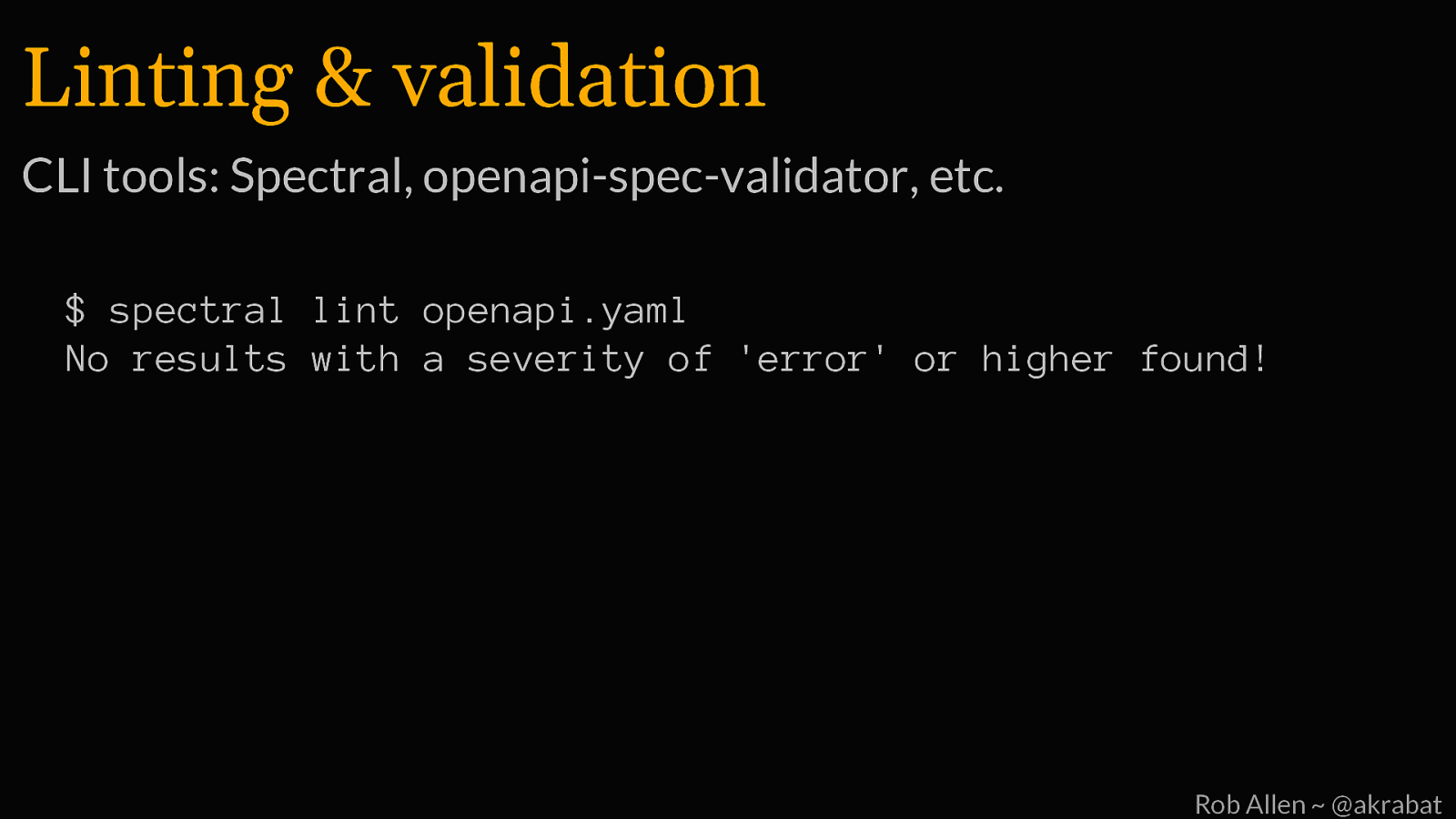
Linting & validation CLI tools: Spectral, openapi-spec-validator, etc. $ spectral lint openapi.yaml No results with a severity of ‘error’ or higher found! Rob Allen ~ @akrabat
Slide 42
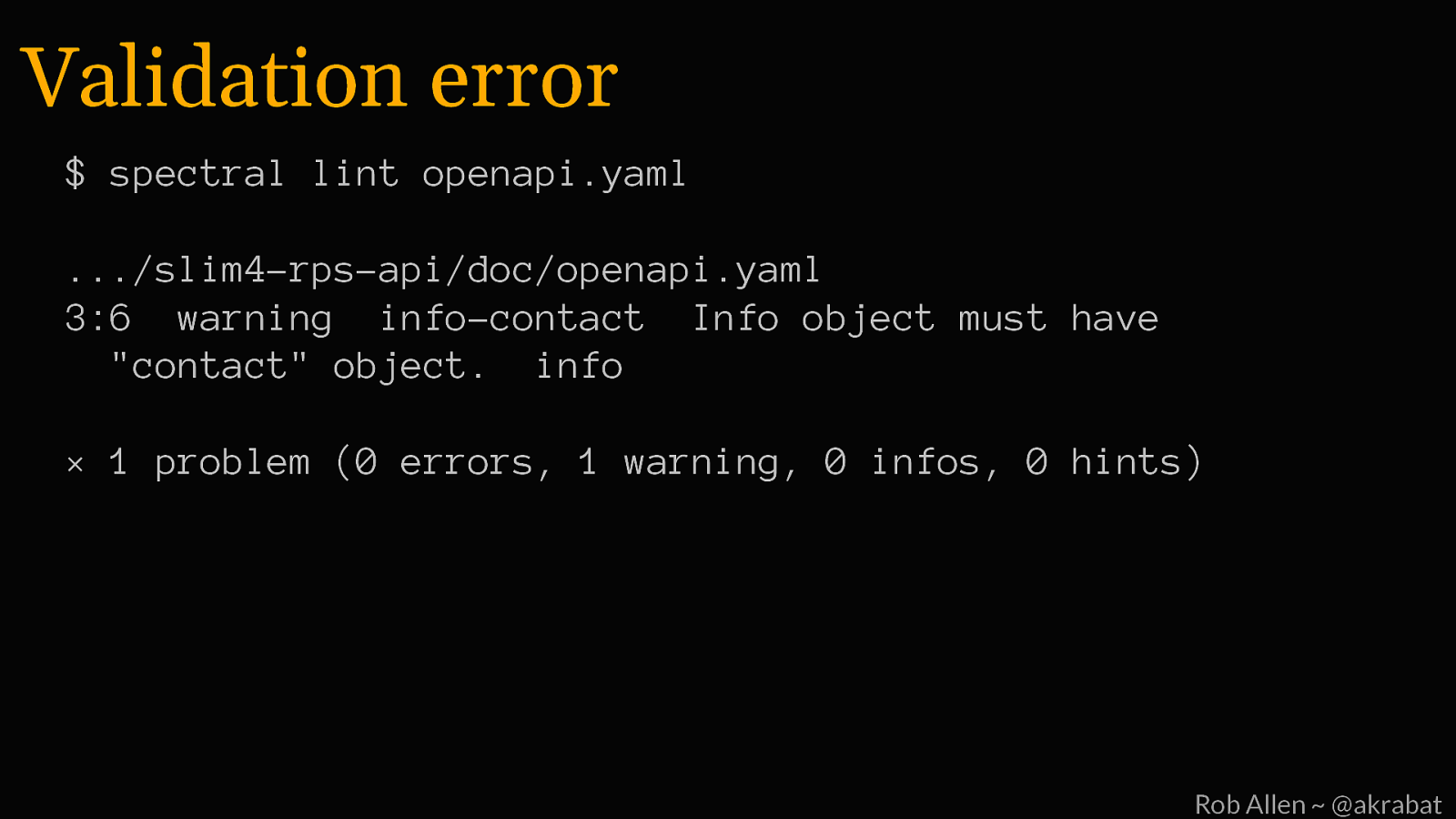
Validation error $ spectral lint openapi.yaml …/slim4-rps-api/doc/openapi.yaml 3:6 warning info-contact Info object must have “contact” object. info × 1 problem (0 errors, 1 warning, 0 infos, 0 hints) Rob Allen ~ @akrabat
Slide 43
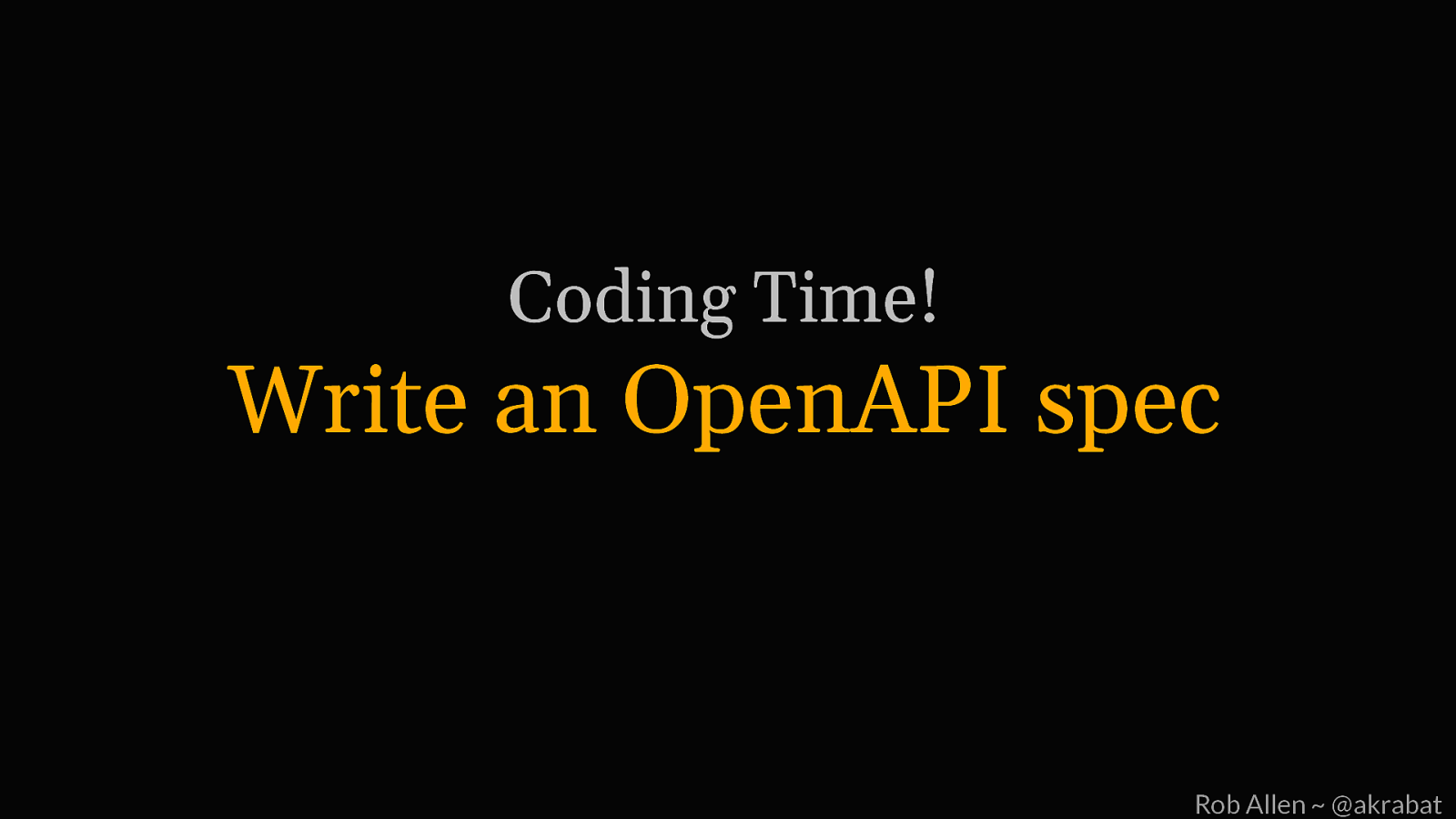
Coding Time! Write an OpenAPI spec Rob Allen ~ @akrabat
Slide 44

Docs Rob Allen ~ @akrabat
Slide 45
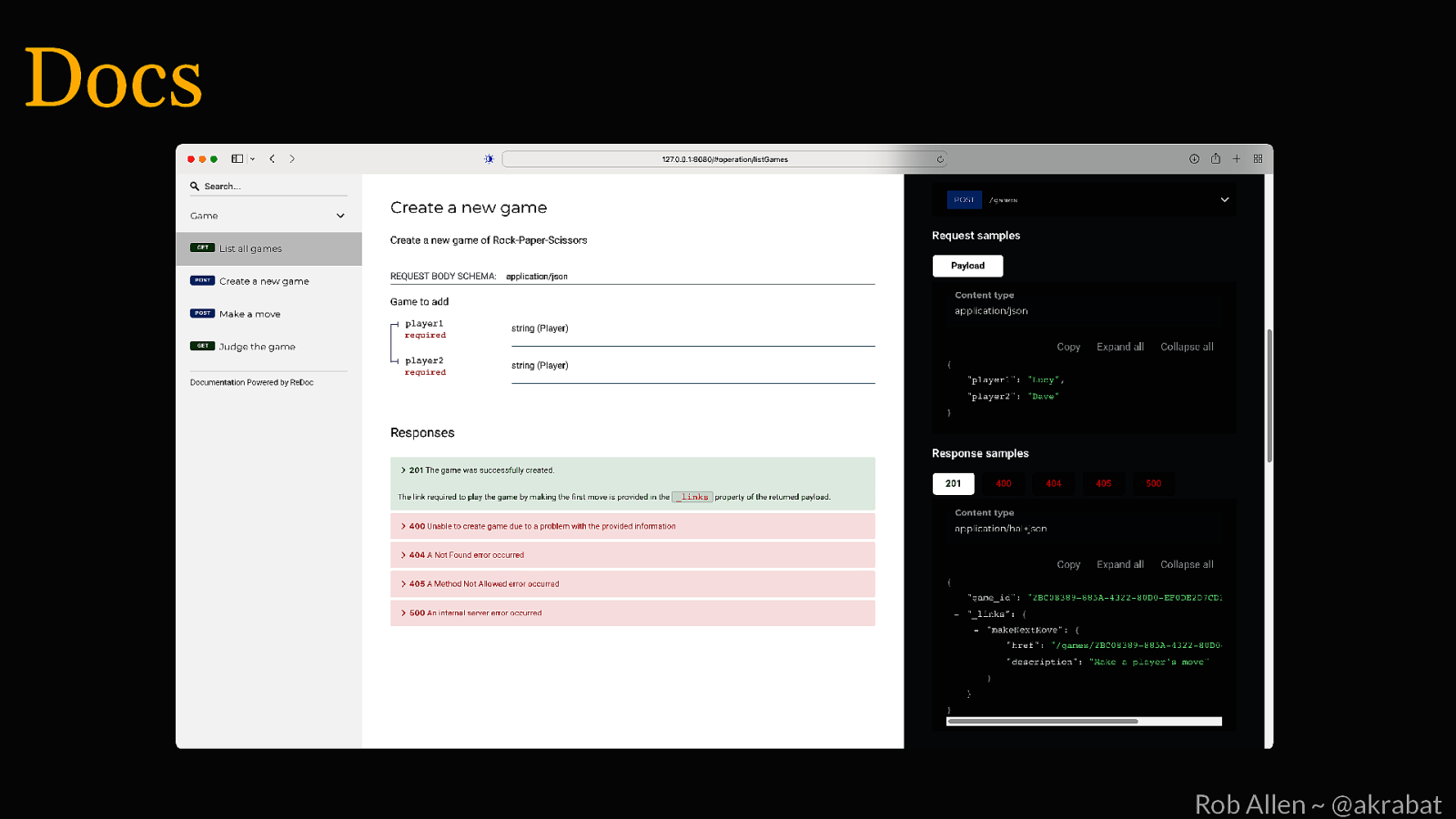
Docs Rob Allen ~ @akrabat
Slide 46
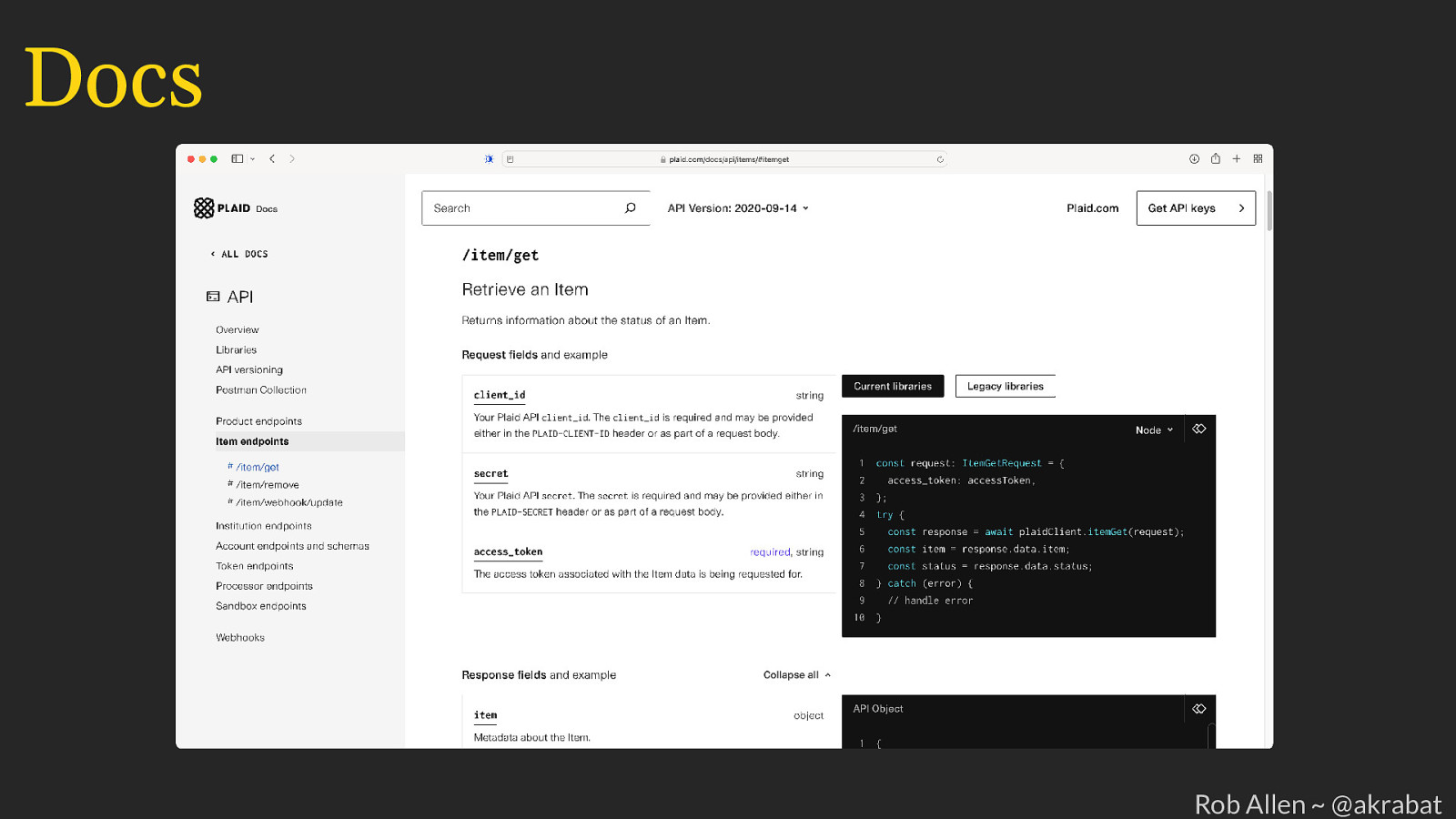
Docs Rob Allen ~ @akrabat
Slide 47
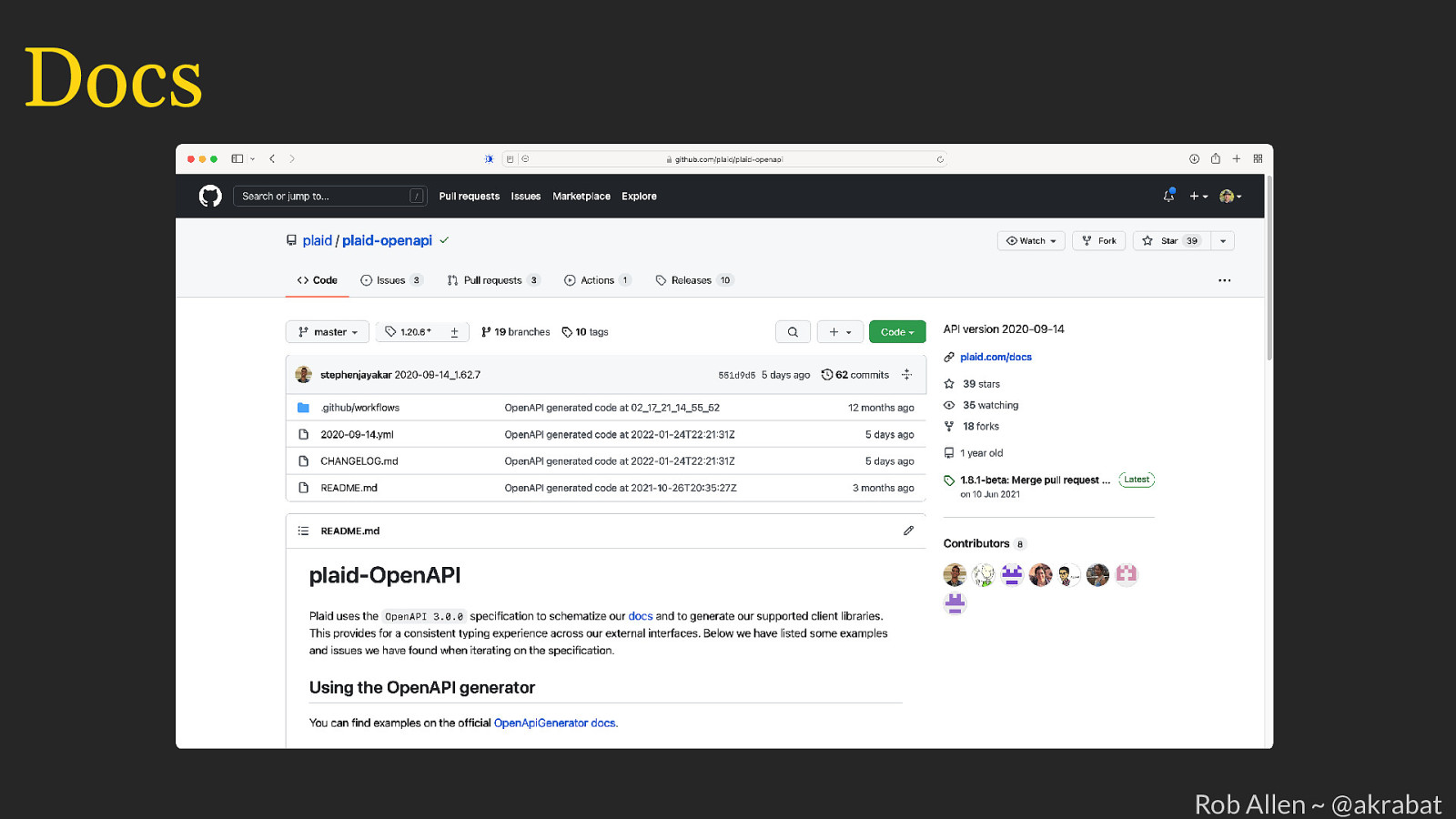
Docs Rob Allen ~ @akrabat
Slide 48
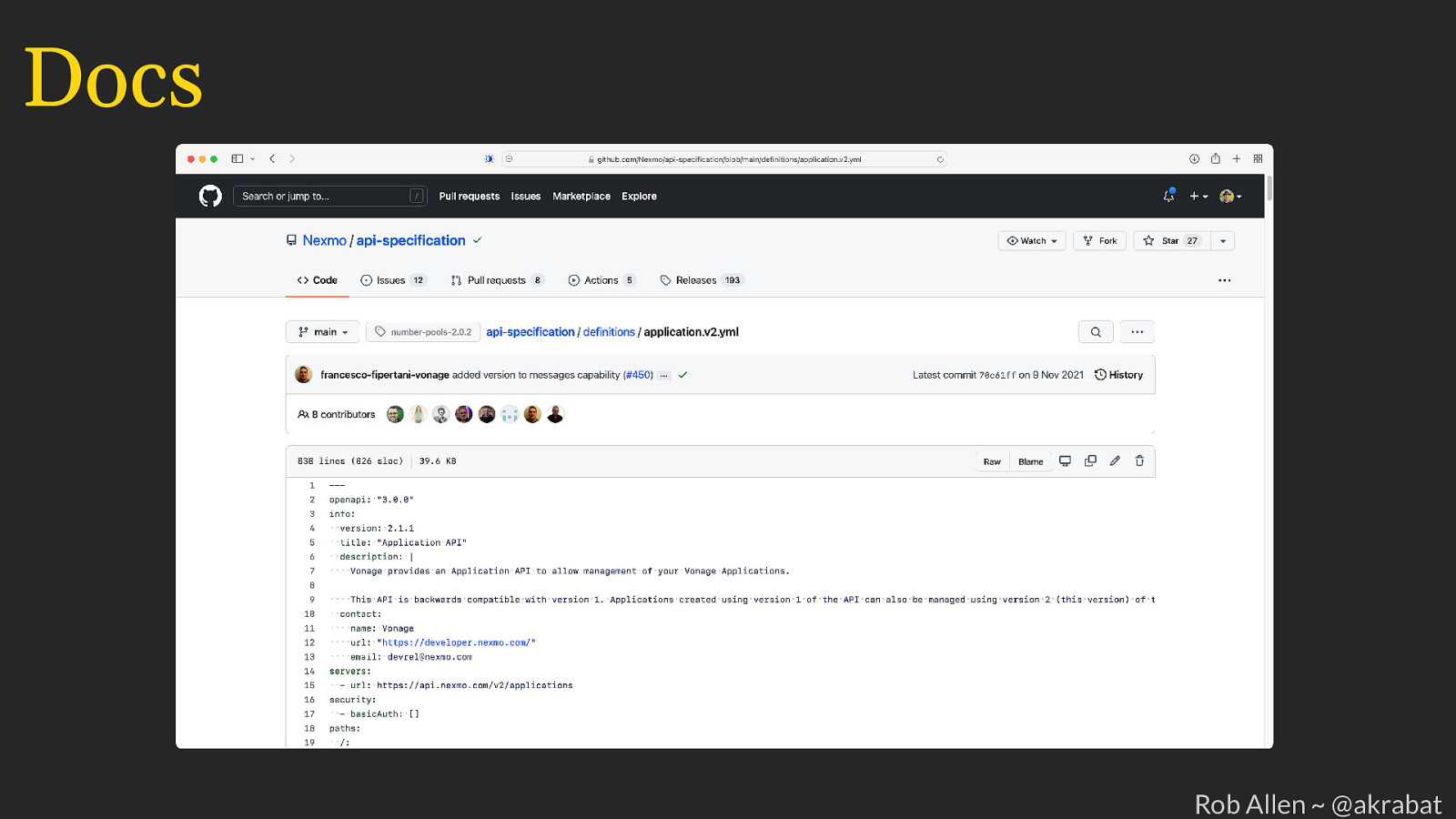
Docs Rob Allen ~ @akrabat
Slide 49
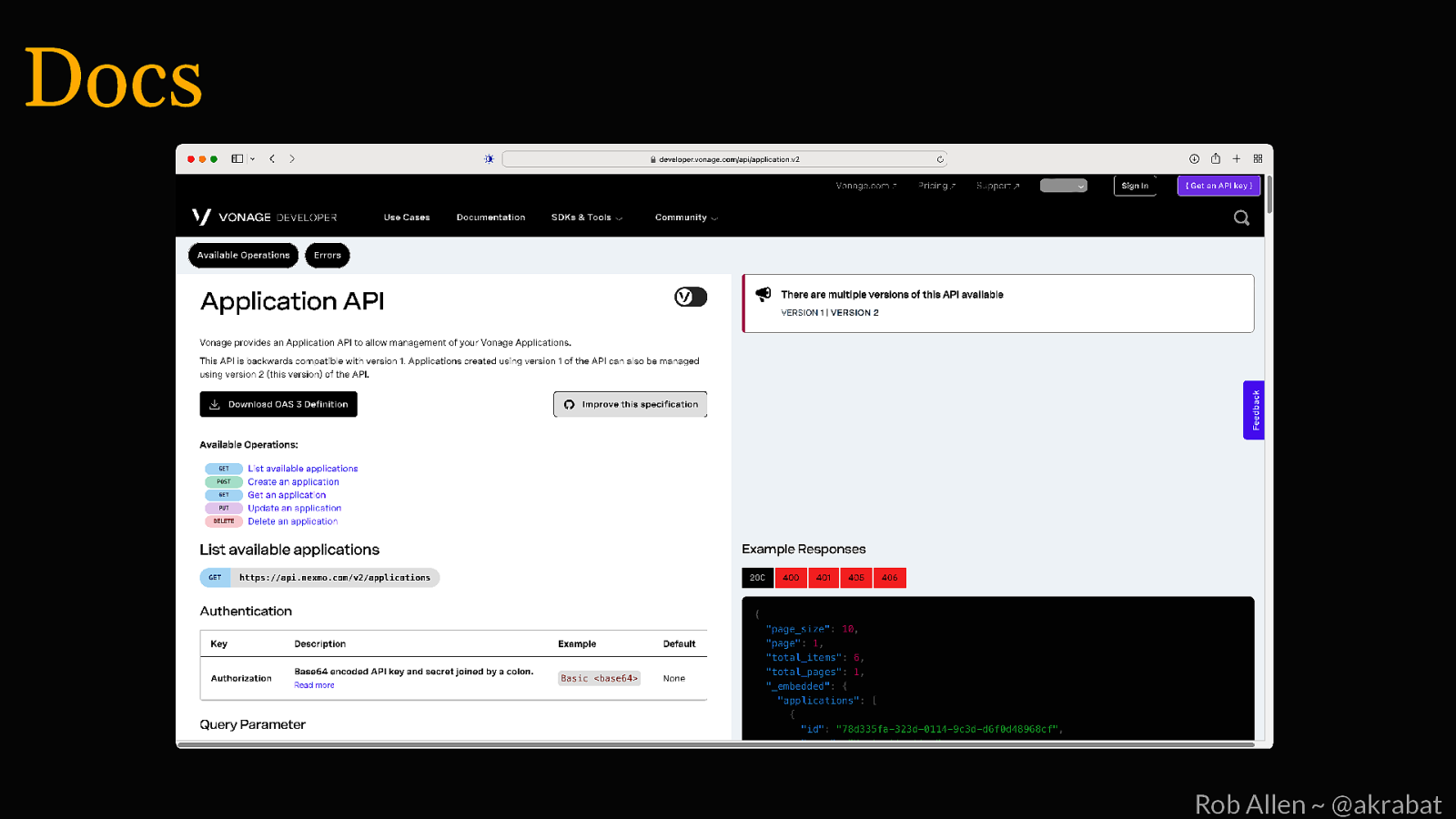
Docs Rob Allen ~ @akrabat
Slide 50
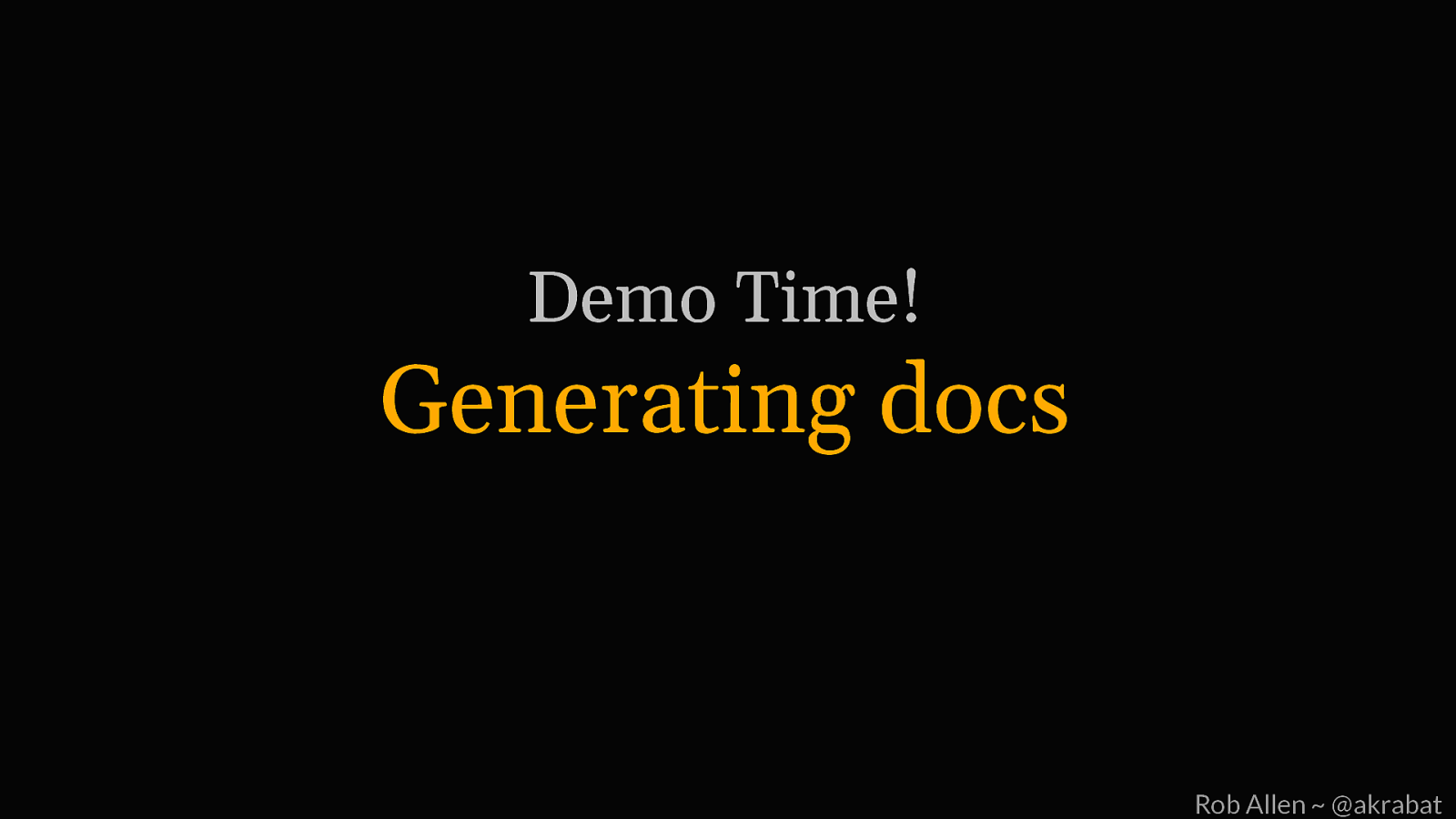
Demo Time! Generating docs Rob Allen ~ @akrabat
Slide 51

Developers Rob Allen ~ @akrabat
Slide 52
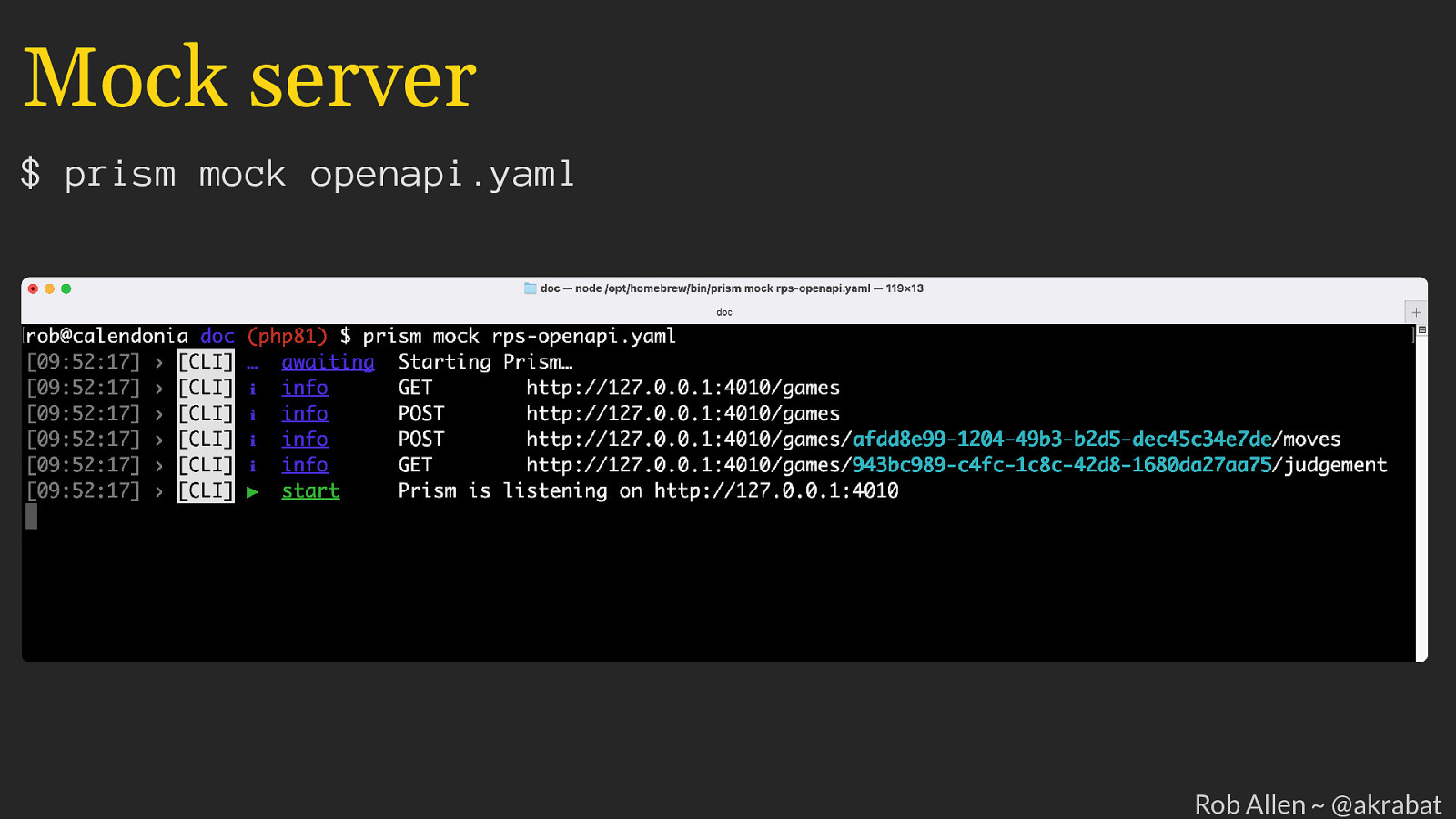
Mock server $ prism mock openapi.yaml Rob Allen ~ @akrabat
Slide 53
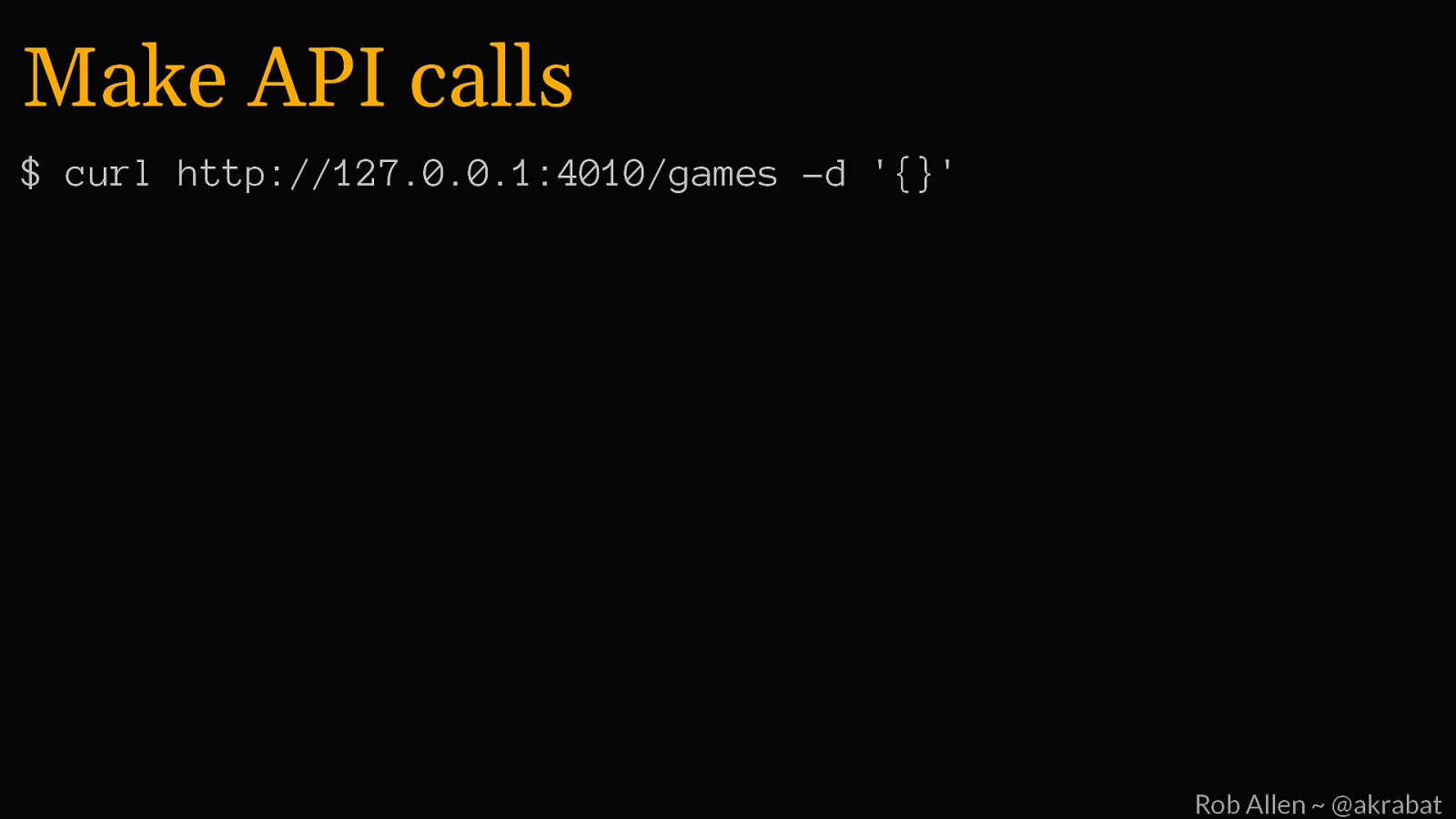
Make API calls $ curl http://127.0.0.1:4010/games -d ‘{}’ Rob Allen ~ @akrabat
Slide 54
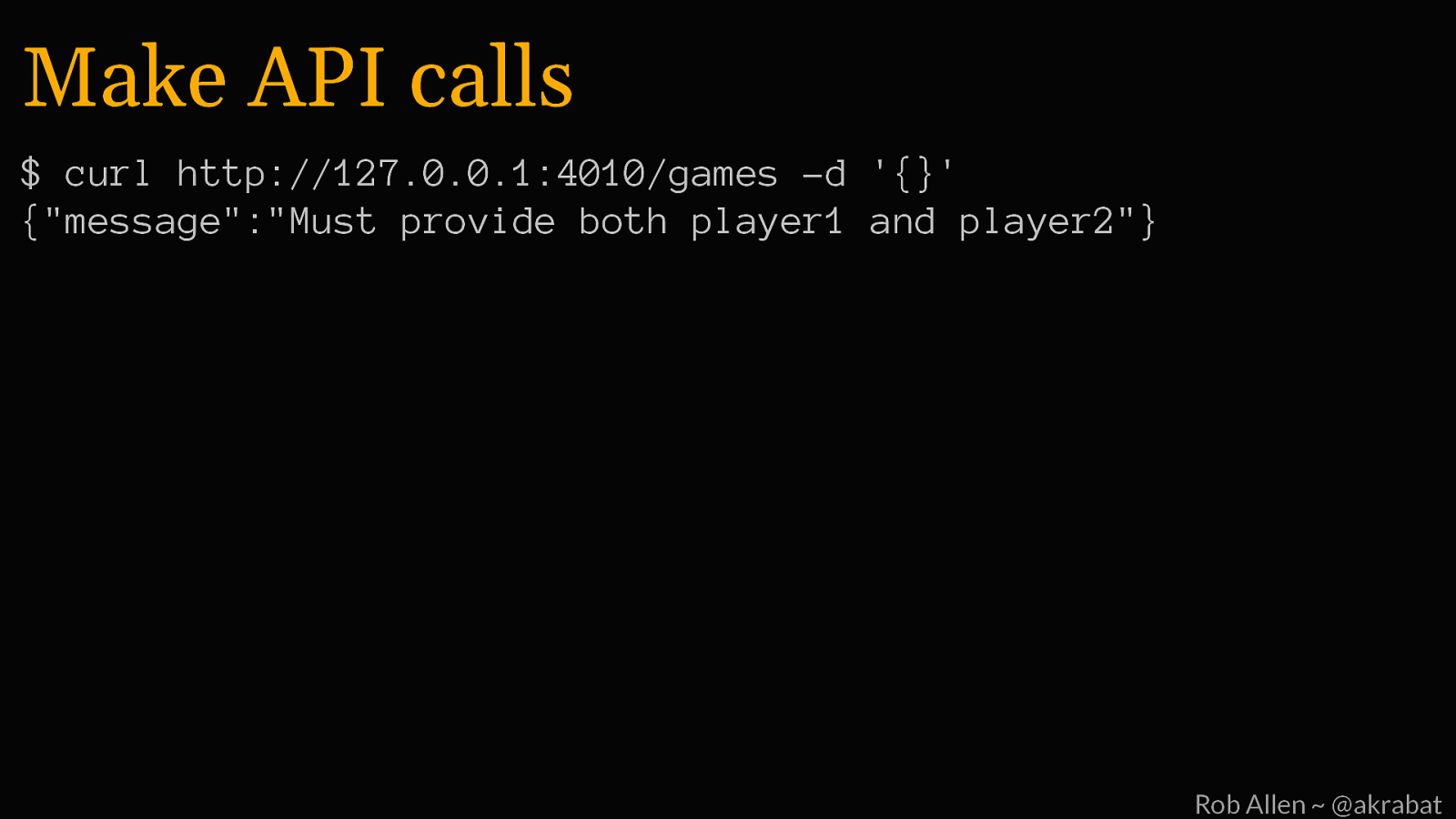
Make API calls $ curl http://127.0.0.1:4010/games -d ‘{}’ {“message”:”Must provide both player1 and player2”} Rob Allen ~ @akrabat
Slide 55
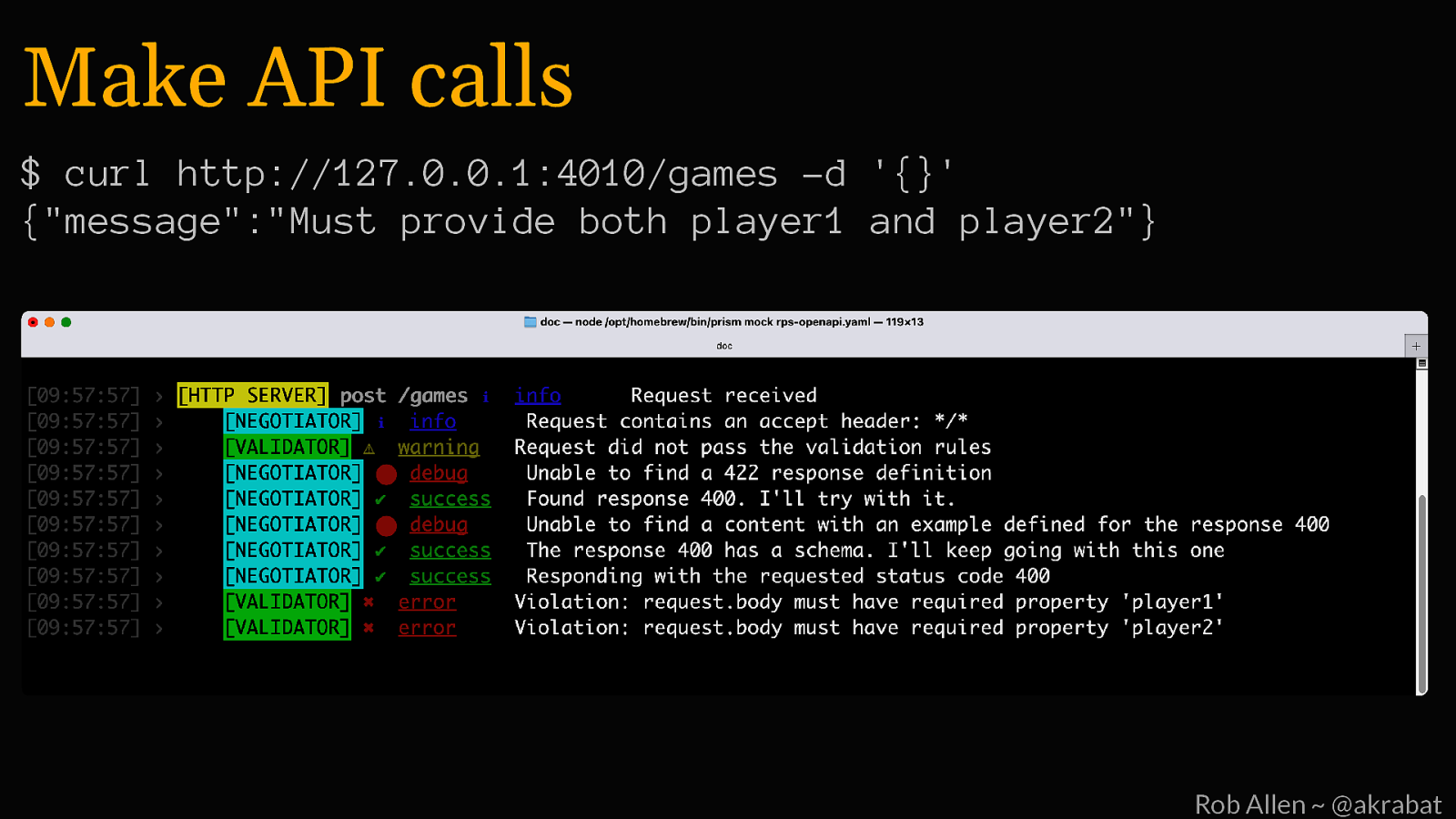
Make API calls $ curl http://127.0.0.1:4010/games -d ‘{}’ {“message”:”Must provide both player1 and player2”} Rob Allen ~ @akrabat
Slide 56
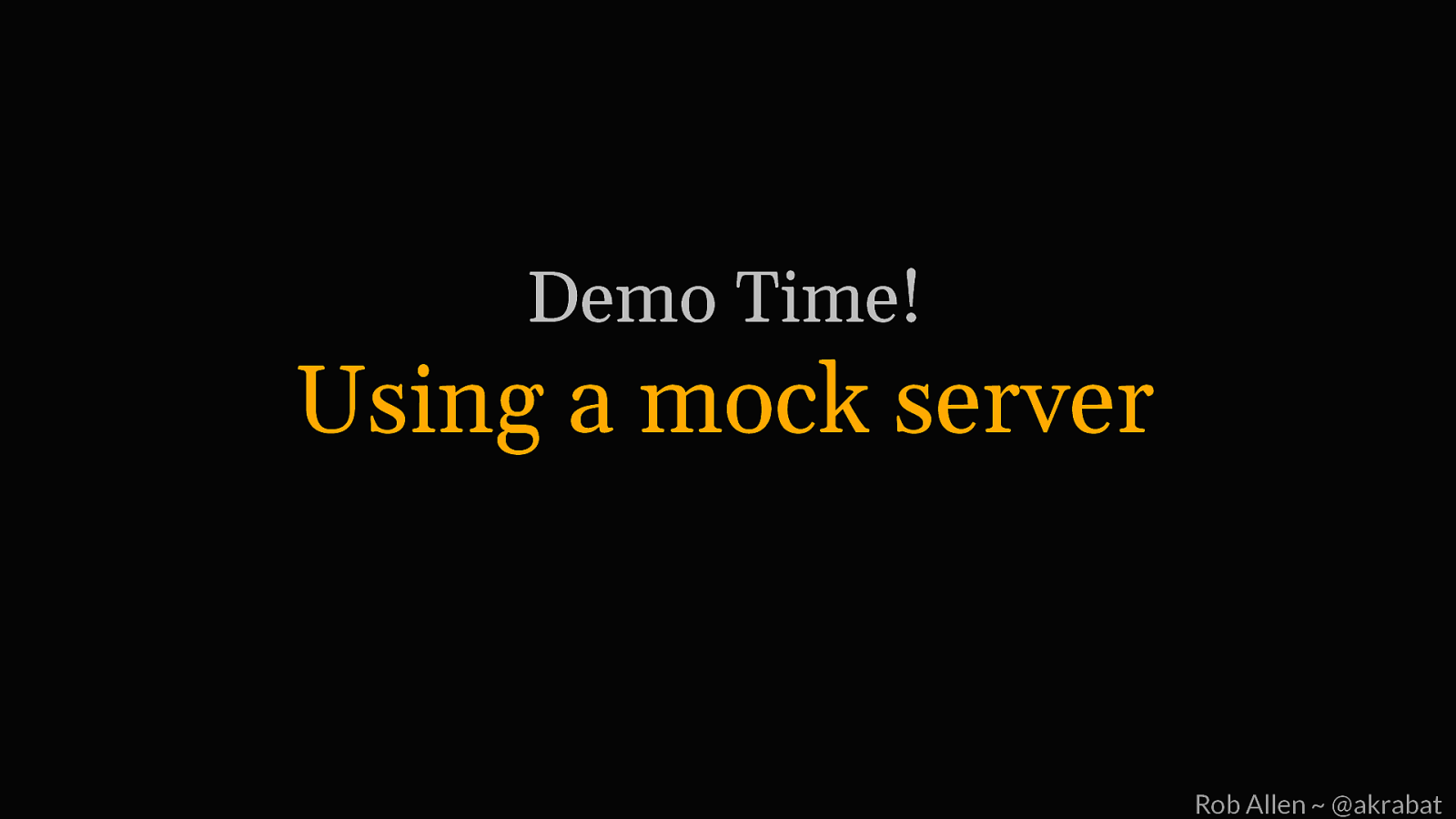
Demo Time! Using a mock server Rob Allen ~ @akrabat
Slide 57
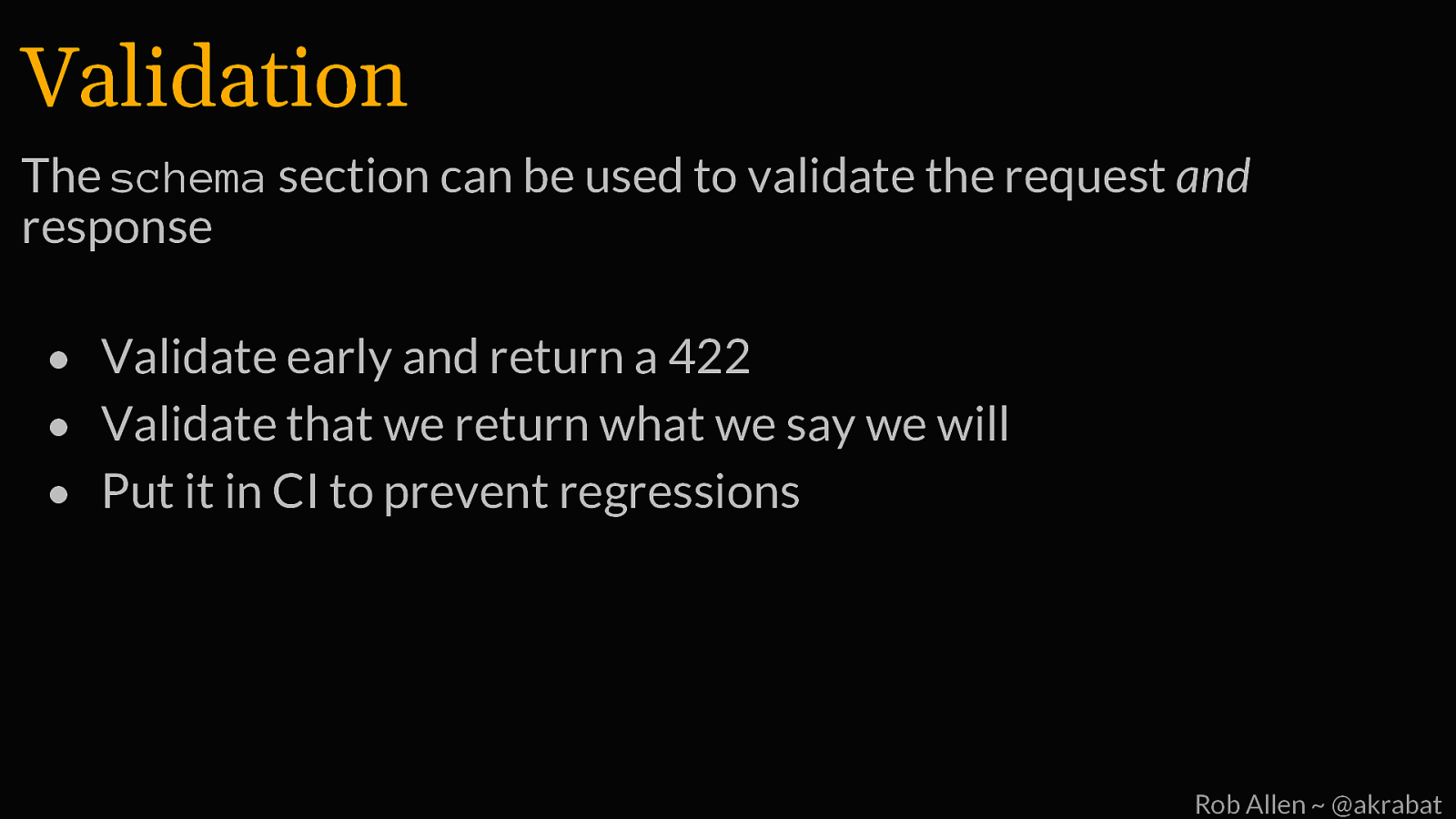
Validation The schema section can be used to validate the request and response • Validate early and return a 422 • Validate that we return what we say we will • Put it in CI to prevent regressions Rob Allen ~ @akrabat
Slide 58
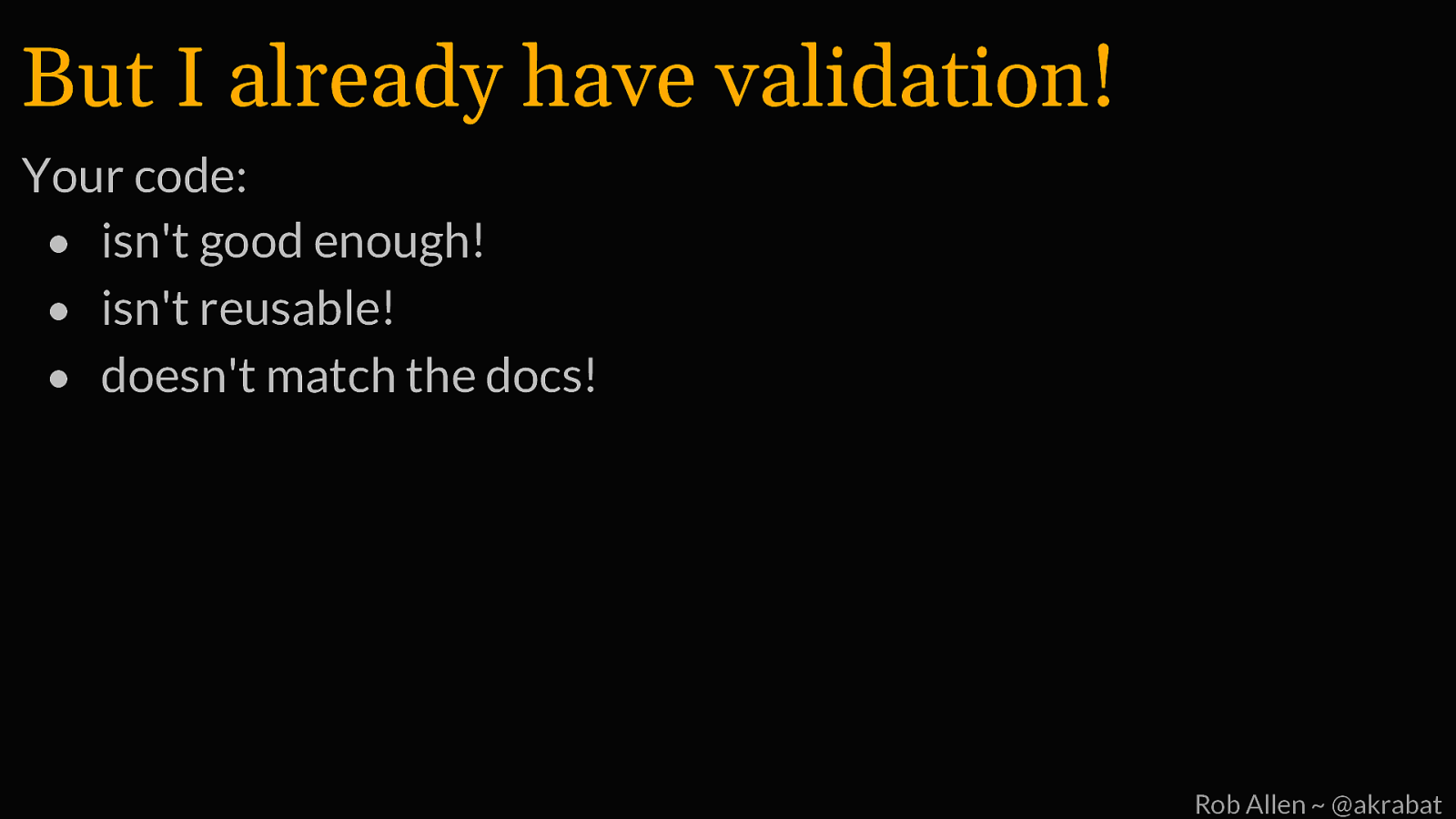
But I already have validation! Your code: • isn’t good enough! • isn’t reusable! • doesn’t match the docs! Rob Allen ~ @akrabat
Slide 59
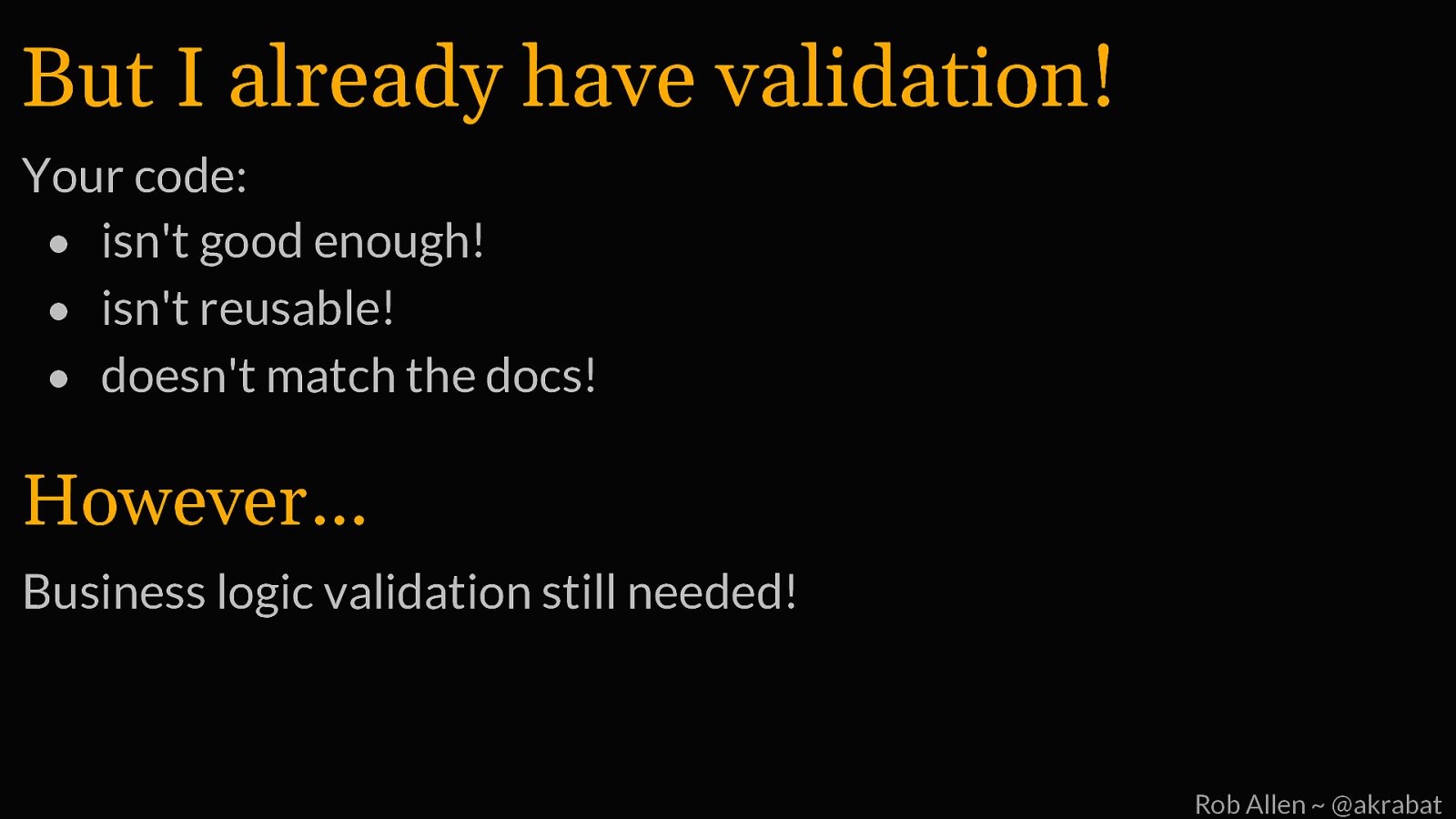
But I already have validation! Your code: • isn’t good enough! • isn’t reusable! • doesn’t match the docs! However… Business logic validation still needed! Rob Allen ~ @akrabat
Slide 60
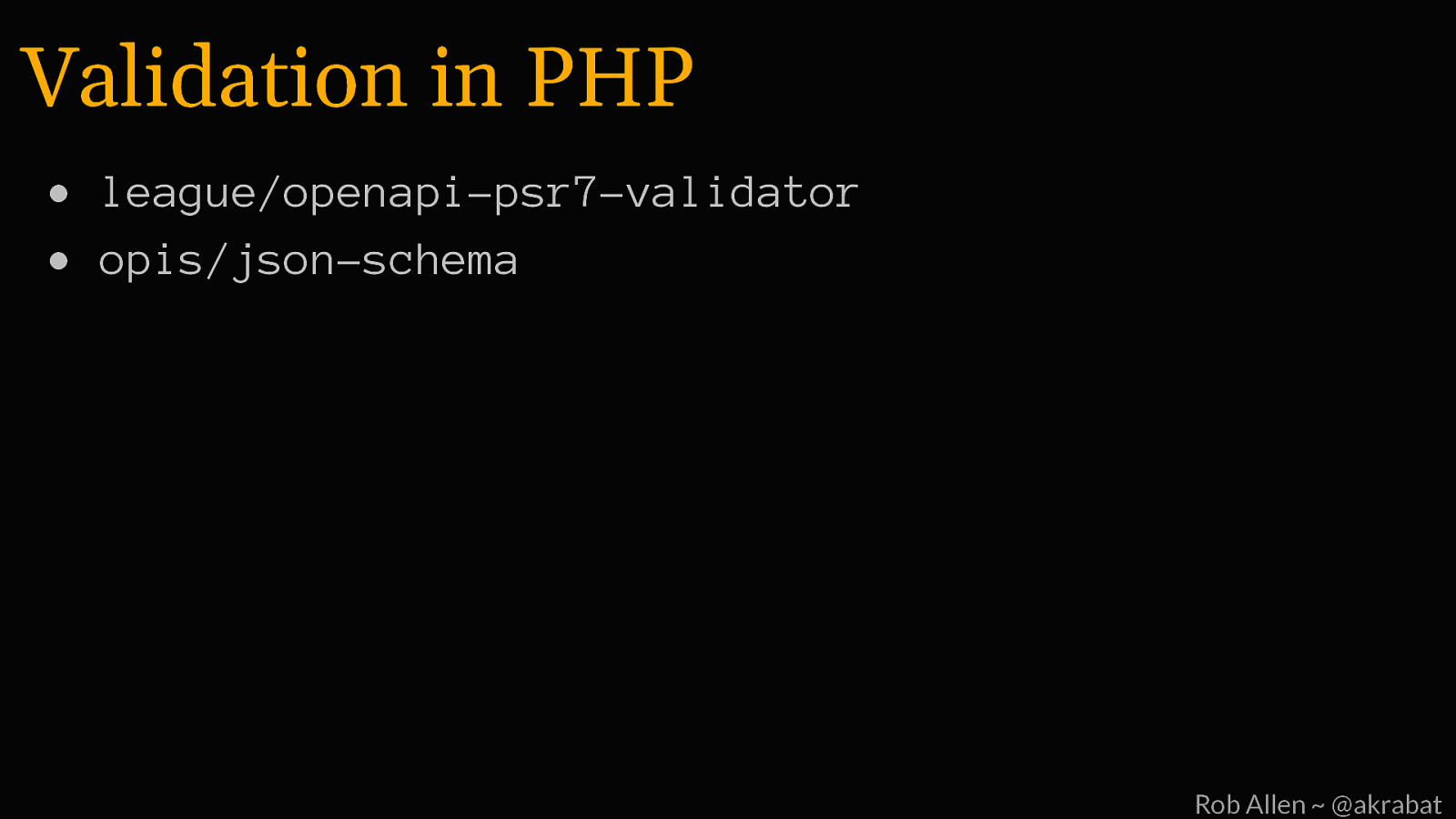
Validation in PHP • league/openapi-psr7-validator • opis/json-schema Rob Allen ~ @akrabat
Slide 61
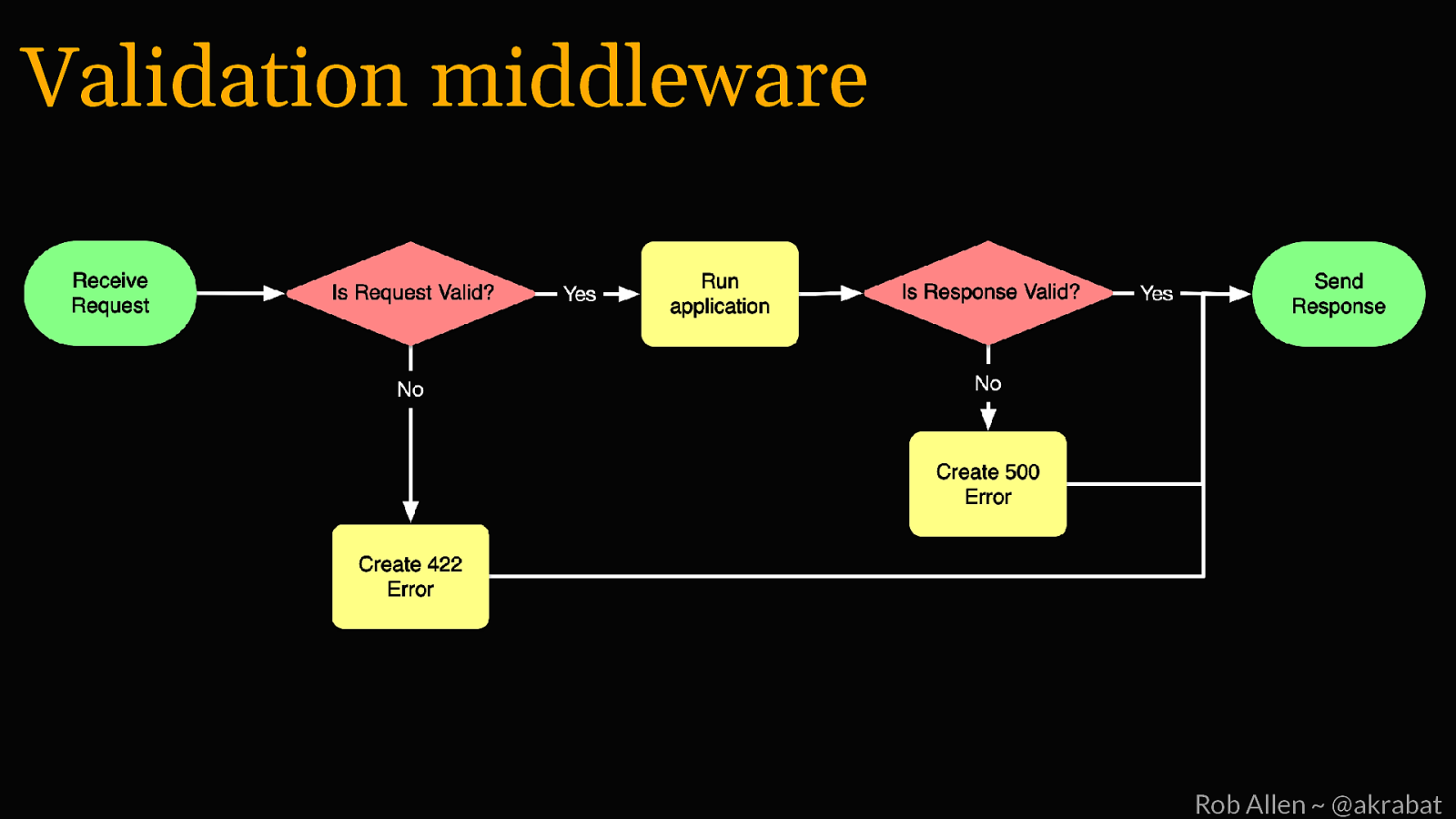
Validation middleware Rob Allen ~ @akrabat
Slide 62
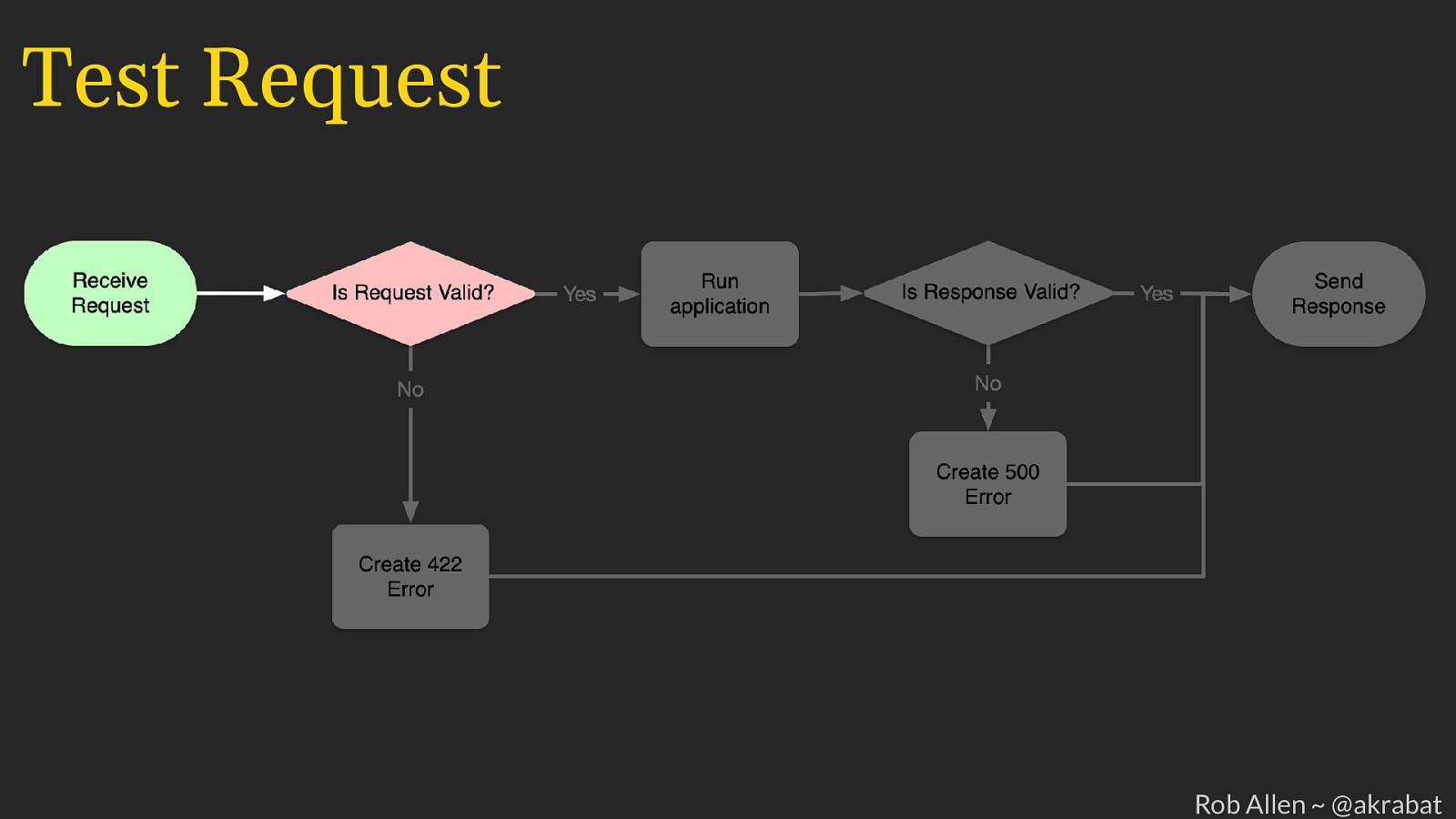
Test Request Rob Allen ~ @akrabat
Slide 63
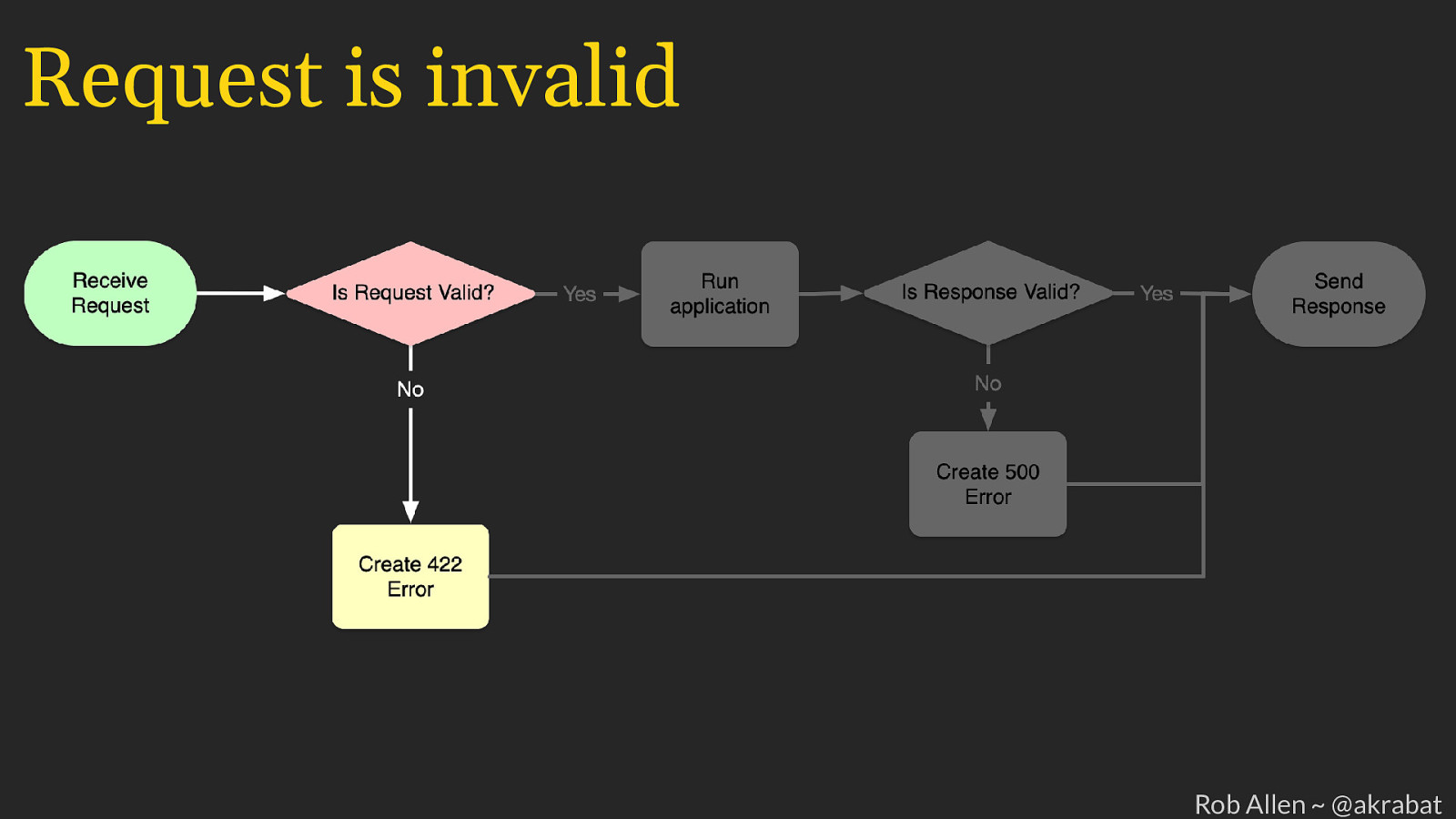
Request is invalid Rob Allen ~ @akrabat
Slide 64
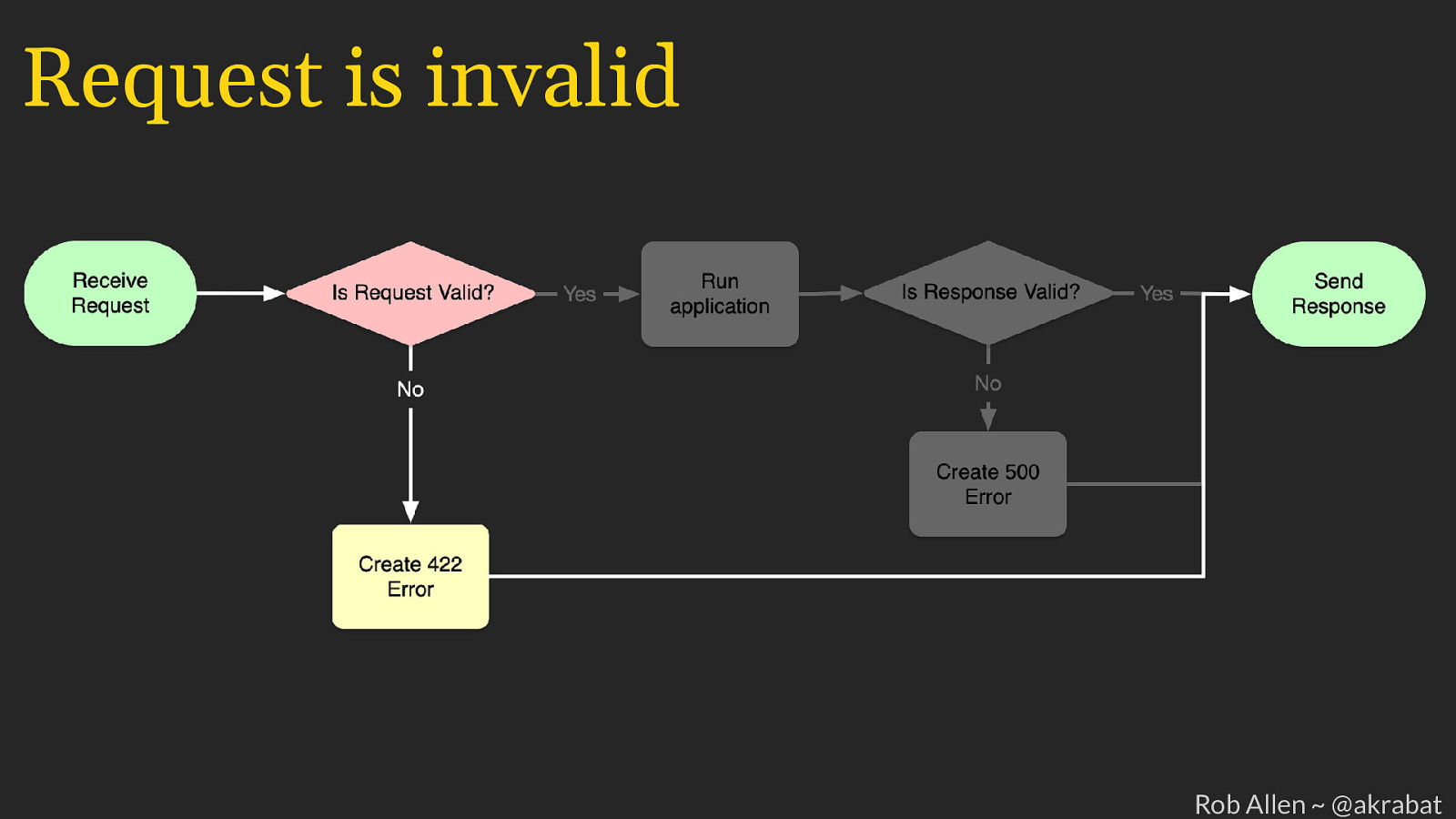
Request is invalid Rob Allen ~ @akrabat
Slide 65
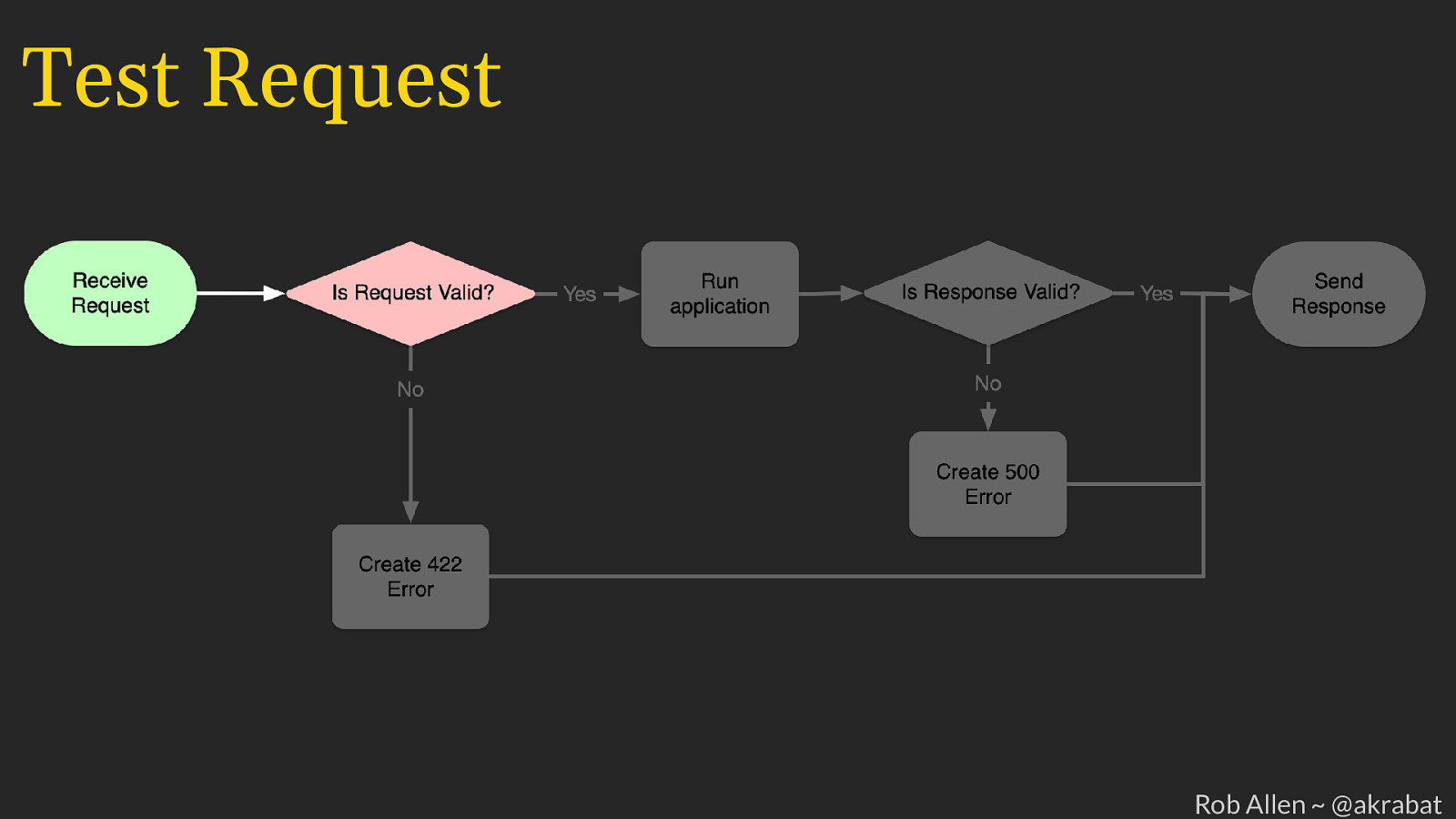
Test Request Rob Allen ~ @akrabat
Slide 66
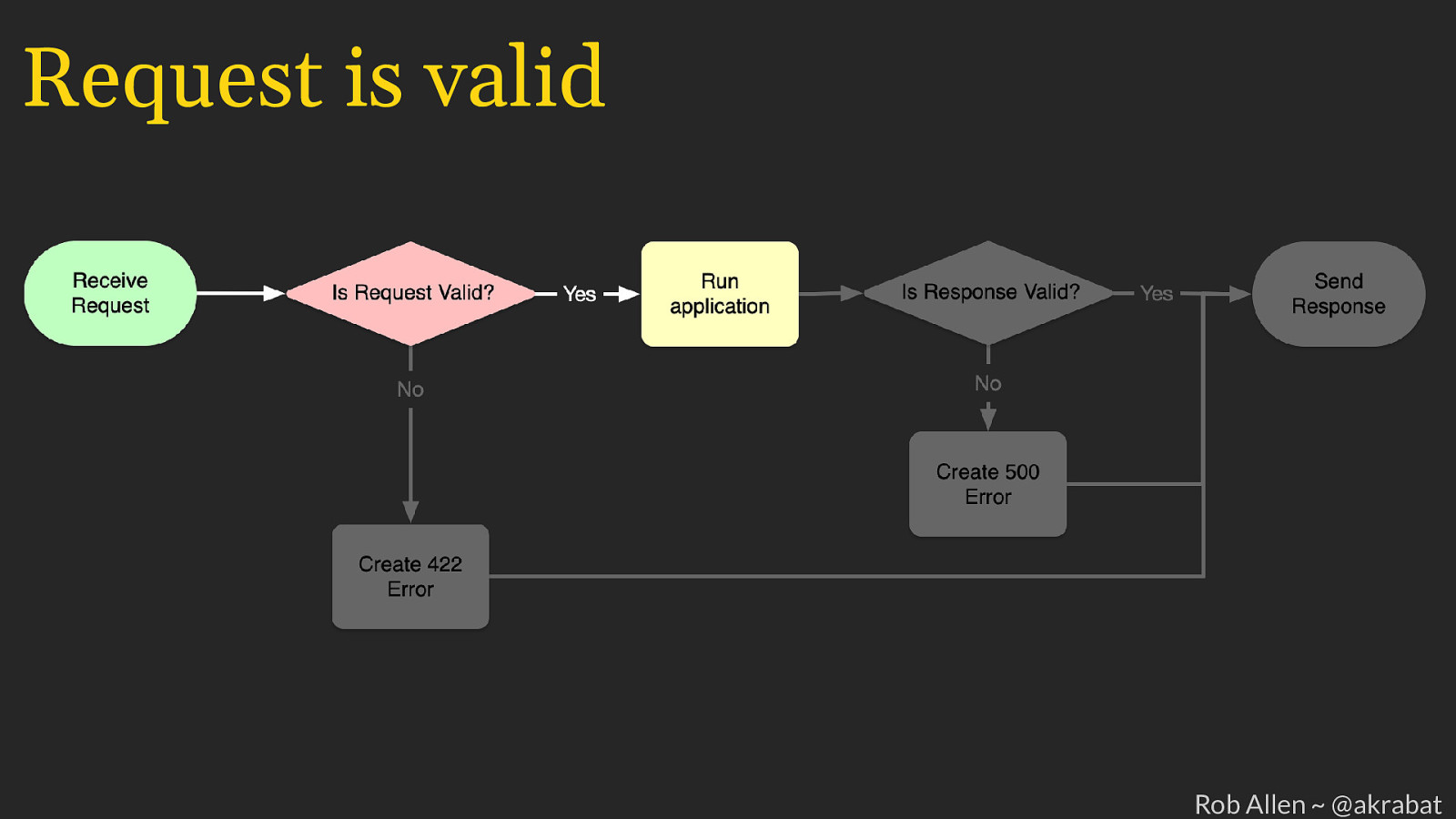
Request is valid Rob Allen ~ @akrabat
Slide 67
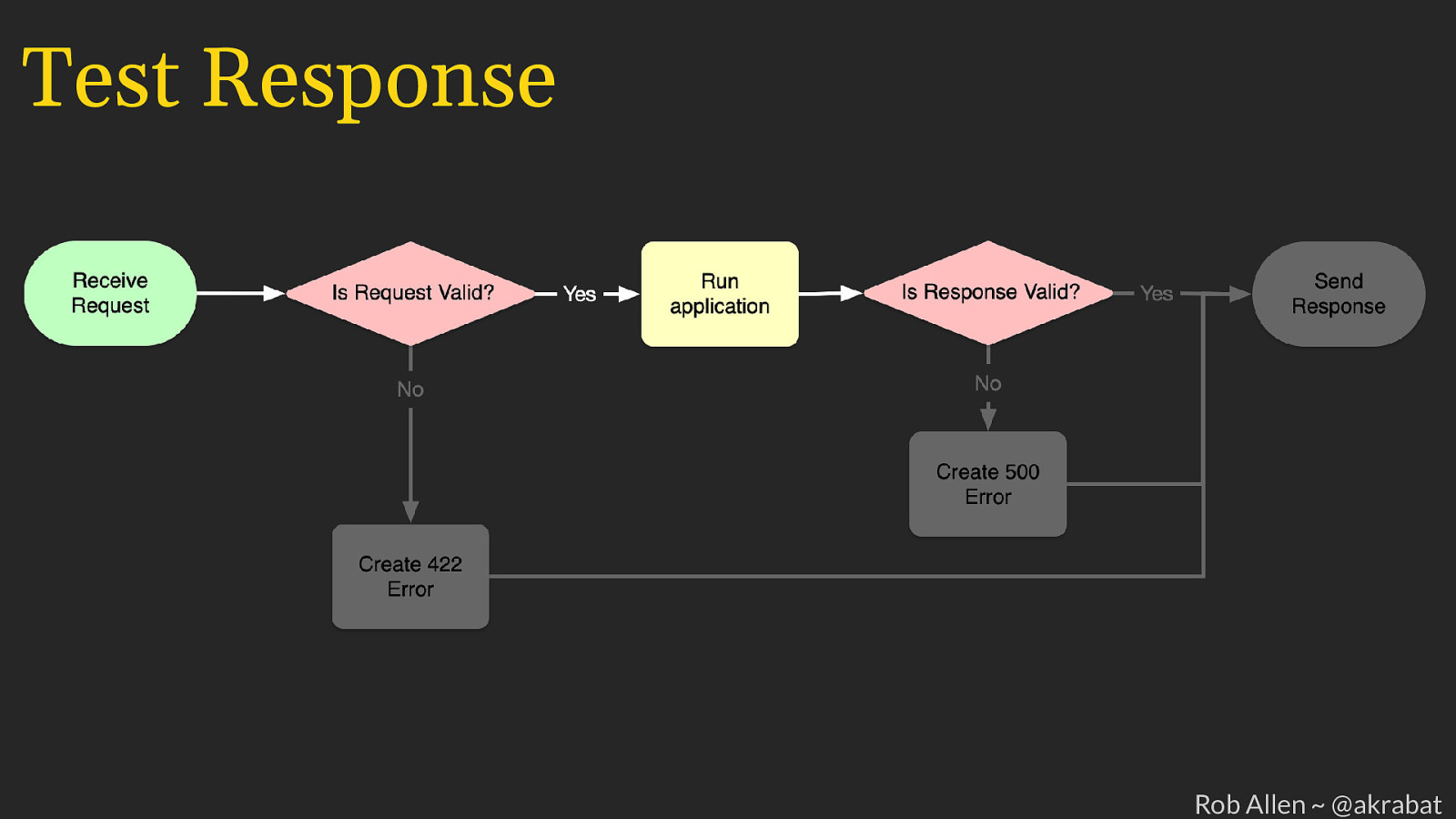
Test Response Rob Allen ~ @akrabat
Slide 68
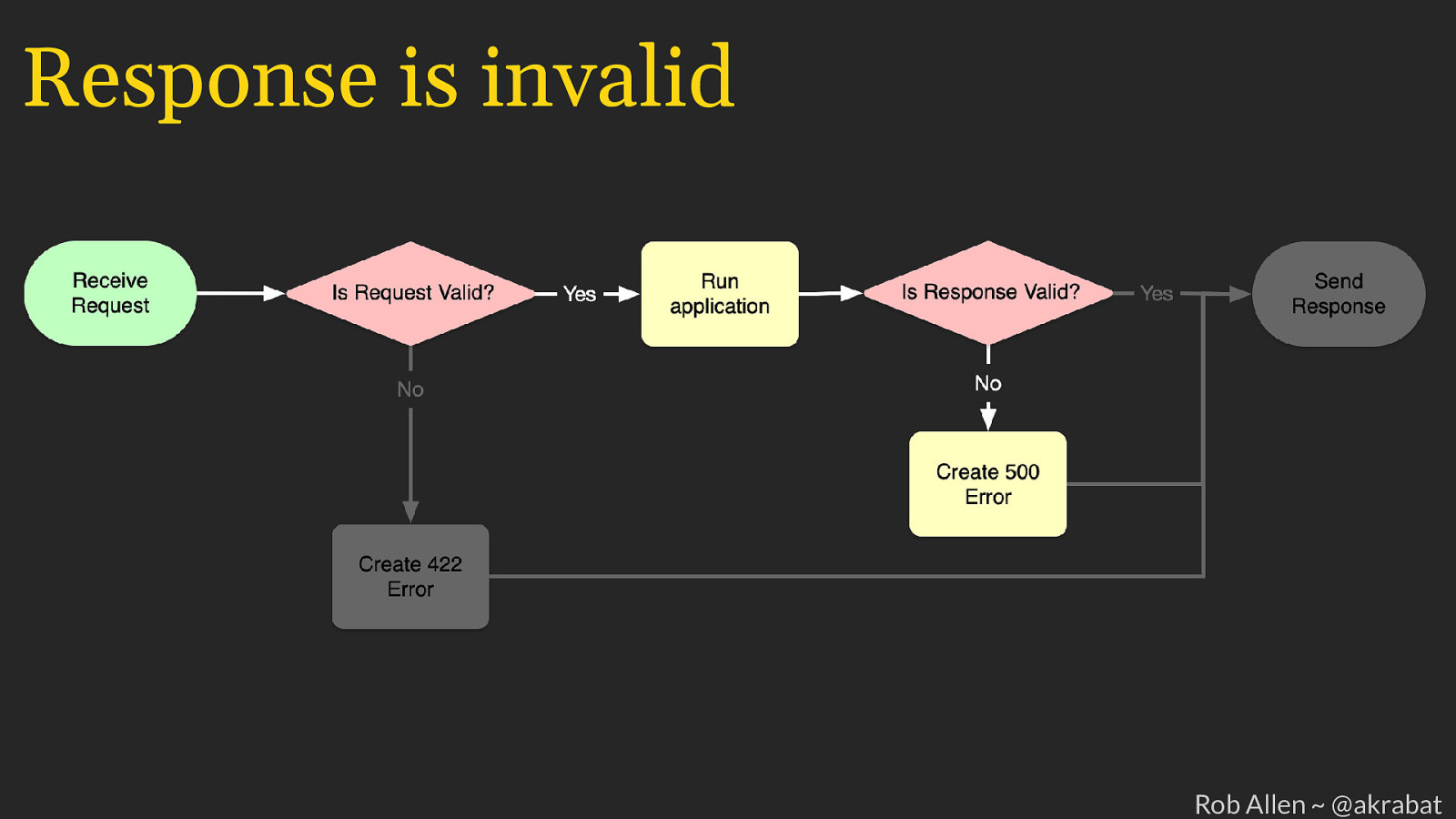
Response is invalid Rob Allen ~ @akrabat
Slide 69
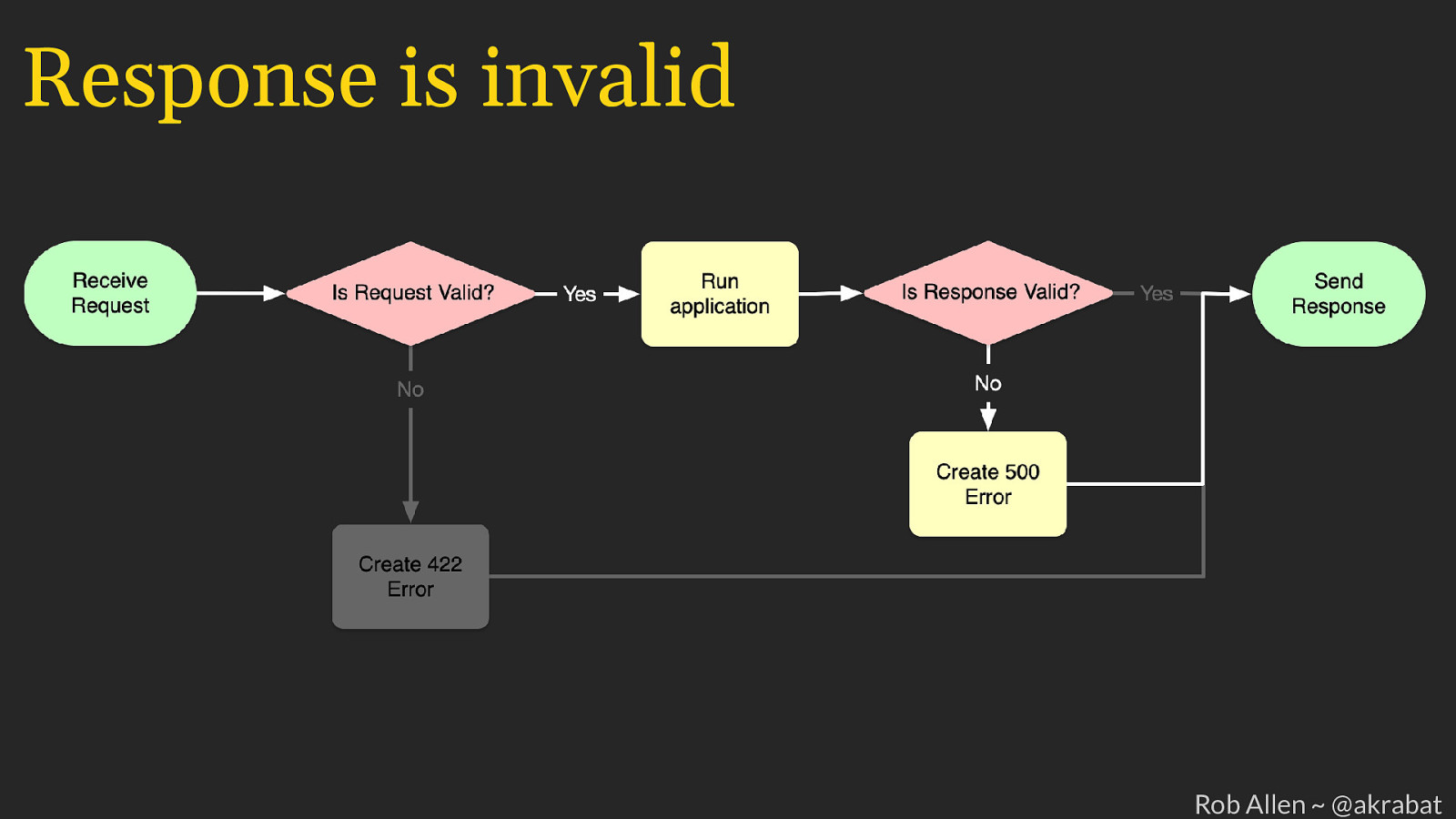
Response is invalid Rob Allen ~ @akrabat
Slide 70
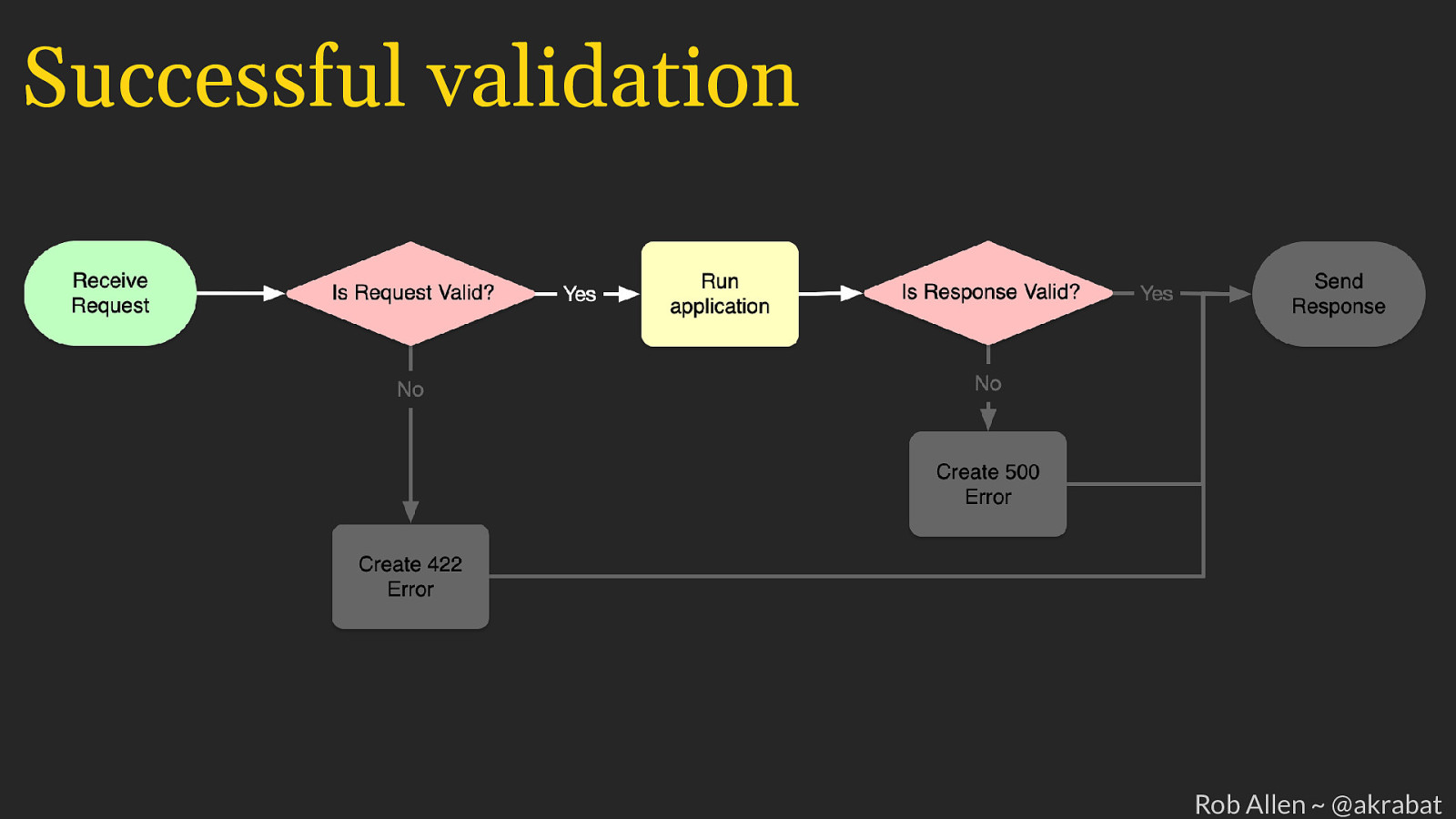
Successful validation Rob Allen ~ @akrabat
Slide 71
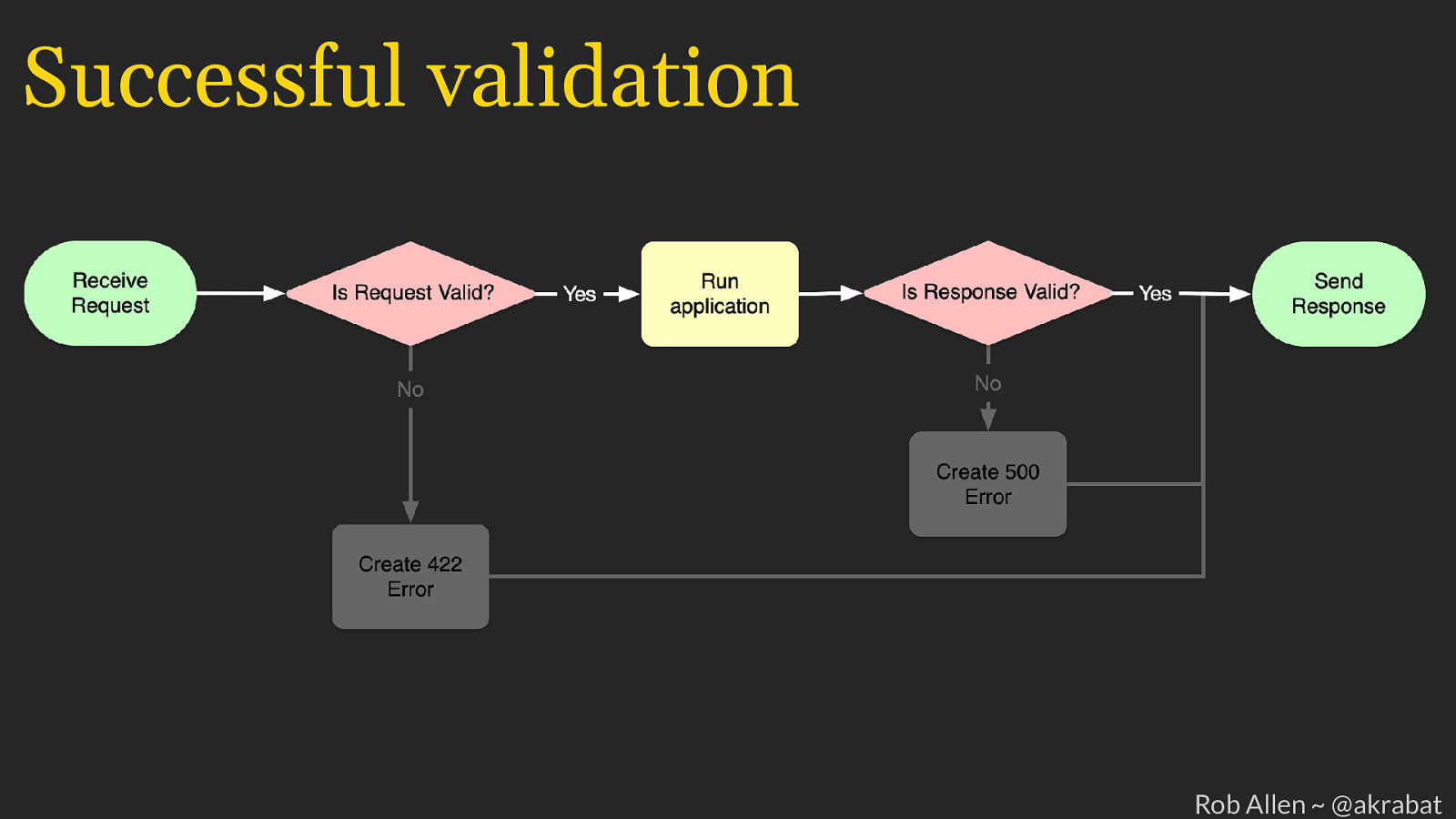
Successful validation Rob Allen ~ @akrabat
Slide 72
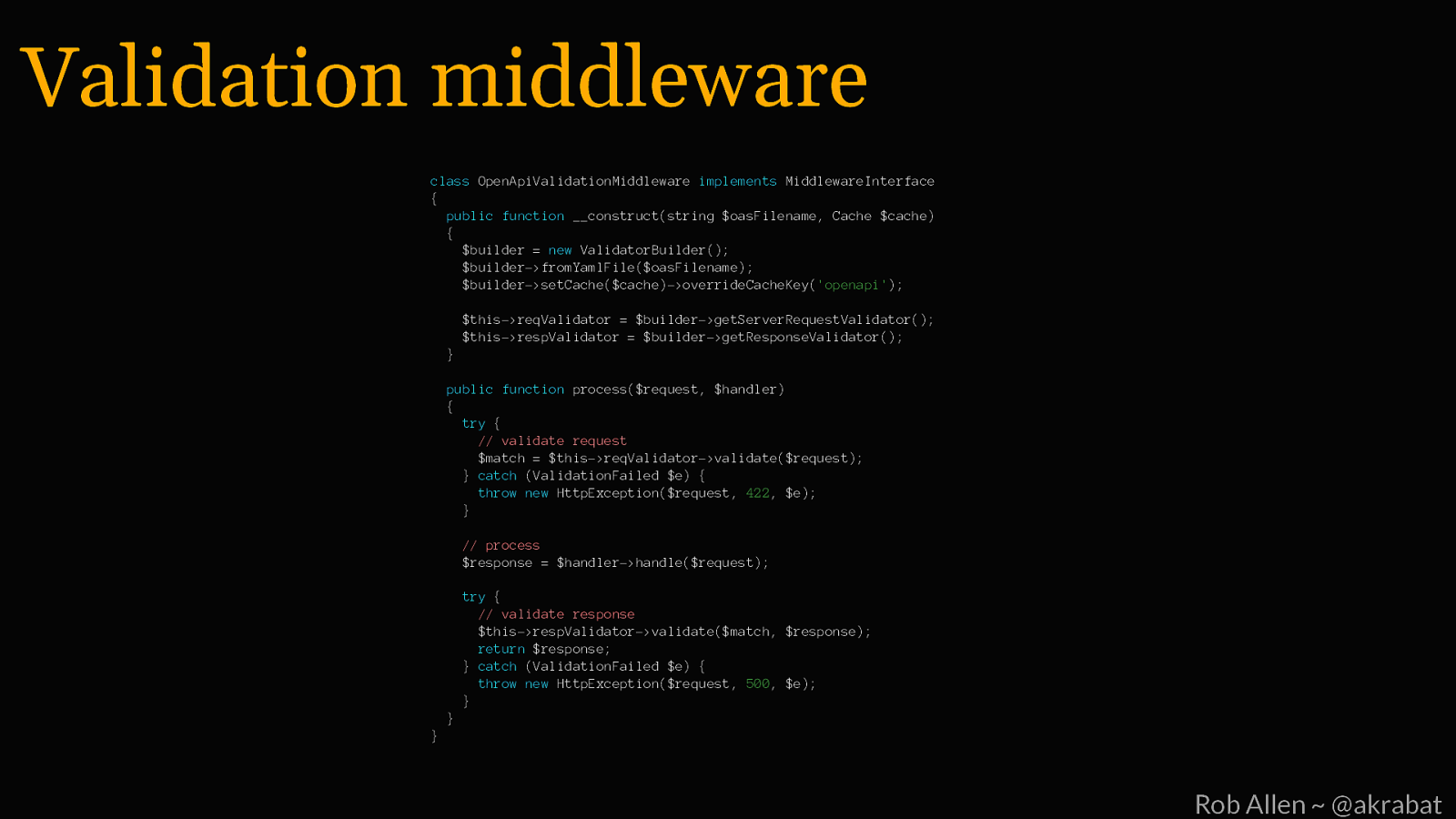
Validation middleware class OpenApiValidationMiddleware implements MiddlewareInterface { public function __construct(string $oasFilename, Cache $cache) { $builder = new ValidatorBuilder(); $builder->fromYamlFile($oasFilename); $builder->setCache($cache)->overrideCacheKey(‘openapi’); $this->reqValidator = $builder->getServerRequestValidator(); $this->respValidator = $builder->getResponseValidator(); } public function process($request, $handler) { try { // validate request $match = $this->reqValidator->validate($request); } catch (ValidationFailed $e) { throw new HttpException($request, 422, $e); } // process $response = $handler->handle($request); try { // validate response $this->respValidator->validate($match, $response); return $response; } catch (ValidationFailed $e) { throw new HttpException($request, 500, $e); } } } Rob Allen ~ @akrabat
Slide 73
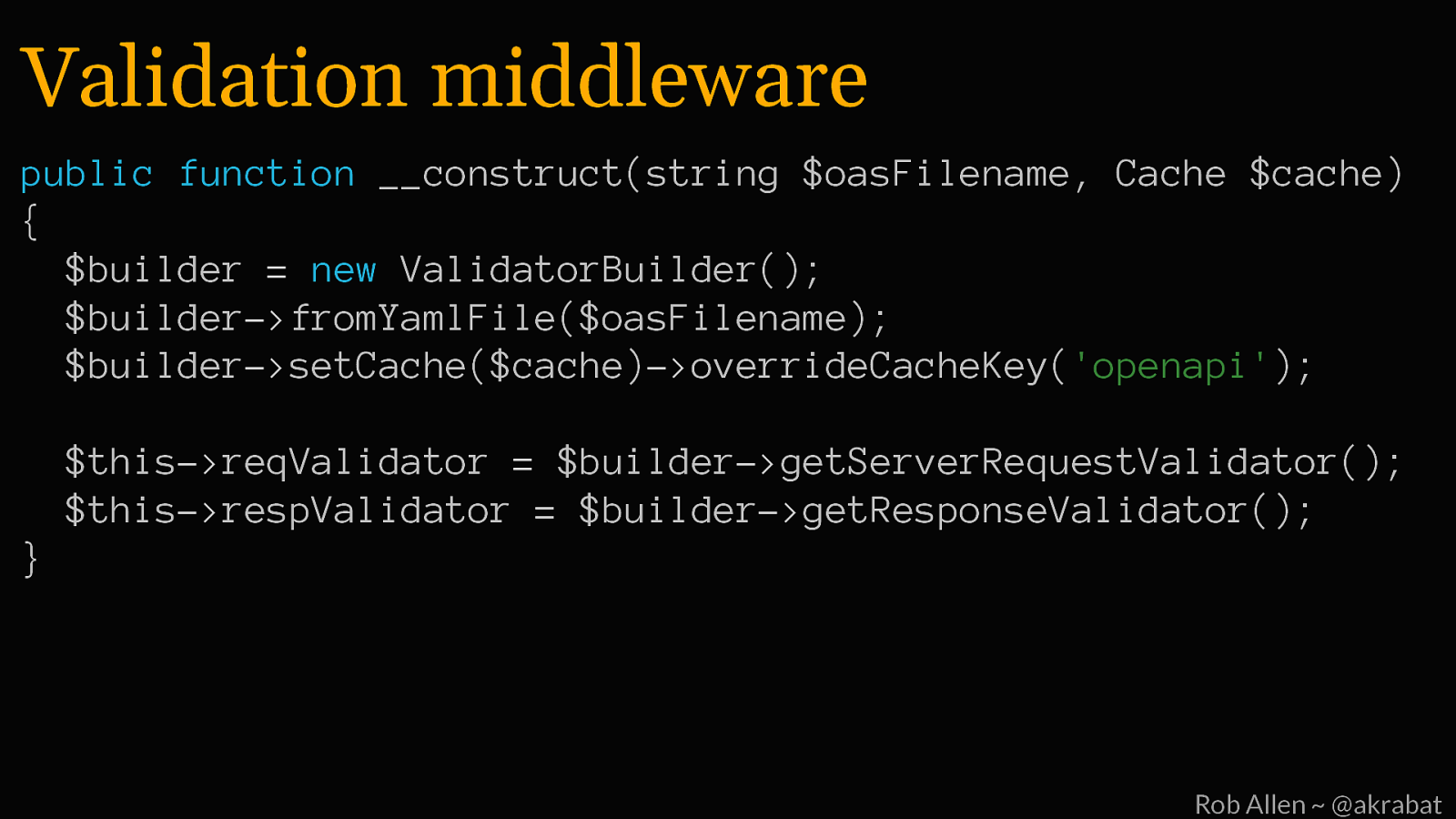
Validation middleware public function __construct(string $oasFilename, Cache $cache) { $builder = new ValidatorBuilder(); $builder->fromYamlFile($oasFilename); $builder->setCache($cache)->overrideCacheKey(‘openapi’); $this->reqValidator = $builder->getServerRequestValidator(); $this->respValidator = $builder->getResponseValidator(); } Rob Allen ~ @akrabat
Slide 74
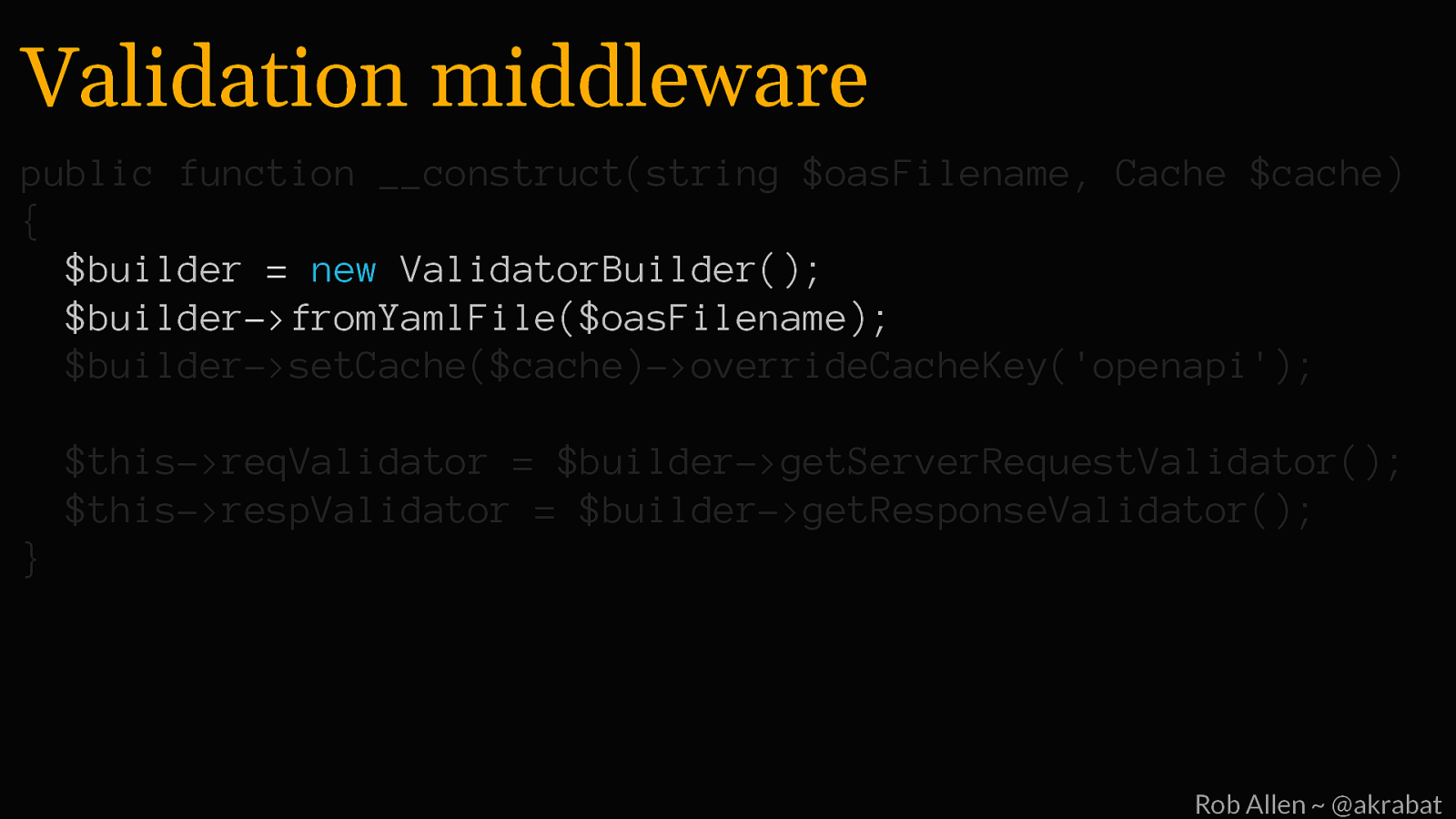
Validation middleware public function __construct(string $oasFilename, Cache $cache) { $builder = new ValidatorBuilder(); $builder->fromYamlFile($oasFilename); $builder->setCache($cache)->overrideCacheKey(‘openapi’); $this->reqValidator = $builder->getServerRequestValidator(); $this->respValidator = $builder->getResponseValidator(); } Rob Allen ~ @akrabat
Slide 75
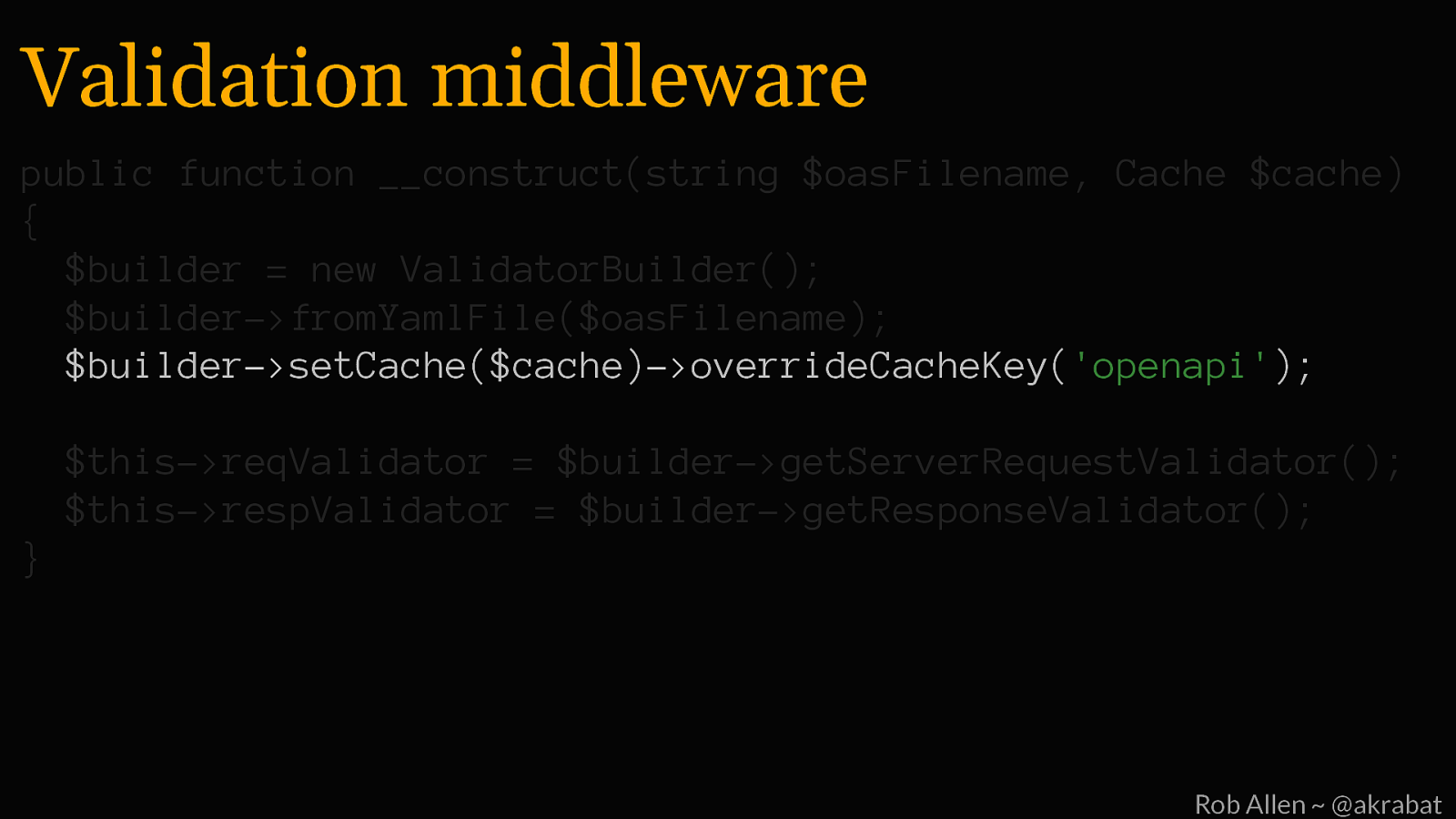
Validation middleware public function __construct(string $oasFilename, Cache $cache) { $builder = new ValidatorBuilder(); $builder->fromYamlFile($oasFilename); $builder->setCache($cache)->overrideCacheKey(‘openapi’); $this->reqValidator = $builder->getServerRequestValidator(); $this->respValidator = $builder->getResponseValidator(); } Rob Allen ~ @akrabat
Slide 76
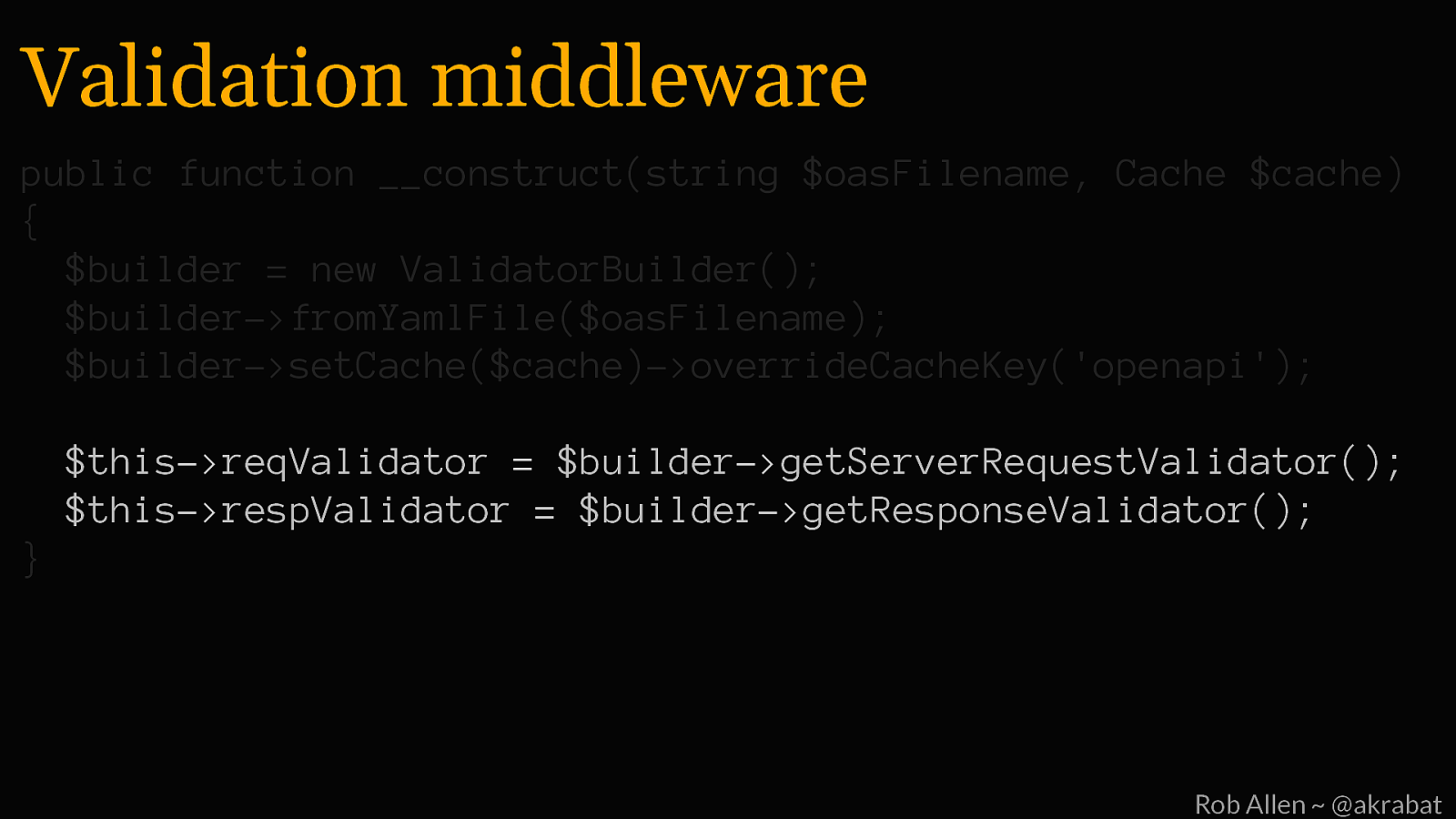
Validation middleware public function __construct(string $oasFilename, Cache $cache) { $builder = new ValidatorBuilder(); $builder->fromYamlFile($oasFilename); $builder->setCache($cache)->overrideCacheKey(‘openapi’); $this->reqValidator = $builder->getServerRequestValidator(); $this->respValidator = $builder->getResponseValidator(); } Rob Allen ~ @akrabat
Slide 77
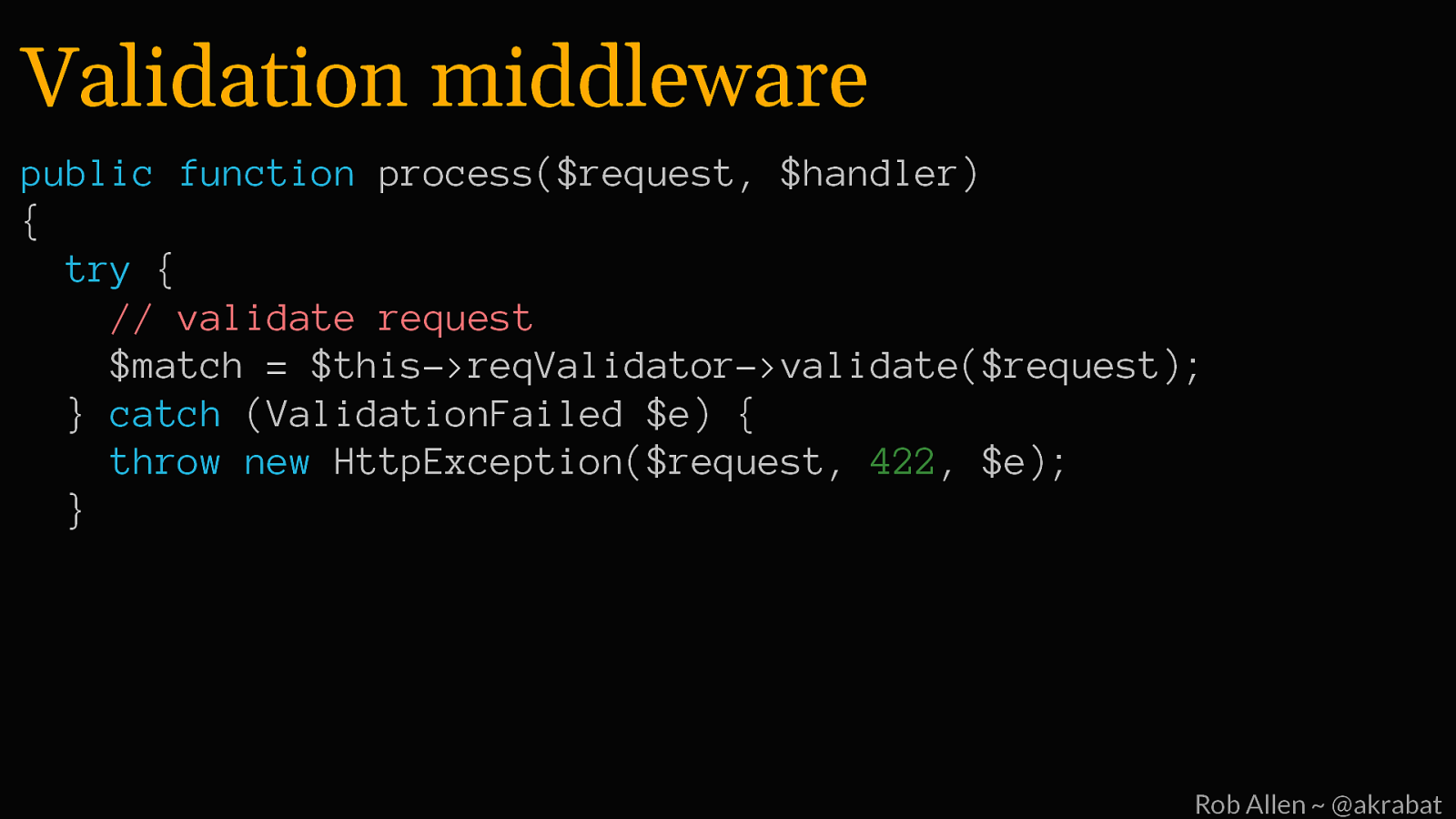
Validation middleware public function process($request, $handler) { try { // validate request $match = $this->reqValidator->validate($request); } catch (ValidationFailed $e) { throw new HttpException($request, 422, $e); } Rob Allen ~ @akrabat
Slide 78
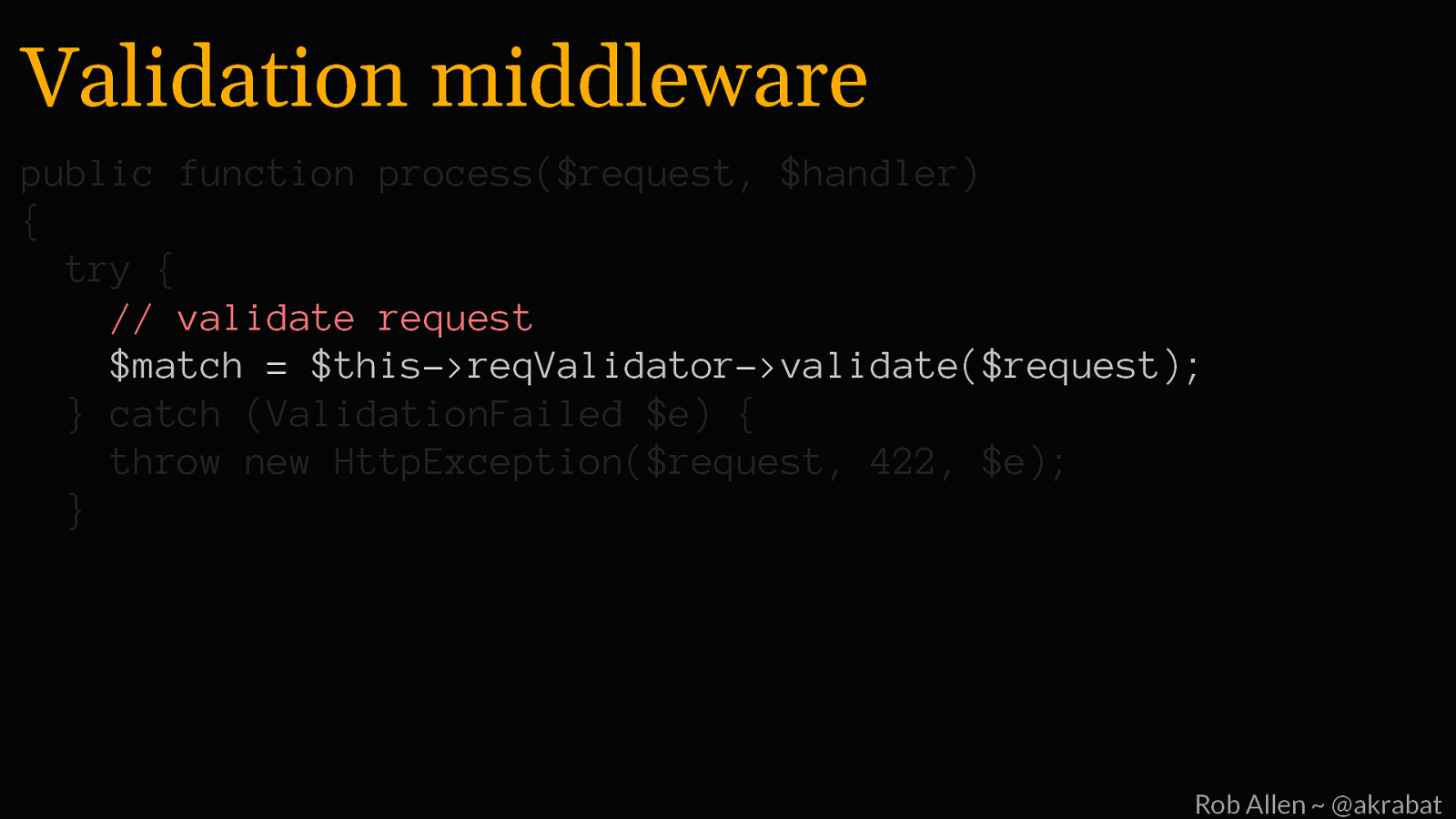
Validation middleware public function process($request, $handler) { try { // validate request $match = $this->reqValidator->validate($request); } catch (ValidationFailed $e) { throw new HttpException($request, 422, $e); } Rob Allen ~ @akrabat
Slide 79
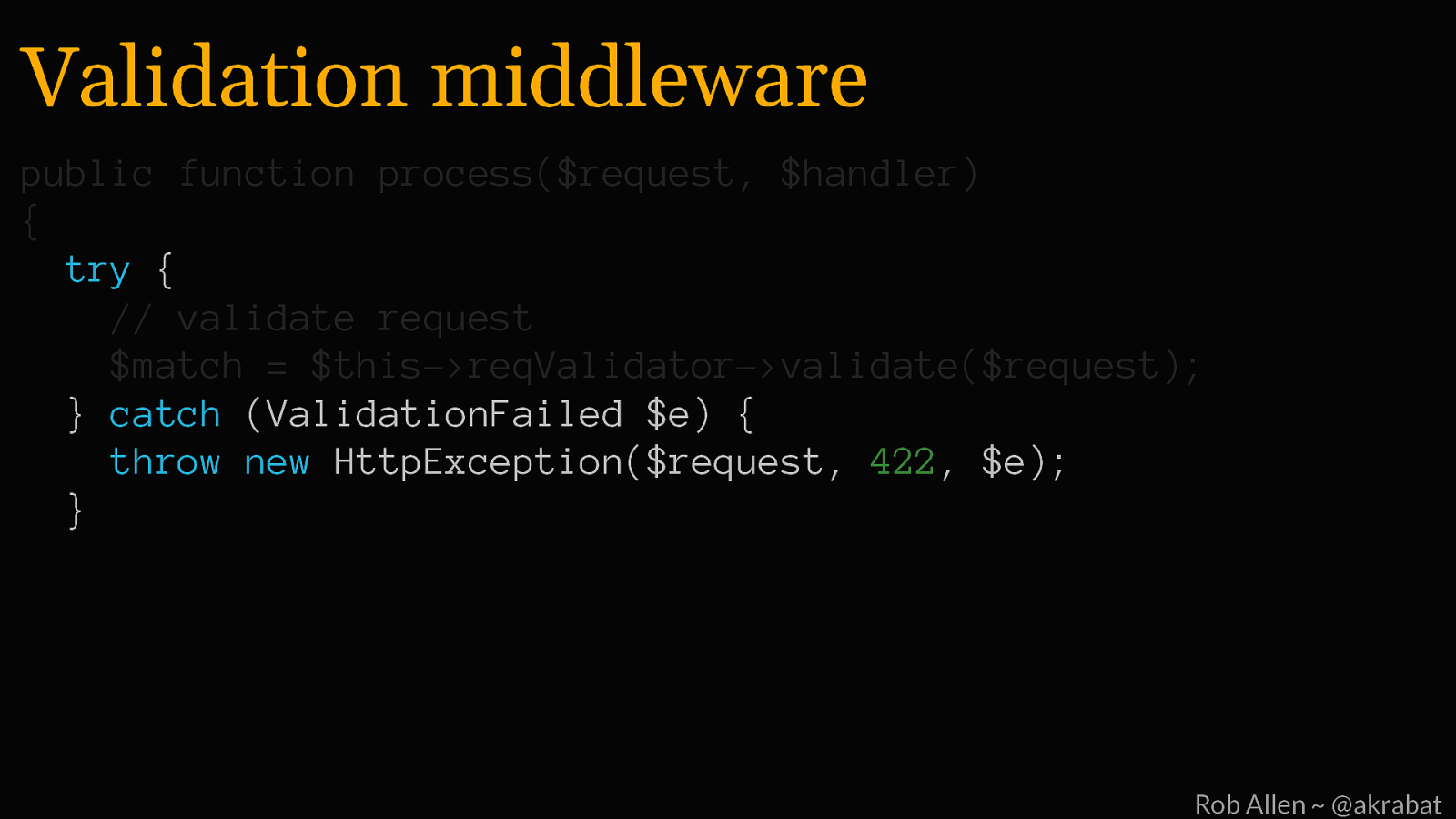
Validation middleware public function process($request, $handler) { try { // validate request $match = $this->reqValidator->validate($request); } catch (ValidationFailed $e) { throw new HttpException($request, 422, $e); } Rob Allen ~ @akrabat
Slide 80
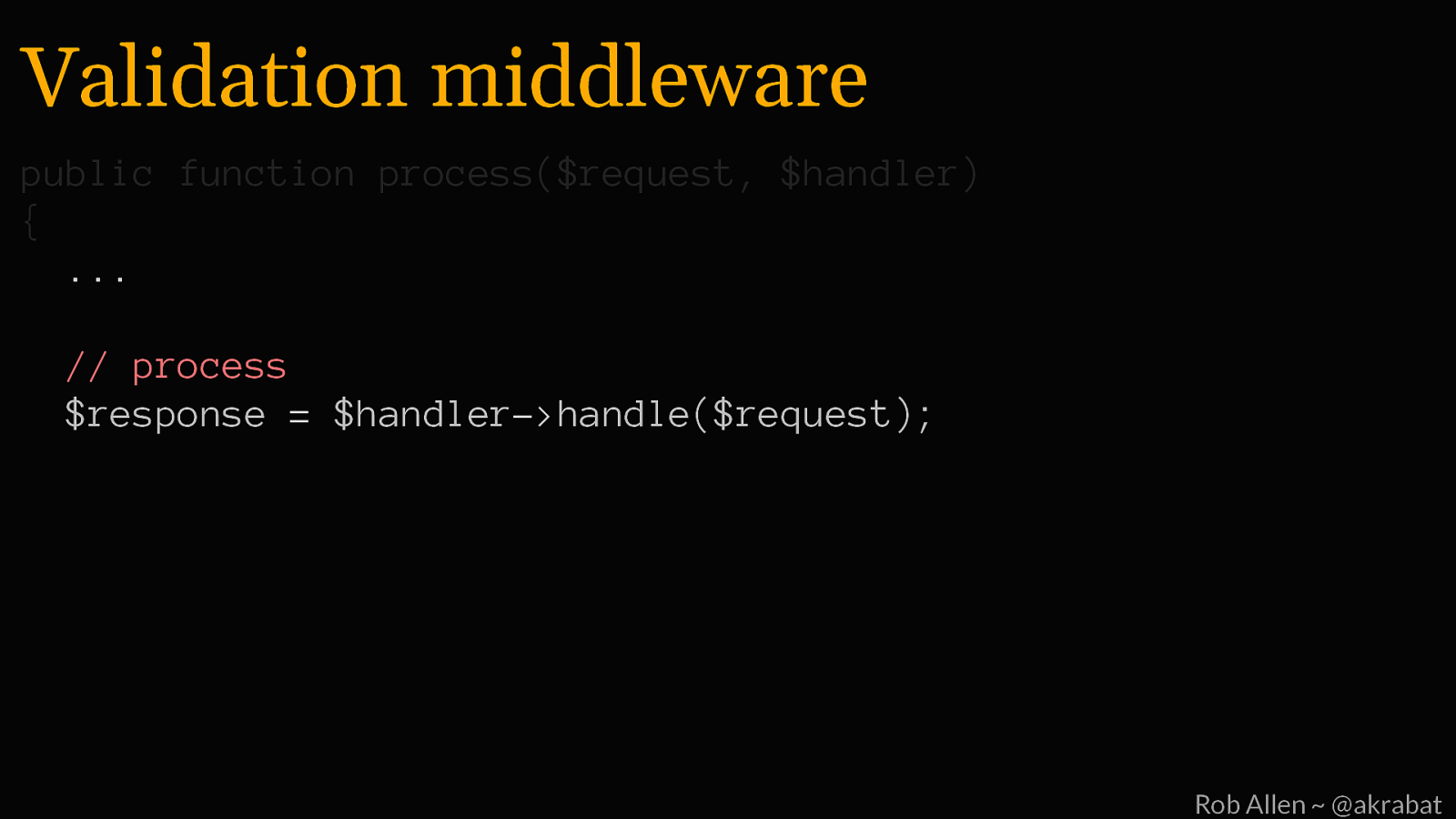
Validation middleware public function process($request, $handler) { … // process $response = $handler->handle($request); Rob Allen ~ @akrabat
Slide 81
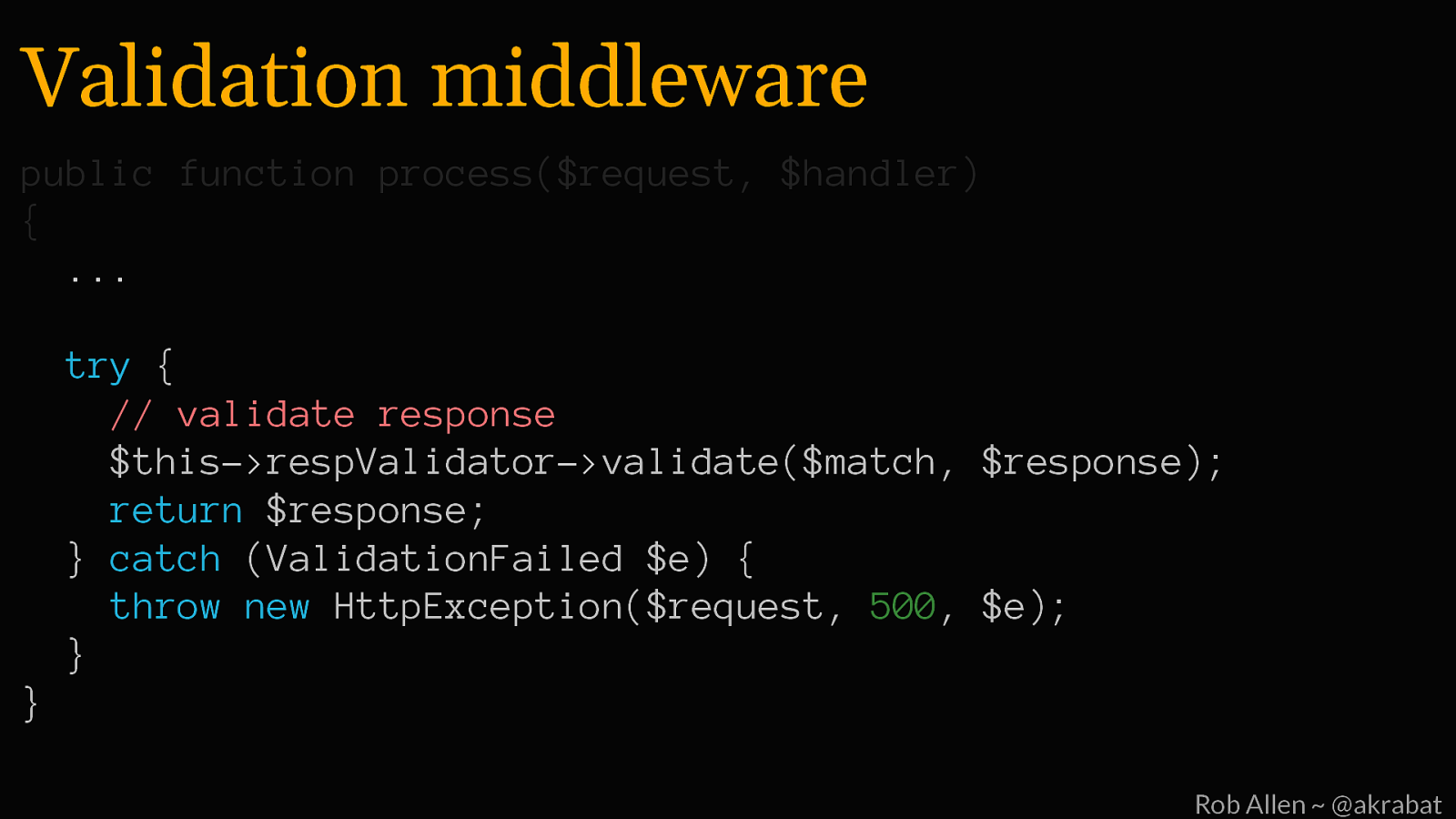
Validation middleware public function process($request, $handler) { … try { // validate response $this->respValidator->validate($match, $response); return $response; } catch (ValidationFailed $e) { throw new HttpException($request, 500, $e); } } Rob Allen ~ @akrabat
Slide 82
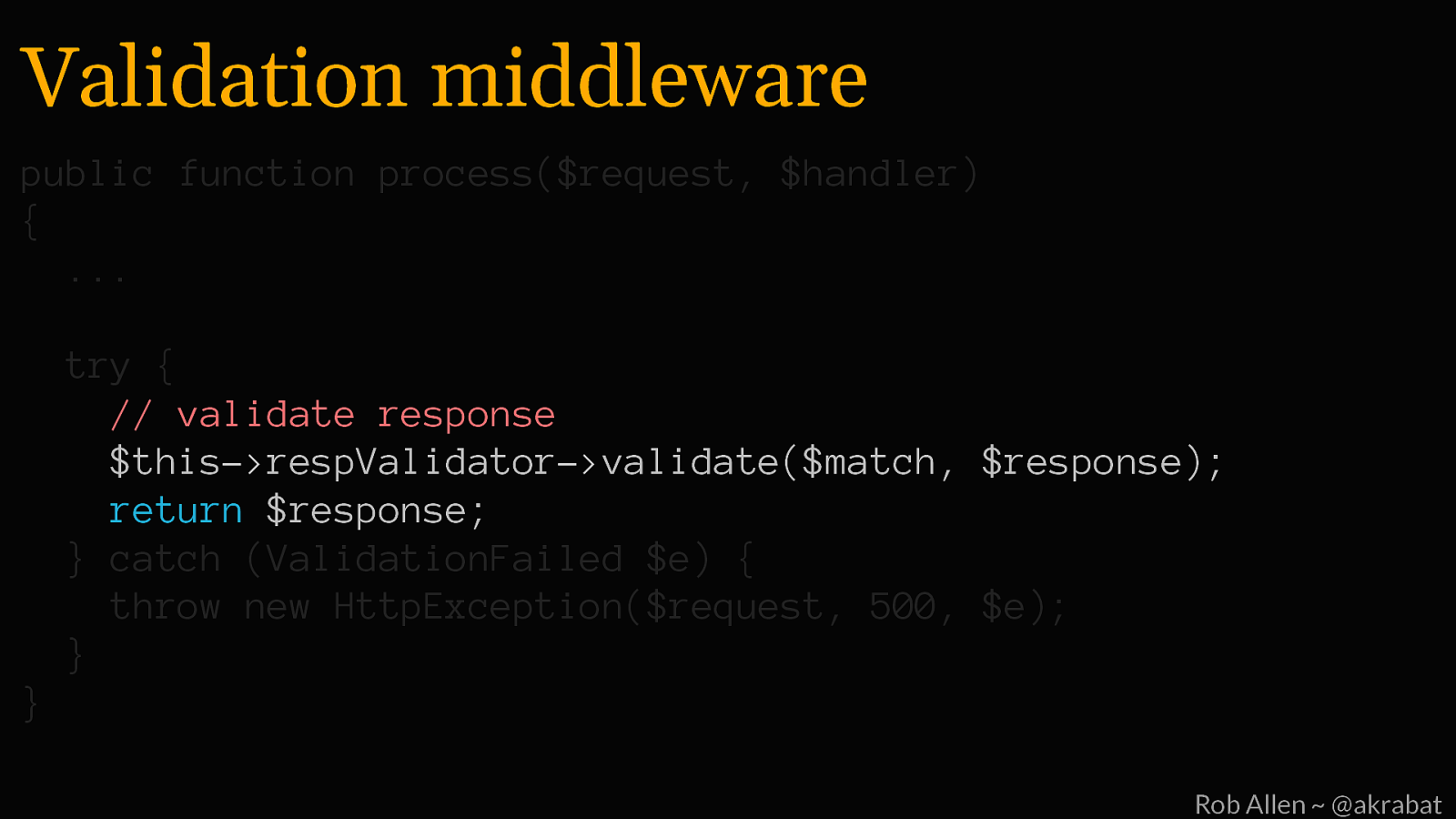
Validation middleware public function process($request, $handler) { … try { // validate response $this->respValidator->validate($match, $response); return $response; } catch (ValidationFailed $e) { throw new HttpException($request, 500, $e); } } Rob Allen ~ @akrabat
Slide 83
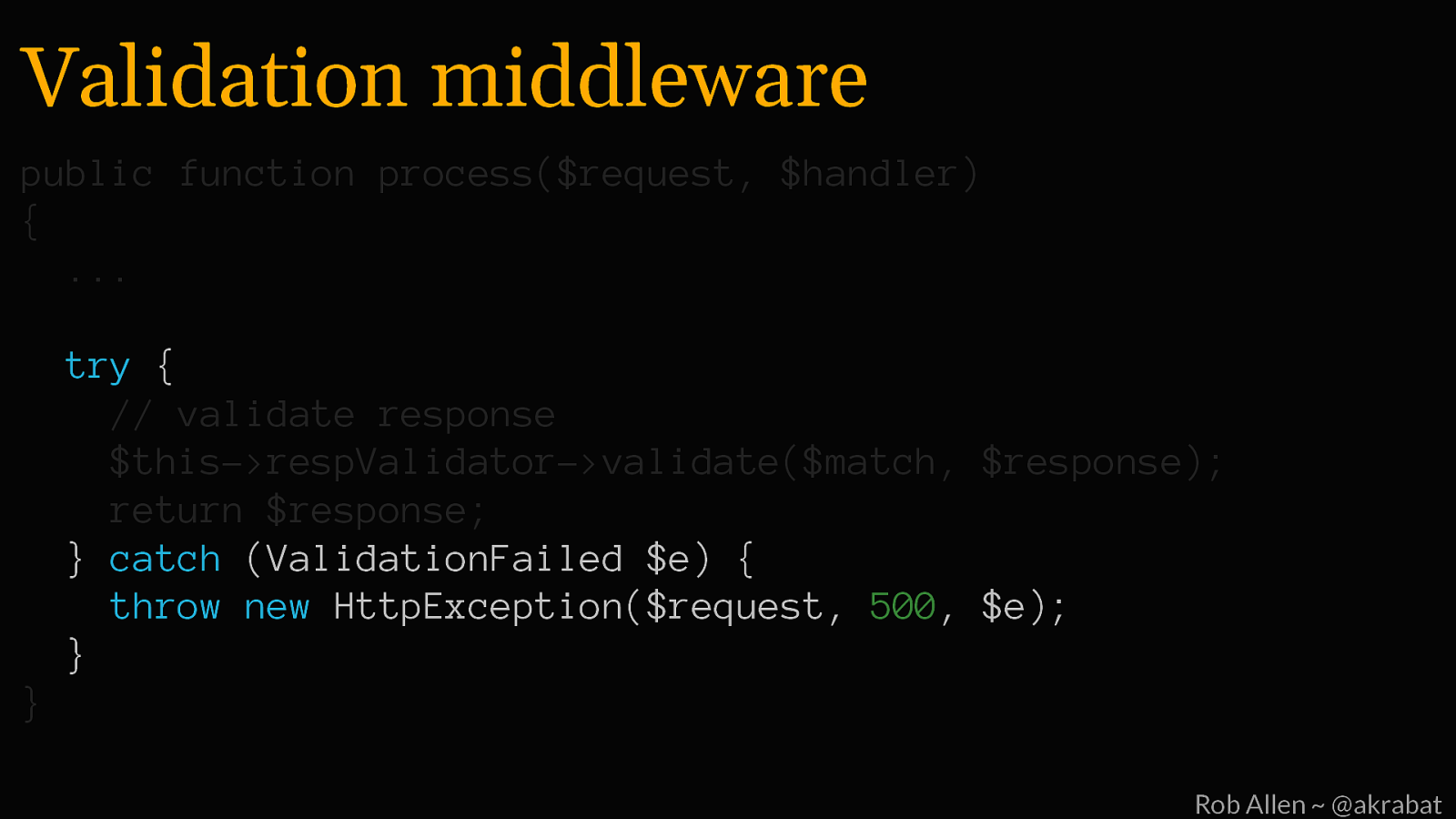
Validation middleware public function process($request, $handler) { … try { // validate response $this->respValidator->validate($match, $response); return $response; } catch (ValidationFailed $e) { throw new HttpException($request, 500, $e); } } Rob Allen ~ @akrabat
Slide 84
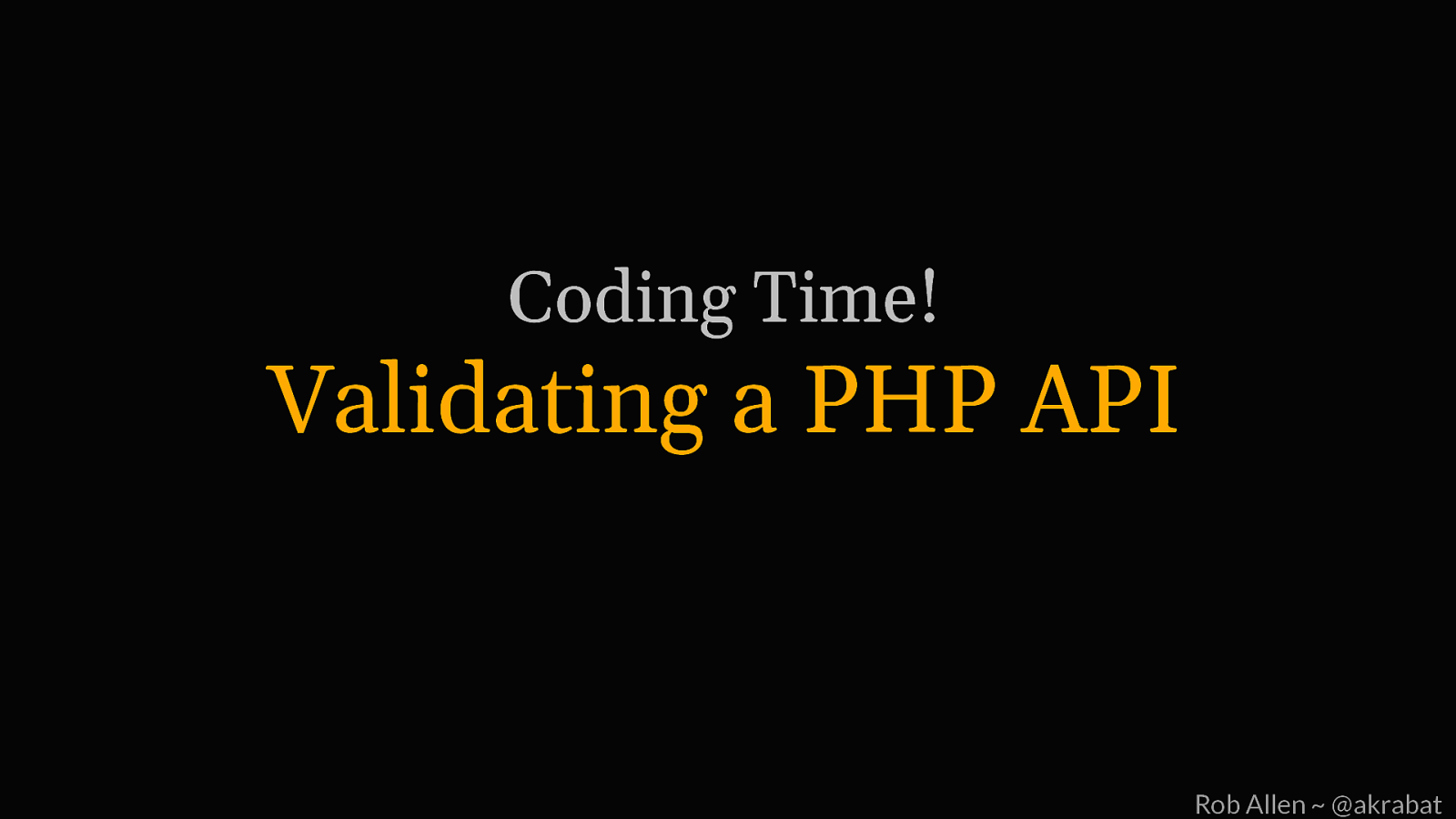
Coding Time! Validating a PHP API Rob Allen ~ @akrabat
Slide 85
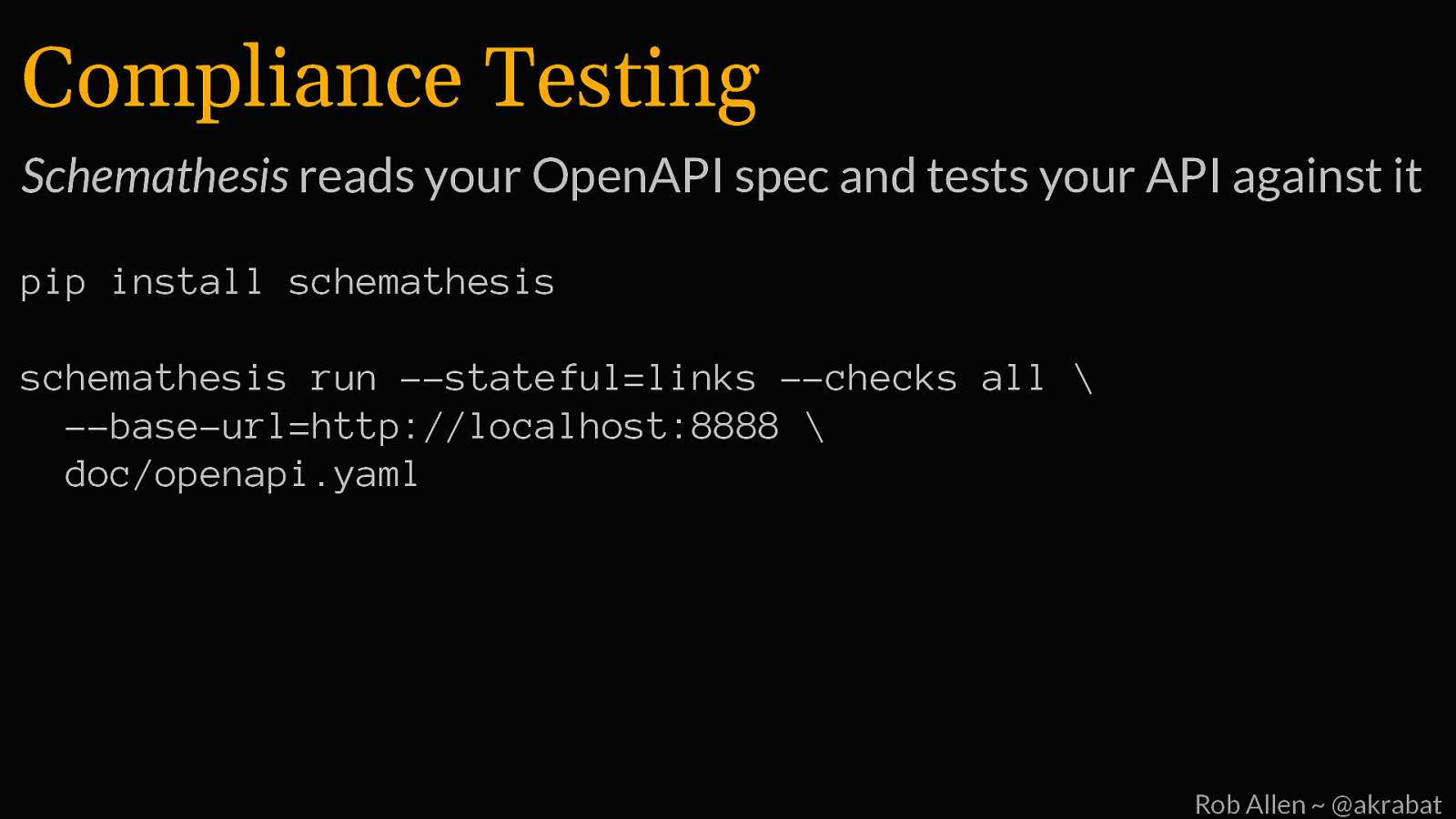
Compliance Testing Schemathesis reads your OpenAPI spec and tests your API against it pip install schemathesis schemathesis run —stateful=links —checks all \ —base-url=http://localhost:8888 \ doc/openapi.yaml Rob Allen ~ @akrabat
Slide 86
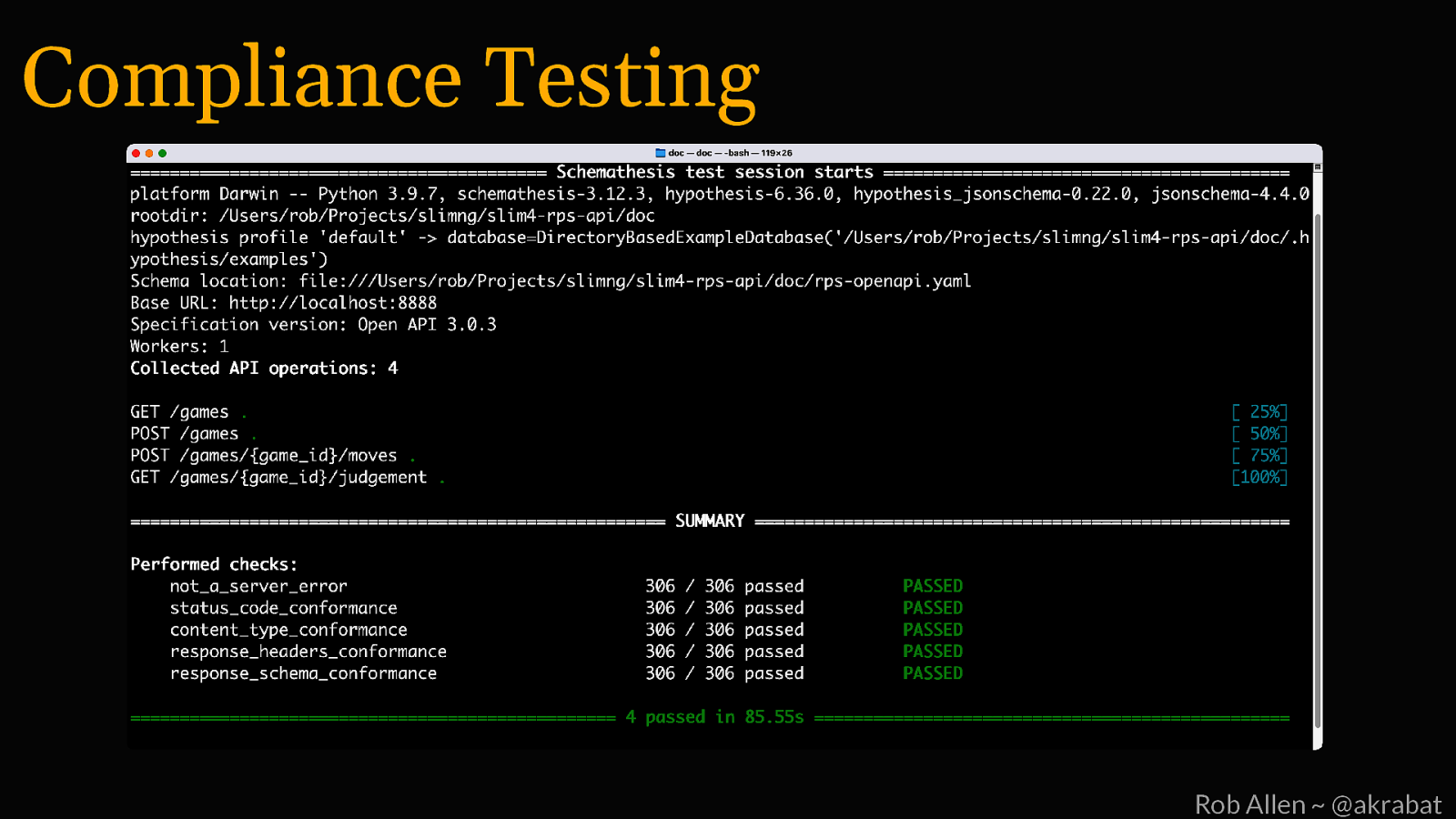
Compliance Testing Rob Allen ~ @akrabat
Slide 87
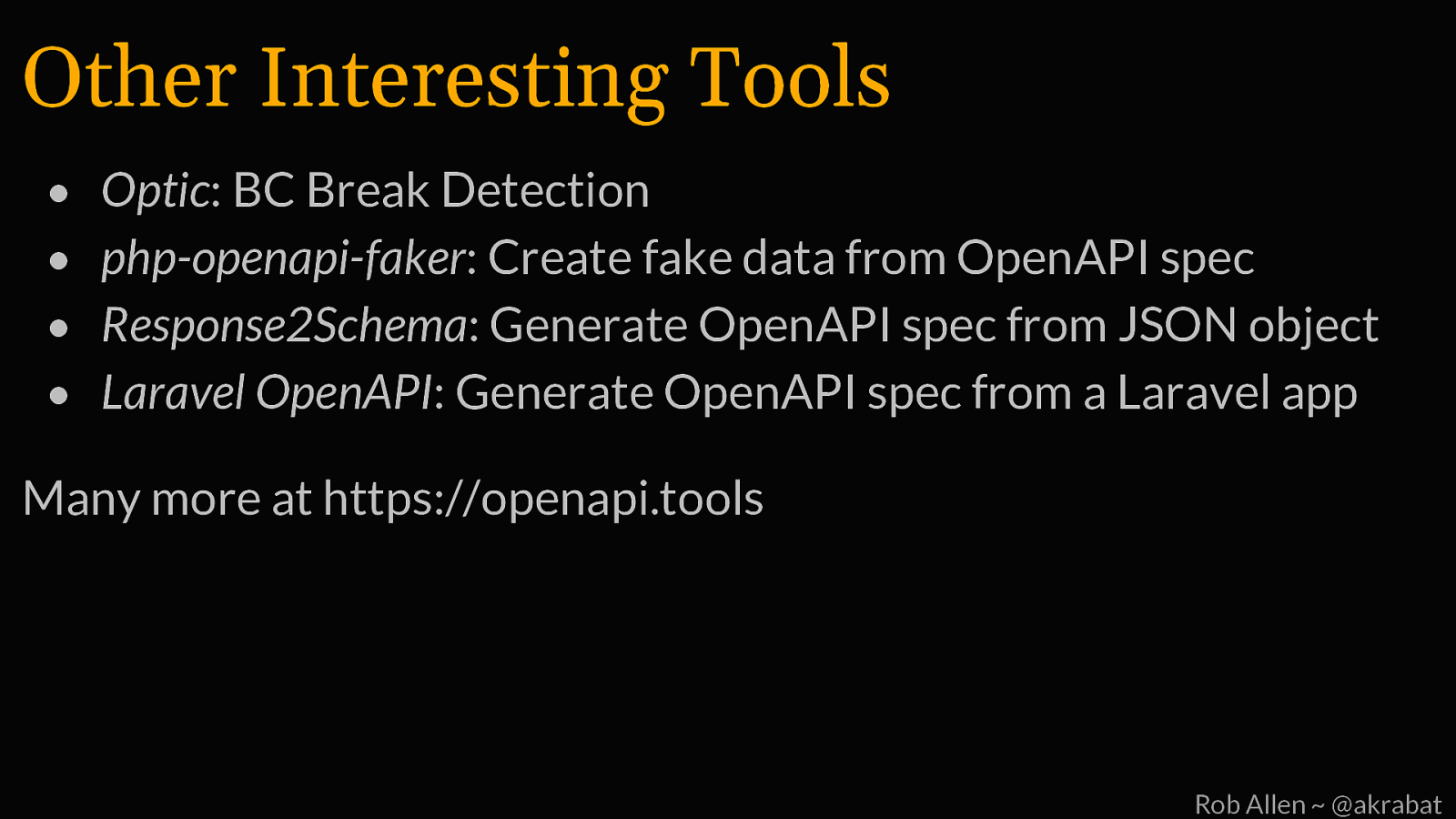
Other Interesting Tools • • • • Optic: BC Break Detection php-openapi-faker: Create fake data from OpenAPI spec Response2Schema: Generate OpenAPI spec from JSON object Laravel OpenAPI: Generate OpenAPI spec from a Laravel app Many more at https://openapi.tools Rob Allen ~ @akrabat
Slide 88

To sum up Rob Allen ~ @akrabat
Slide 89
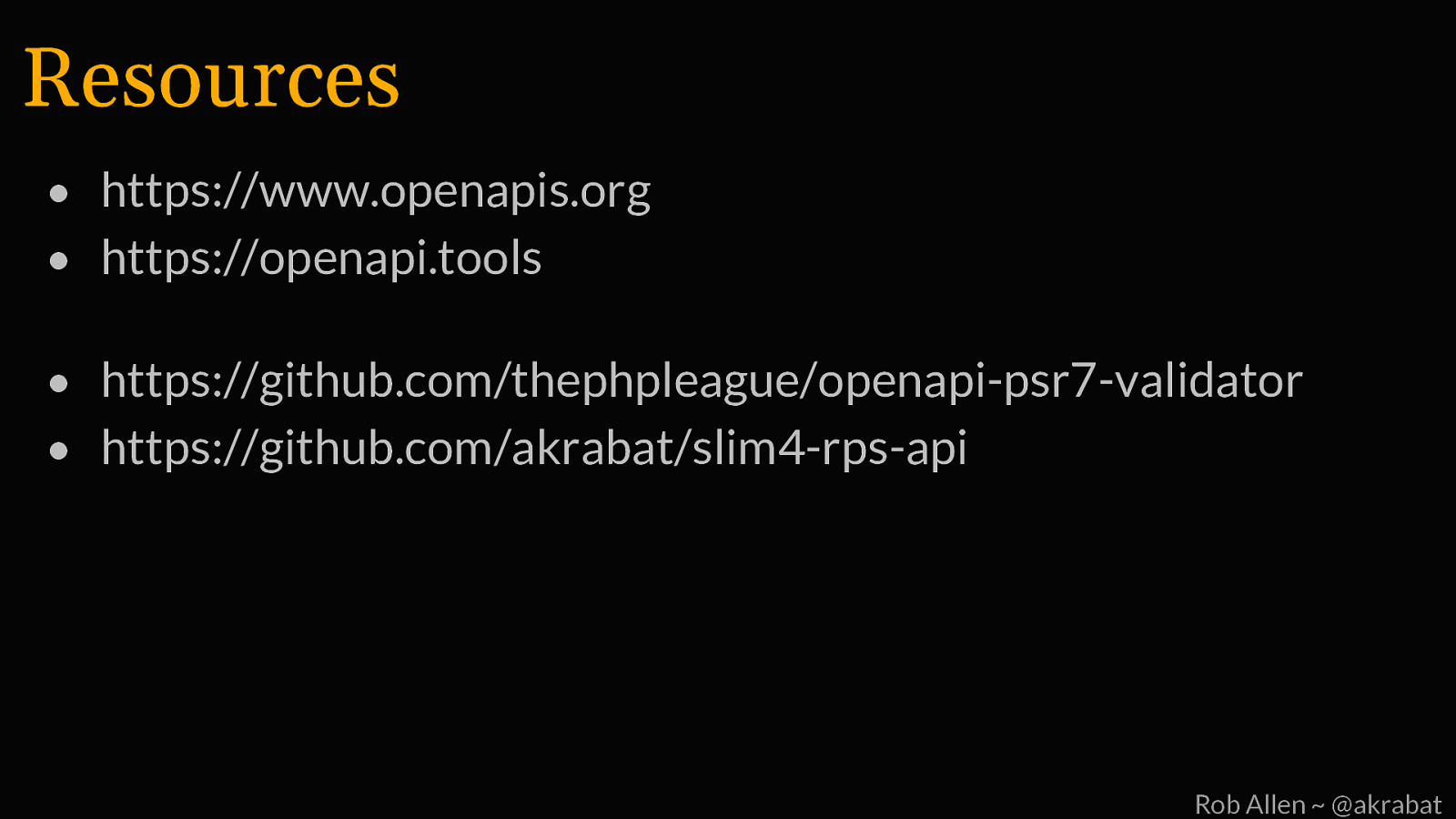
Resources • https://www.openapis.org • https://openapi.tools • https://github.com/thephpleague/openapi-psr7-validator • https://github.com/akrabat/slim4-rps-api Rob Allen ~ @akrabat
Slide 90
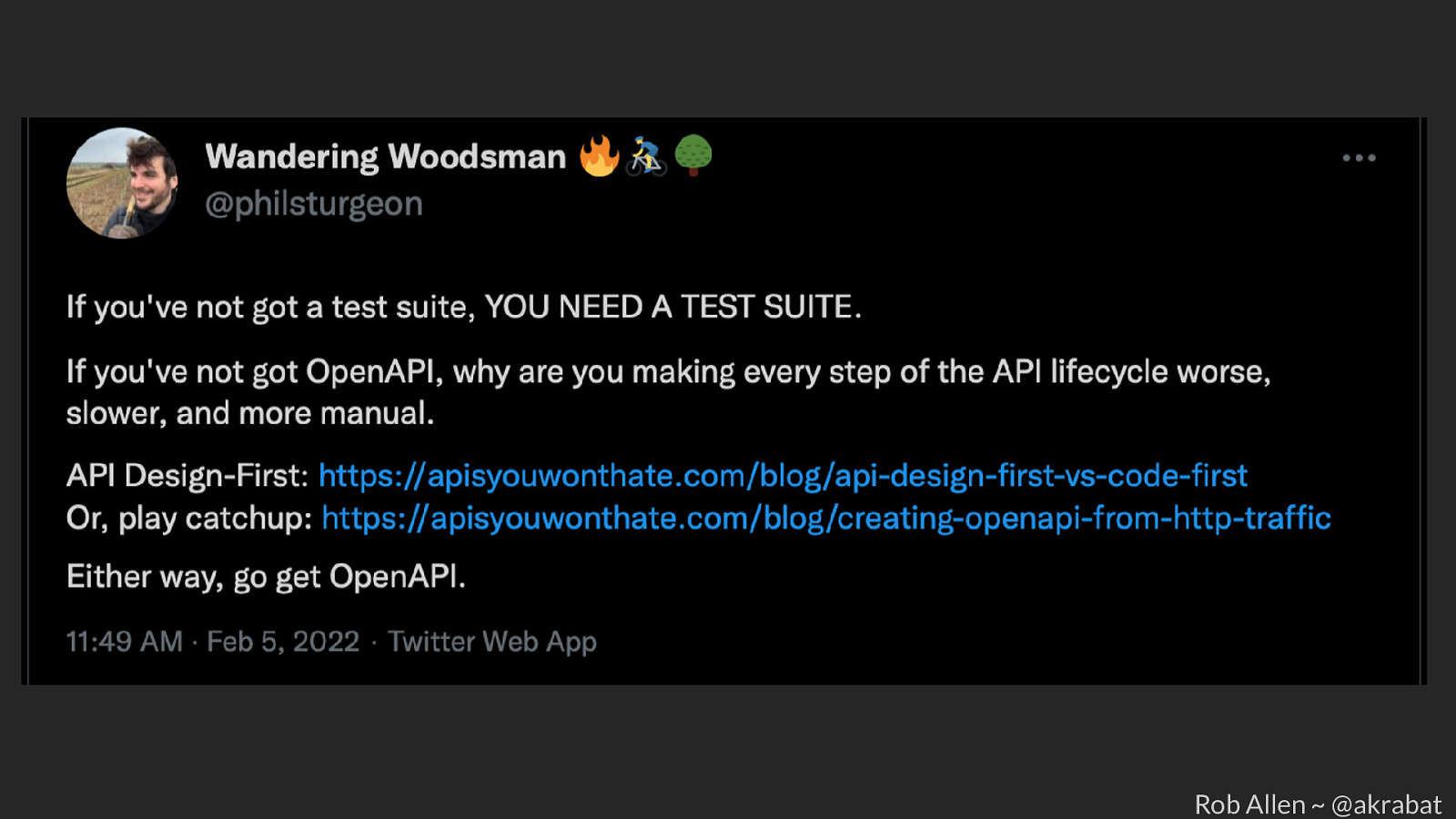
Rob Allen ~ @akrabat
Slide 91

Thank you! Rob Allen ~ @akrabat
Slide 92
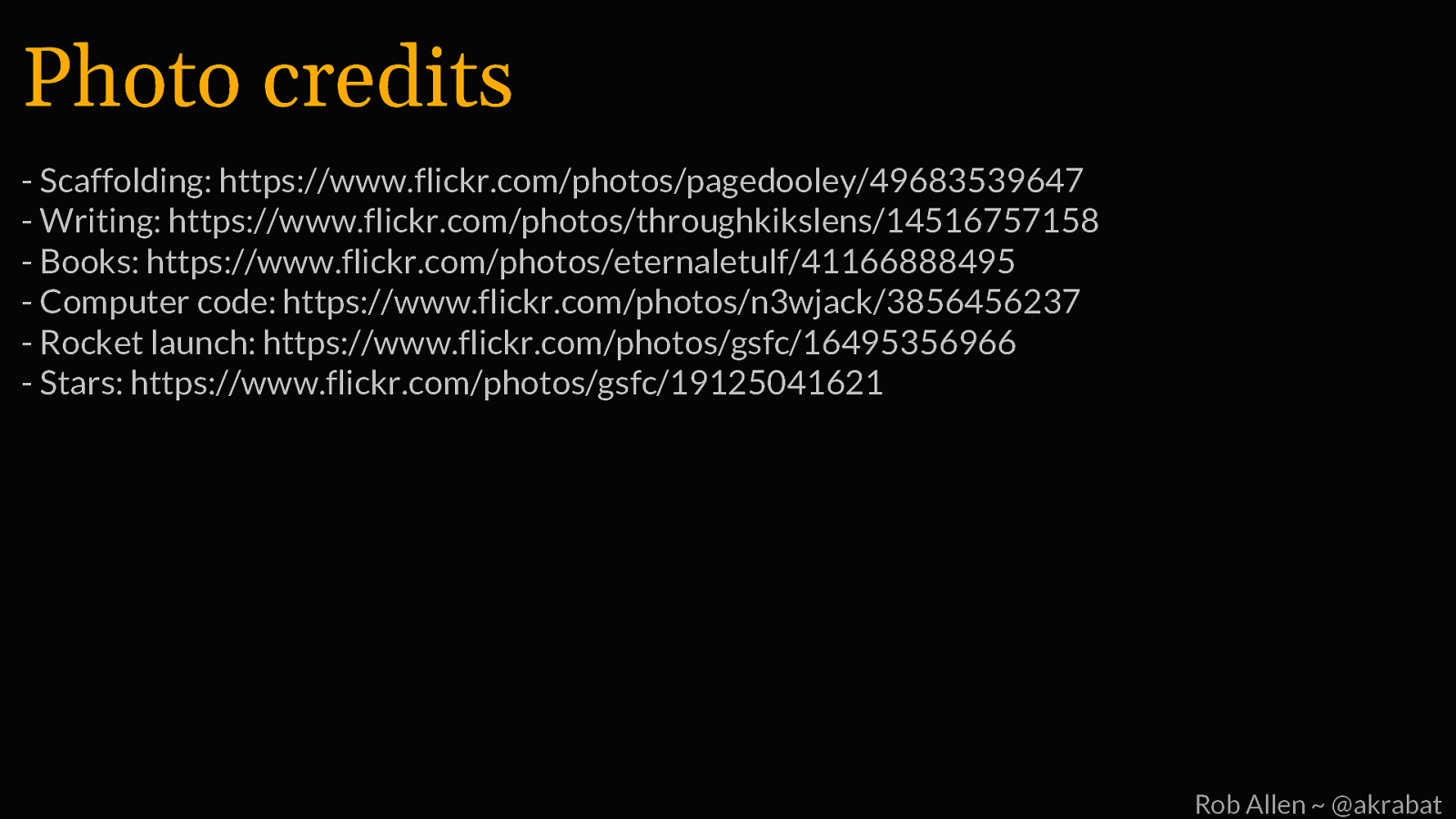
Photo credits - Scaffolding: https://www.flickr.com/photos/pagedooley/49683539647 - Writing: https://www.flickr.com/photos/throughkikslens/14516757158 - Books: https://www.flickr.com/photos/eternaletulf/41166888495 - Computer code: https://www.flickr.com/photos/n3wjack/3856456237 - Rocket launch: https://www.flickr.com/photos/gsfc/16495356966 - Stars: https://www.flickr.com/photos/gsfc/19125041621 Rob Allen ~ @akrabat